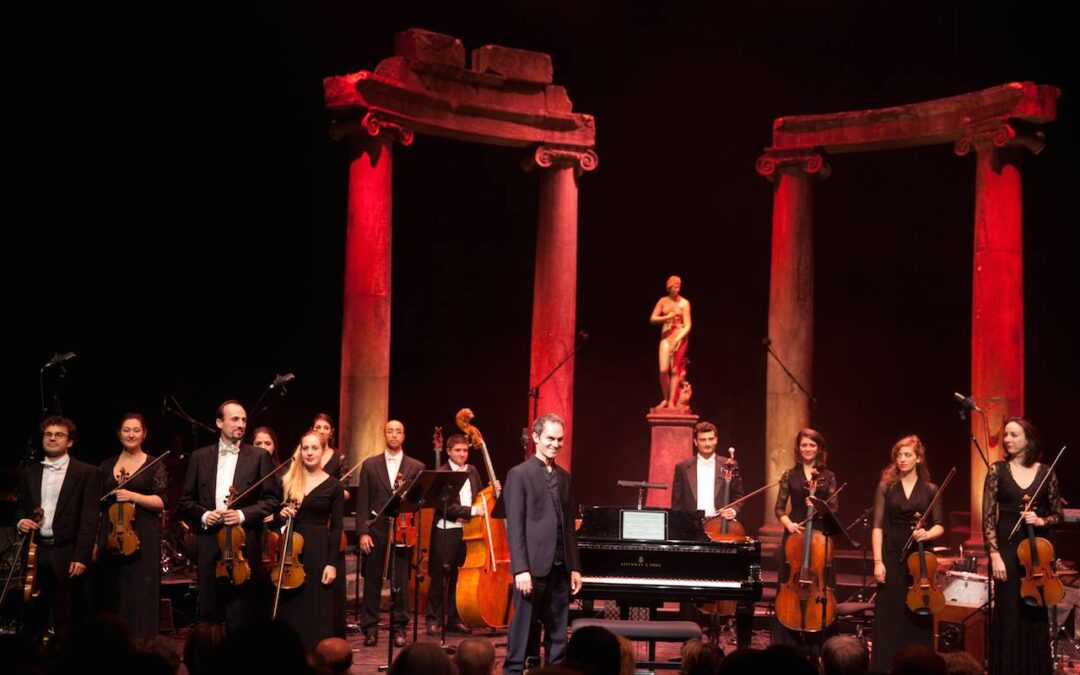
Dec 28, 2016 | Focolare Worldwide, Senza categoria
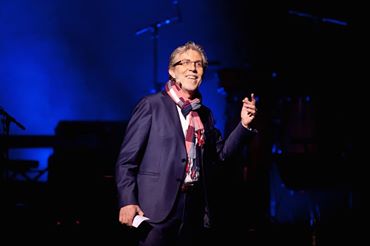
Rocco Femia, Director of the Radici cultural magazine
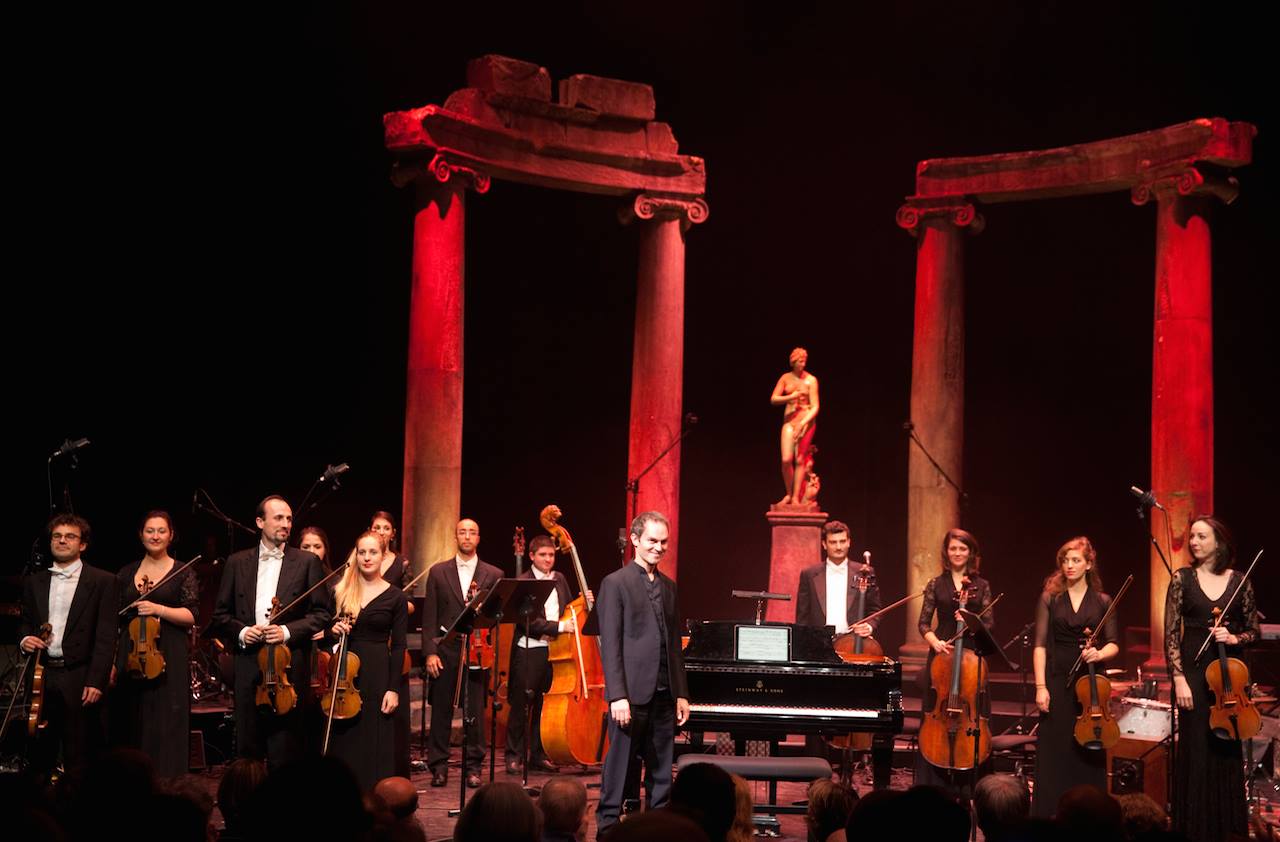 Fifty artists performed for free, confirming the strong sympathy is being felt for those who have suffered great loss. Artists included the OCCITANIA Chamber Music Ensemble, with music of Bach; the popular Italian song group, Incanto, which travels around the world with its musical titled ITALIANI, when we were the immigrants; The DALTIN Trio; Vicente and Rafael PRADAL from Spain; flemenco virtuoso guitarist Kiko Ruiz; the NACCARATO Jazz Trio; mandolin player Julien Martineau; the musical poems of the great Faber, performed by the Fabrizio DE ANDRÈ Band; the unforgettable music from the Italian films and the great finale and standing ovation for Cécile LIMAL who led La vita è bella… by Roberto Benigni. The music alternated with lively presentations by Rocco Femia, Director of RADICI magazine and by television journalists Marina Lorenzo and Patrick Noviello. In his thank-you speech, the director of RADICI did not want to forget anyone, conscious of the deep personal commitment of each person to the success of the event: from the technical crew to the artistic director, to the sound director, to the lights. Then there were the Deputy Mayor Francis Grass, the Italian Console to Toulouse, Fabrizio Mazza, the sponsors, benefactors, the media, and so on. Everyone “won the battle” together. And that is what I experienced as I shared a supper with the artists and technical staff after the concert. There is a strong bond among us, comprised of mutual trust, esteem, shared talent and solidarity – and a strong desire to make the world a more beautiful place. And I joyfully realized that this bond also included me and UWP. So, I wouldn’t be surprised if I discover that what I just experienced is only the beginning of a long and beneficial relationship of collaboration. In fact, when presenting the United World Project (UWP) during the concert, Rocco Femia highlighted the slogan of the RImPresa Project, to sum up what everyone seemed to be feeling: Hope vibrates; the future isn’t trembling.” Gustavo Clariá
Fifty artists performed for free, confirming the strong sympathy is being felt for those who have suffered great loss. Artists included the OCCITANIA Chamber Music Ensemble, with music of Bach; the popular Italian song group, Incanto, which travels around the world with its musical titled ITALIANI, when we were the immigrants; The DALTIN Trio; Vicente and Rafael PRADAL from Spain; flemenco virtuoso guitarist Kiko Ruiz; the NACCARATO Jazz Trio; mandolin player Julien Martineau; the musical poems of the great Faber, performed by the Fabrizio DE ANDRÈ Band; the unforgettable music from the Italian films and the great finale and standing ovation for Cécile LIMAL who led La vita è bella… by Roberto Benigni. The music alternated with lively presentations by Rocco Femia, Director of RADICI magazine and by television journalists Marina Lorenzo and Patrick Noviello. In his thank-you speech, the director of RADICI did not want to forget anyone, conscious of the deep personal commitment of each person to the success of the event: from the technical crew to the artistic director, to the sound director, to the lights. Then there were the Deputy Mayor Francis Grass, the Italian Console to Toulouse, Fabrizio Mazza, the sponsors, benefactors, the media, and so on. Everyone “won the battle” together. And that is what I experienced as I shared a supper with the artists and technical staff after the concert. There is a strong bond among us, comprised of mutual trust, esteem, shared talent and solidarity – and a strong desire to make the world a more beautiful place. And I joyfully realized that this bond also included me and UWP. So, I wouldn’t be surprised if I discover that what I just experienced is only the beginning of a long and beneficial relationship of collaboration. In fact, when presenting the United World Project (UWP) during the concert, Rocco Femia highlighted the slogan of the RImPresa Project, to sum up what everyone seemed to be feeling: Hope vibrates; the future isn’t trembling.” Gustavo Clariá
Dec 28, 2016 | Non categorizzato, Word of
A group of primary school children in Rome tried to put this Word of Life into practice: “Yesterday evening my mother and I went out for a meal with one of my Mum’s friends. I ordered a side dish with the meal, and then I wanted something for dessert. My mother said no. I was about to be angry, but I remembered that Jesus was in my mother so I just smiled instead.” “I went home after a tiring day. While I was watching television my brother took the remote control from me. I was very angry with him, but then I calmed down and let him watch TV.” “Today I answered back angrily when my father spoke to me. I saw that he was not happy about this, so I said sorry, and he forgave me.” Although there may not have been an exact link between the experiences these children told and the Word of Life they were living at the time, the push to love is itself the fruit of the Gospel put into practice. Any Word of Life we set out to live has the same effect. It changes our lives and puts the desire to be attentive to other people’s needs into our hearts, enabling us to be at the service of our brothers and sisters. It could not be otherwise: welcoming the Word and living it gives life to Jesus in us and helps us to act like him. This is what Paul is saying in this letter to the Corinthians. What urged St Paul to announce the Gospel and dedicate himself to the unity of his communities was the deep experience he had had with Jesus. He had felt loved and saved by Jesus, who had entered into his life to the point that nothing and no one could separate him from Jesus again. It was no longer he who lived, because Jesus lived in him. The thought that the Lord had loved him to the point of giving his life astounded Paul and stirred him into action. Its irresistible power urged him to do the same thing with the same love. Does the love of Christ urge us on with the same zeal? If we have truly experienced his love, we cannot fail to love in turn and courageously enter places where there is division, conflict and hatred so as to bring agreement, peace and unity. Love enables us to bring love beyond all obstacles, so as to create real connections with people, through understanding and sharing, and to find solutions together. It is not a question of choosing this or not. Unity must be pursued at all costs, without letting ourselves be hindered by false prudence, by difficulties or by potential clashes. Such an approach is urgently needed above all in ecumenism. This Word of Life has been chosen for this month in which we celebrate the Week of Prayer for Christian Unity. It can be lived together by Christians from different churches and communities so that we will all feel urged on by the love of Christ to seek each other out so as to re- establish unity. When Chiara Lubich spoke at the opening of the Second Ecumenical European Assembly at Graz, Austria on June 23, 1997, she affirmed, “An authentic Christian who wants reconciliation is someone who knows how to love others with God’s own charity, which makes us see Christ in each person, a charity that goes out towards all people (Jesus died for the whole human race). This charity always takes the initiative and enables us to love each person as ourselves, making us one with our brothers and sisters: in sufferings, joys, etc. The Churches too should love with this love.” May we too live the radicality of love with the simplicity and seriousness of those schoolchildren in Rome.
Fr. Fabio Ciardi, OMI
Each month the Focolare offers a Scripture passage as a guide and inspiration for daily living. Ever since the Focolare’s earliest years, founder Chiara Lubich (1920– 2008) wrote her own commentaries each month. Now Fr. Fabio Ciardi, OMI, theologian and close collaborator of Lubich, heads a group of scripture experts who have been entrusted with the task of writing the Word of Life commentaries, reflecting her thoughts and her spirituality of unity. This Word of Life is translated into 96 different languages and reaches several million people worldwide through the media. This monthly leaflet is also a supplement to Living City, the Focolare magazine (livingcitymagazine.com). For information and to subscribe to this leaflet or to the magazine, write to: Living City, 202 Comforter Blvd, Hyde Park, NY 12538; tel: 845-229-0496; e-mail: livingcity@livingcitymagazine.com. Visit focolare.org (international) or focolare.us (U.S.). © 2017 by Living City of the Focolare Movement, Inc. Read more: Lubich, Chiara. The Art of Loving. New City Press: Hyde Park, New York, 2010. Lubich, Chiara. “False Prudence,” Meditations. New City Press: Hyde Park, New York, 2005, p.33.
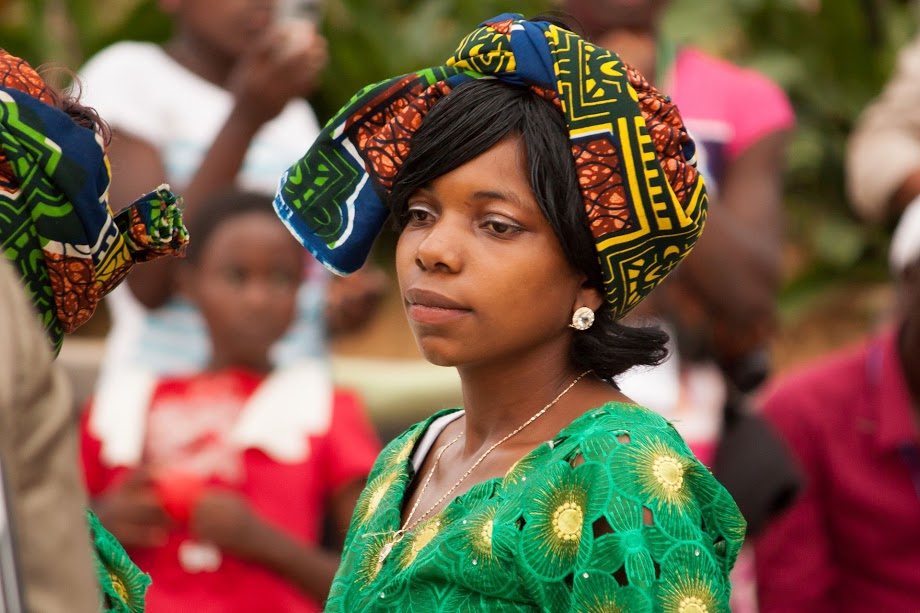
Dec 27, 2016 | Non categorizzato
Memories, gratitude and commitment were the keypoints of the celebrations in Fontem, Cameroon, for the 50th anniversary of the arrival of several focolarini in the Cameroon forest to begin a work in close harmony with the local Bangwa peo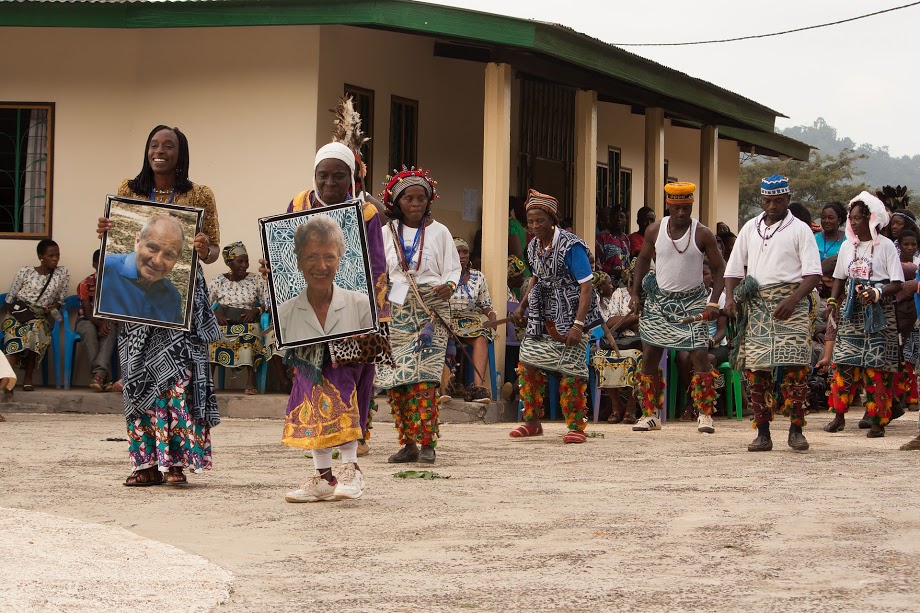 ple. In the opening remarks of civil and traditional authorities, and Focolare co-president Jesús Morán, the importance of those beginnings was remembered as well as the notable development that followed. The method used by the focolarini was also emphasized: dialogue with the local population and its traditional religion. This approach, which is typical of the Focolare, gave rise here and throughout the world to many positive experiences of interreligious dialogue, as Rita Mussallem from the Focolare’s Centre for Dialogue remembered in her address. The keynote address was given by Bishop Nkea Andrew, Bishop of the Mamfe Diocese who, through his own personal experience as a Bangwa, confirmed the precious value of this dialogue and its total conformity to the Gospel. One young Austrian priest who attended the events, commented: “The harmony between the values of African culture and Christian values is quite striking.” On the second day, which was dedicated to testimonies, one of the first nurses and first doctors emphasized how the close collaboration with the local people was a light for providing care to the sick that took into account the needs of both body and spirit. New and lasting friendships were born that brought healing. There were touching testimonies of accompanying people in the final moments of life. This was followed by the testimonies of several ex-students of the College: a police comissioner, a young priest and a nurse. They all said that along with the excellent scientific knowledge, they were also provided the possiblity of discovering those human and spiritual values that now make them happy human beings and appreciated by the Church and society. There was a presentation of the Economy of Communion in Cameroon, a project that will soon be launching an international conference on the continent. The third day was dedicated to giving thanks. Several presentations remembered all those, among the first, who gave their lives for Fontem like Piero Pasolini, Dr Lucio da Soglio, and so on…. Since they considered the others to be their equals, their work was marked by reciprocity and not assistenzialism. This was followed by traditional dances from five Fondoms (territories) that comprise Lebialem Division. More than 2,500 people were then served lunch thanks to the love of many “mamme” who had worked tirelessly, day and night, in the days leading up to the event. In the evening, there was a very moving musical presented by the children and students, which recounted the story of Fontem.
ple. In the opening remarks of civil and traditional authorities, and Focolare co-president Jesús Morán, the importance of those beginnings was remembered as well as the notable development that followed. The method used by the focolarini was also emphasized: dialogue with the local population and its traditional religion. This approach, which is typical of the Focolare, gave rise here and throughout the world to many positive experiences of interreligious dialogue, as Rita Mussallem from the Focolare’s Centre for Dialogue remembered in her address. The keynote address was given by Bishop Nkea Andrew, Bishop of the Mamfe Diocese who, through his own personal experience as a Bangwa, confirmed the precious value of this dialogue and its total conformity to the Gospel. One young Austrian priest who attended the events, commented: “The harmony between the values of African culture and Christian values is quite striking.” On the second day, which was dedicated to testimonies, one of the first nurses and first doctors emphasized how the close collaboration with the local people was a light for providing care to the sick that took into account the needs of both body and spirit. New and lasting friendships were born that brought healing. There were touching testimonies of accompanying people in the final moments of life. This was followed by the testimonies of several ex-students of the College: a police comissioner, a young priest and a nurse. They all said that along with the excellent scientific knowledge, they were also provided the possiblity of discovering those human and spiritual values that now make them happy human beings and appreciated by the Church and society. There was a presentation of the Economy of Communion in Cameroon, a project that will soon be launching an international conference on the continent. The third day was dedicated to giving thanks. Several presentations remembered all those, among the first, who gave their lives for Fontem like Piero Pasolini, Dr Lucio da Soglio, and so on…. Since they considered the others to be their equals, their work was marked by reciprocity and not assistenzialism. This was followed by traditional dances from five Fondoms (territories) that comprise Lebialem Division. More than 2,500 people were then served lunch thanks to the love of many “mamme” who had worked tirelessly, day and night, in the days leading up to the event. In the evening, there was a very moving musical presented by the children and students, which recounted the story of Fontem. On the fourth day, the presence of Our Lady Seat of Wisdom College in Fontem was celebrated. The bishop of Mamfe exhorted the many ex-students who had come from many countries of the world, to be aware of the gifts they had received and have made them ambassadors of unity wherever they may go. Charles Tasong, who was among the first Bangwa to know the Focolare commented: “During the Cry Die (commemorating Lucio Soglio, Lino D’armi and Doris Ronacher, who died recently after spending all their energy on Fontem), I realized that there is no longer the Focolare and the Bangwa; no longer the whites on one side, the blacks on the other – but one family. I want to embrace the challenge of bringing forward in my own life the powerful reality of unity that we experienced here in Fontem.” Biagio Sparapano
On the fourth day, the presence of Our Lady Seat of Wisdom College in Fontem was celebrated. The bishop of Mamfe exhorted the many ex-students who had come from many countries of the world, to be aware of the gifts they had received and have made them ambassadors of unity wherever they may go. Charles Tasong, who was among the first Bangwa to know the Focolare commented: “During the Cry Die (commemorating Lucio Soglio, Lino D’armi and Doris Ronacher, who died recently after spending all their energy on Fontem), I realized that there is no longer the Focolare and the Bangwa; no longer the whites on one side, the blacks on the other – but one family. I want to embrace the challenge of bringing forward in my own life the powerful reality of unity that we experienced here in Fontem.” Biagio Sparapano
Dec 26, 2016 | Non categorizzato
https://vimeo.com/195193687 It all started with a group of young girls and a green drum kit … The spark that gave life to Gen Verde was something unusual not so much because of the green drum kit but the wish that came with it… “to make a lot of noise”. That’s right. Blast it out, making the ideal of unity heard by all through music and performances, that is the soul of our whole life. That spark sped off, reaching all corners of the world and touching countless lives. Unity is best expressed when we sing it together. That’s what they wanted to say through this song. It tells it like it is. That message is just as relevant today as it was 50 years ago when it all began: each one of us is a spark. So let’s stand up, wherever we are, and turn up the volume of unity. Gen Verde – International Performing Arts Group Gen Rosso International Performing Arts Group
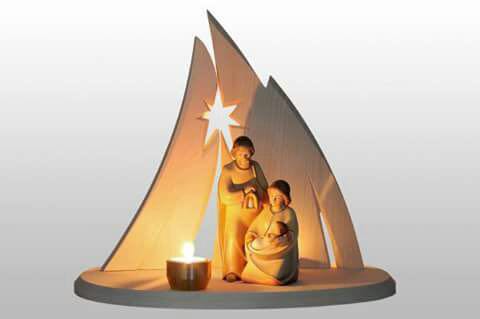
Dec 24, 2016 | Non categorizzato
 Christmas, Christmas, how often have we celebrated you with pure joy and unmatched ardour! But you find our hearts so frozen by the coldness of this world, that you cannot touch them as you would with your mysterious extraordinary message: GOD LOVES US, one by one and all together. This Love wrapped us round so completely that the Blessed Trinity resolved to send among us the Son of God made man, so our brief sojourn on this earth could be illuminated from now on by the Light that does not fade, and the absurdity of death in this life be transformed into a simple passing into life more full and eternal! We hope this year at least, that You, Christmas, may say to our hearts all you wish to say and find us ready, here and now to hear your voice.
Christmas, Christmas, how often have we celebrated you with pure joy and unmatched ardour! But you find our hearts so frozen by the coldness of this world, that you cannot touch them as you would with your mysterious extraordinary message: GOD LOVES US, one by one and all together. This Love wrapped us round so completely that the Blessed Trinity resolved to send among us the Son of God made man, so our brief sojourn on this earth could be illuminated from now on by the Light that does not fade, and the absurdity of death in this life be transformed into a simple passing into life more full and eternal! We hope this year at least, that You, Christmas, may say to our hearts all you wish to say and find us ready, here and now to hear your voice.
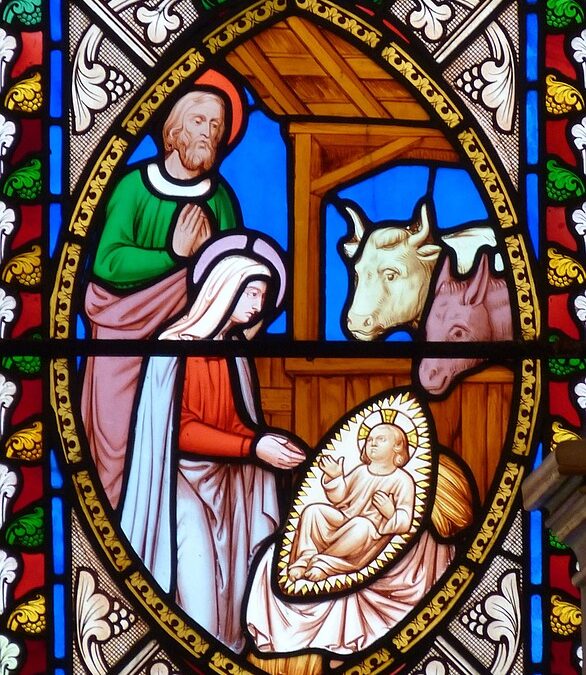
Dec 23, 2016 | Non categorizzato
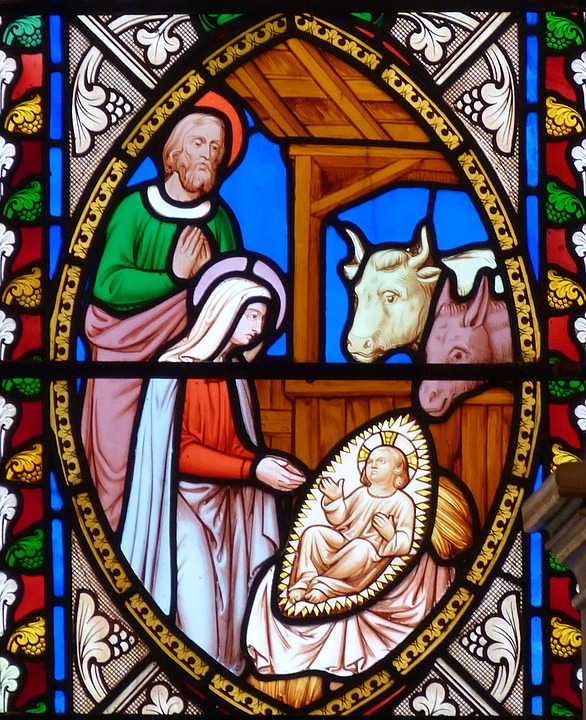 |
Christmas reminds us, along with the Scripture passage that we’ve chosen to live this month, that “He comes to save us” (Is 35:4). Save us from what? Among other things, our indifference towards those who suffer. My wish for you this Christmas is that we may all go beyond ourselves and welcome the other, all the others: those in need, those who have left their own lands because of hunger and war, those who are lonely, marginalized, imprisoned….. My wish for all of us is that after having experienced God’s love that saves us, we will reach out to save those around us. Happy Christmas everybody!
Maria Voce
|
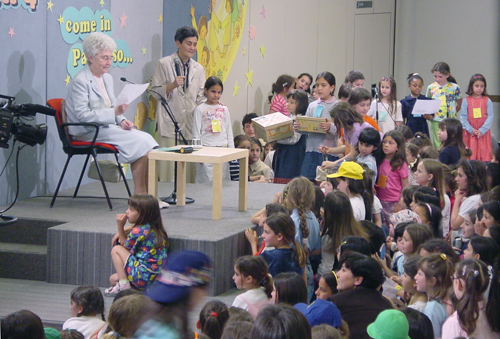
Dec 22, 2016 | Focolare Worldwide
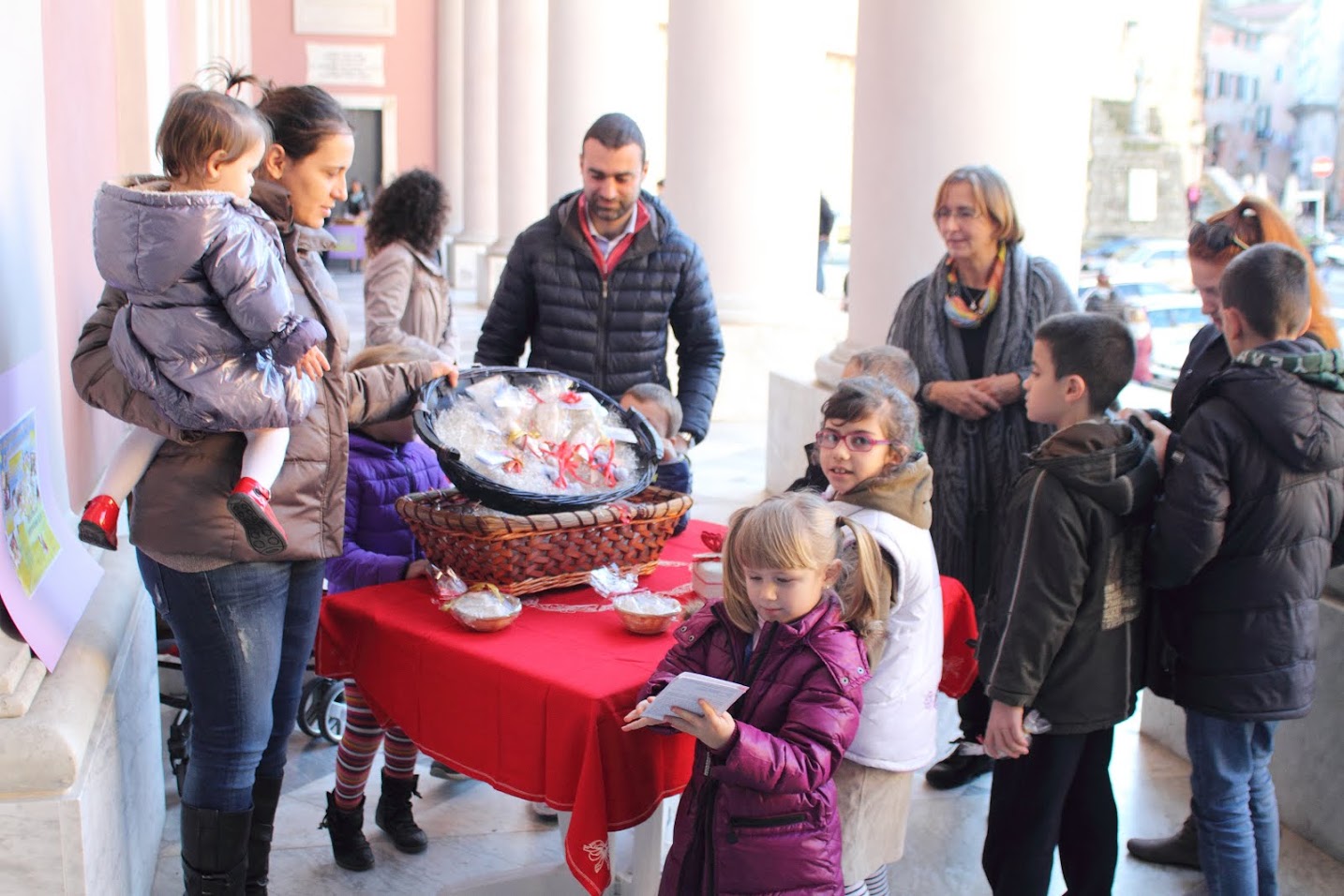 They are the Gen4, the children in the Focolare Movement, explain their idea of Christmas not only as a colourful celebration, filled with enchanting imaginary characters created by persuasive businesses and a frenetic race to sell and buy gifts: We should put Jesus back into the centre of Christmas, it’s his day,” they explain. The Gen4 made the small figurines of the Holy Child with much patience and love and then gave them away to passersby. They report from New York City: “While visiting the city with some friends, in the midst of the crowd, your small table drew my attention … Those words, “They’ve Evicted Jesus” resounded inside me! I’d like to transmit your message to others! This is has been my most beautiful Christmas, you’ve filled my heart with warmth.” Maria Helena Benjamin and Pep Cannoves who are responsible for the Gen4 worldwide, recounted how these little ones are particularly sensitive to evangelical love. They learn to concretize it in their daily actions, real factual gestures of fraternity. They discover that when love is mutual it brings the presence of Jesus among them. Thus they come to know Him and create simple and direct relationship with Him. They manage to involve their friends at school, their families, their parents and their teachers with their disarming simplicity, and they enter into the heart of each one of them.
They are the Gen4, the children in the Focolare Movement, explain their idea of Christmas not only as a colourful celebration, filled with enchanting imaginary characters created by persuasive businesses and a frenetic race to sell and buy gifts: We should put Jesus back into the centre of Christmas, it’s his day,” they explain. The Gen4 made the small figurines of the Holy Child with much patience and love and then gave them away to passersby. They report from New York City: “While visiting the city with some friends, in the midst of the crowd, your small table drew my attention … Those words, “They’ve Evicted Jesus” resounded inside me! I’d like to transmit your message to others! This is has been my most beautiful Christmas, you’ve filled my heart with warmth.” Maria Helena Benjamin and Pep Cannoves who are responsible for the Gen4 worldwide, recounted how these little ones are particularly sensitive to evangelical love. They learn to concretize it in their daily actions, real factual gestures of fraternity. They discover that when love is mutual it brings the presence of Jesus among them. Thus they come to know Him and create simple and direct relationship with Him. They manage to involve their friends at school, their families, their parents and their teachers with their disarming simplicity, and they enter into the heart of each one of them.  Pep Canoves recalled how Chiara Lubich deeply cherished these little ones, giving them a special place in her heart, going to visit them during their international congresses, sending messages to them, answering their questions. And it was to them that she extended the invitation to prevent Jesus from being banished from Christmas: “Let Jesus be born in your midst through your mutual love; then it was always be Christmas! […] We can offer Jesus, Jesus in our midst to the whole world. We can take this love of ours, Jesus in the midst, our joy, into the streets, into the schools, to young and old … anywhere!” The Gen4 also have their Advent Wreath activity. They fill the days before Christmas with many concrete acts of love that are appear simple, but in their smallness are quite revolutionary. The Gen4 are involved in many projects, especially for the most poor. “During the year,” Maria Helena Benjamin continues, “we receive lots of news from around the world about their projects for the marginalized, like the story of five year-old Sonia from Romania who became friends with a Roma girl that had just joined her class.” “We received news from Madagascar and from Indonesia. Also from Syria which these days is in so much trouble and at war… Pep recounts: “From Aleppo they even sent us photos: in these conflict situations we carry on living with them, continuing with them to believe in love.” Once, while answering to a question from one of the Gen4 boys, Chiara had given them a special assignment: “Do you know what real happiness is? It’s the happiness you have when you love. Try it! Whenever you love, you’re happy. If you love all the time, you’ll be happy all the time. What should you do in the world? Give happiness to people, teach everyone to love.” And they really do teach us, with their purity and simplicity, how to put evangelica love into practice, the secret to happiness. Patrizia Mazzola
Pep Canoves recalled how Chiara Lubich deeply cherished these little ones, giving them a special place in her heart, going to visit them during their international congresses, sending messages to them, answering their questions. And it was to them that she extended the invitation to prevent Jesus from being banished from Christmas: “Let Jesus be born in your midst through your mutual love; then it was always be Christmas! […] We can offer Jesus, Jesus in our midst to the whole world. We can take this love of ours, Jesus in the midst, our joy, into the streets, into the schools, to young and old … anywhere!” The Gen4 also have their Advent Wreath activity. They fill the days before Christmas with many concrete acts of love that are appear simple, but in their smallness are quite revolutionary. The Gen4 are involved in many projects, especially for the most poor. “During the year,” Maria Helena Benjamin continues, “we receive lots of news from around the world about their projects for the marginalized, like the story of five year-old Sonia from Romania who became friends with a Roma girl that had just joined her class.” “We received news from Madagascar and from Indonesia. Also from Syria which these days is in so much trouble and at war… Pep recounts: “From Aleppo they even sent us photos: in these conflict situations we carry on living with them, continuing with them to believe in love.” Once, while answering to a question from one of the Gen4 boys, Chiara had given them a special assignment: “Do you know what real happiness is? It’s the happiness you have when you love. Try it! Whenever you love, you’re happy. If you love all the time, you’ll be happy all the time. What should you do in the world? Give happiness to people, teach everyone to love.” And they really do teach us, with their purity and simplicity, how to put evangelica love into practice, the secret to happiness. Patrizia Mazzola
![The simplicity of Aletta]()
Dec 21, 2016 | Non categorizzato
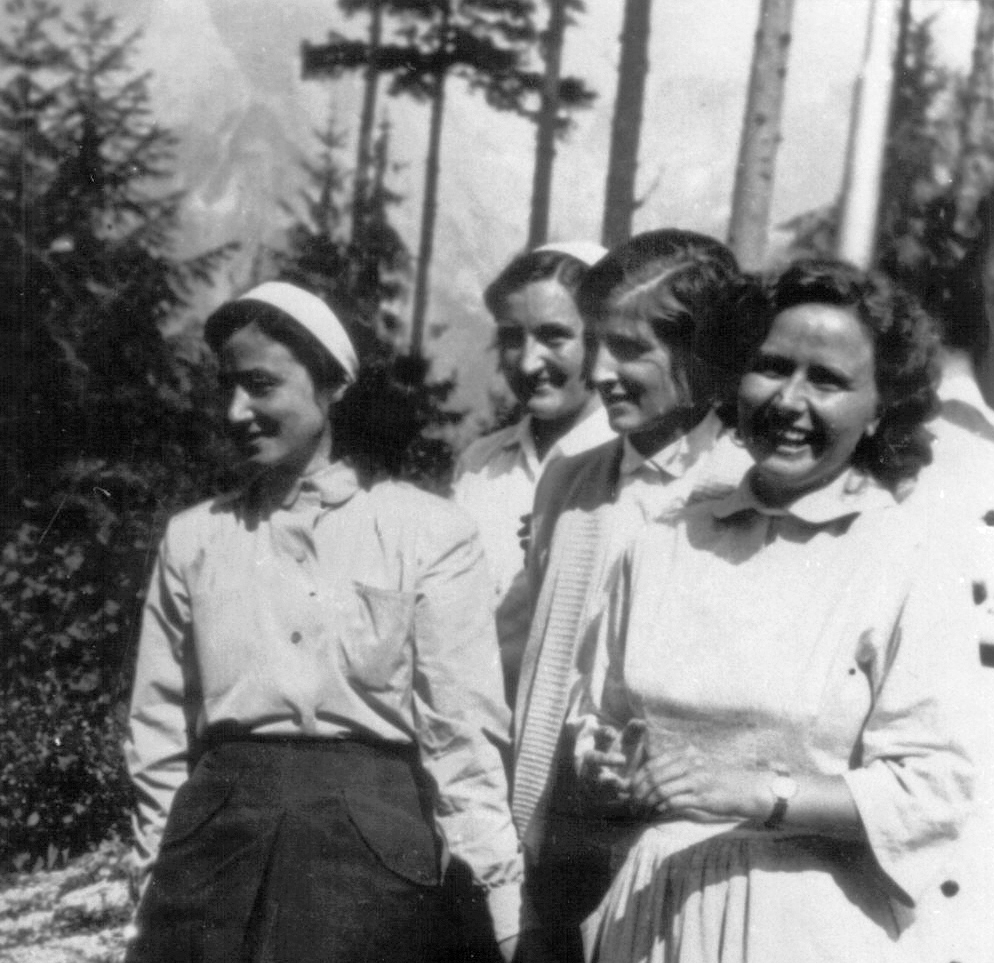 Born in Martignano (Trent) on 27 November 1924, Vittoria Salizzoni, who moved temporarily to France with her family, felt God’s call at the age of 13: an intuition which she tried momentarily to put aside. At the age of 21 she met Chiara Lubich and was attracted by the novelty of the life she lived. Her doubts dissolved immediately: the path through which she could respond to that “calling” she had felt ever since childhood, was the focolare. Aletta (“little wing,” the name that Chiara gave her to remind her of the winged flight she had to take without looking back) stood by Chiara for 20 years in the discovery and implementation of the features of the Charism the Holy Spirit was slowly revealing to them. Among these, besides the specific spirituality of unity which is its particular characterstic, were the main concrete aspects of Christian life. What specifically suited the figure of Aletta, was the concern for health and protection of the environment. Chiara herself had explained this aspect to her as: «the entire humanity of Jesus; the life of Jesus in each person. Jesus was born of a woman like us, suffered the cold and hunger, cried, and experienced human affection. He fed the hungry, multiplied the bread and fishes, and healed many sick people. But above all he was full of love for mankind, and his suffering… Suffering, death and the resurrection are also expressions of this aspect.» In the 1960s and 1970s Chiara asked her to open the focolare house in Istanbul, where Aletta would have many and profound contacts with Patriarch Athenagoras I. So on many occasions, she had the chance to accompany Chiara in her visits to the Patriarch. During her stay in those lands, Aletta discovered the beauty of the Orthodox Church and the Churches of the Orient, in which she saw the importance of translating truth in life, exalting love. The contacts she established were the precursor of a fertile dialogue that has continued up to today, with the current Ecumenical Patriarch, Bartholomew I.
Born in Martignano (Trent) on 27 November 1924, Vittoria Salizzoni, who moved temporarily to France with her family, felt God’s call at the age of 13: an intuition which she tried momentarily to put aside. At the age of 21 she met Chiara Lubich and was attracted by the novelty of the life she lived. Her doubts dissolved immediately: the path through which she could respond to that “calling” she had felt ever since childhood, was the focolare. Aletta (“little wing,” the name that Chiara gave her to remind her of the winged flight she had to take without looking back) stood by Chiara for 20 years in the discovery and implementation of the features of the Charism the Holy Spirit was slowly revealing to them. Among these, besides the specific spirituality of unity which is its particular characterstic, were the main concrete aspects of Christian life. What specifically suited the figure of Aletta, was the concern for health and protection of the environment. Chiara herself had explained this aspect to her as: «the entire humanity of Jesus; the life of Jesus in each person. Jesus was born of a woman like us, suffered the cold and hunger, cried, and experienced human affection. He fed the hungry, multiplied the bread and fishes, and healed many sick people. But above all he was full of love for mankind, and his suffering… Suffering, death and the resurrection are also expressions of this aspect.» In the 1960s and 1970s Chiara asked her to open the focolare house in Istanbul, where Aletta would have many and profound contacts with Patriarch Athenagoras I. So on many occasions, she had the chance to accompany Chiara in her visits to the Patriarch. During her stay in those lands, Aletta discovered the beauty of the Orthodox Church and the Churches of the Orient, in which she saw the importance of translating truth in life, exalting love. The contacts she established were the precursor of a fertile dialogue that has continued up to today, with the current Ecumenical Patriarch, Bartholomew I.  After the death of Athenagoras, Aletta moved to Lebanon. Those were years of civil war, which with the continuous air raids, repeated the lesson of the movement’s early years in Trent: “everything collapses, only God remains!” She shared with the local people the insecurity and risks of those long years of war, supporting, consoling, and imbuing hope. Difficulties and dangers did not hinder the spread of the charism of unity, not only in Lebanon but across the Middle East, which Aletta visited periodically. In 1990 she returned to Rome for good. «During those first years in Piazza Cappuccini – recounts Palmira, who is also from that first group of focolarine women of Trent – I would go with Aletta to the valleys to meet the first communities that were sprouting. She was like an angel, and it explains clearly why Chiara immediately called her so. And she was like the batter of an angel’s wing, for Chiara and for all of us throughout these 70 years of her life in the focolare. She didn’t talk much, but what she said put us all in the essential facts of life. What characterized her most was simplicity, an inborn serenity and enviable psycho-physical balance.» Ten days before her death, Aletta recorded a video message to the youths of the Movement, the gen, gathered for their congress: «I want to greet all the gen of the world on their 50th anniversary. May they all make progress; they are young, still strong, and can do all they wish!» Upon announcing the death of Aletta to the Movement worldwide, Maria Voce, the Focolare President wrote: «With joy and immense gratitude we are accompanying Aletta to the house of the Father. We could not have had a better model than her, who gave her life without measure.» By Anna Friso
After the death of Athenagoras, Aletta moved to Lebanon. Those were years of civil war, which with the continuous air raids, repeated the lesson of the movement’s early years in Trent: “everything collapses, only God remains!” She shared with the local people the insecurity and risks of those long years of war, supporting, consoling, and imbuing hope. Difficulties and dangers did not hinder the spread of the charism of unity, not only in Lebanon but across the Middle East, which Aletta visited periodically. In 1990 she returned to Rome for good. «During those first years in Piazza Cappuccini – recounts Palmira, who is also from that first group of focolarine women of Trent – I would go with Aletta to the valleys to meet the first communities that were sprouting. She was like an angel, and it explains clearly why Chiara immediately called her so. And she was like the batter of an angel’s wing, for Chiara and for all of us throughout these 70 years of her life in the focolare. She didn’t talk much, but what she said put us all in the essential facts of life. What characterized her most was simplicity, an inborn serenity and enviable psycho-physical balance.» Ten days before her death, Aletta recorded a video message to the youths of the Movement, the gen, gathered for their congress: «I want to greet all the gen of the world on their 50th anniversary. May they all make progress; they are young, still strong, and can do all they wish!» Upon announcing the death of Aletta to the Movement worldwide, Maria Voce, the Focolare President wrote: «With joy and immense gratitude we are accompanying Aletta to the house of the Father. We could not have had a better model than her, who gave her life without measure.» By Anna Friso
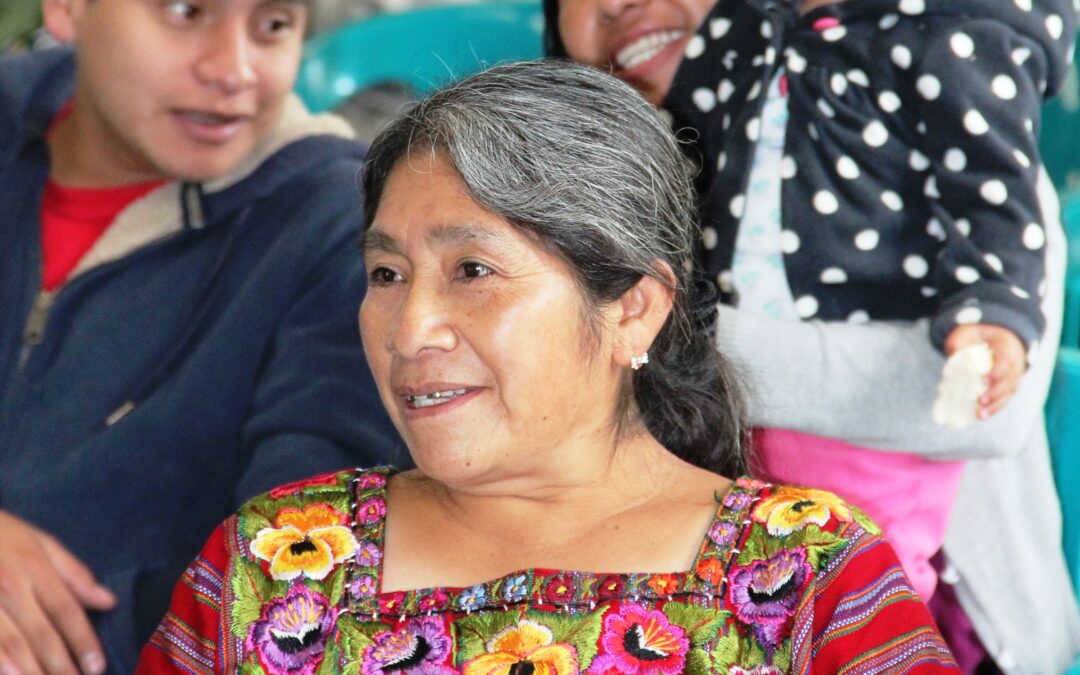
Dec 20, 2016 | Non categorizzato
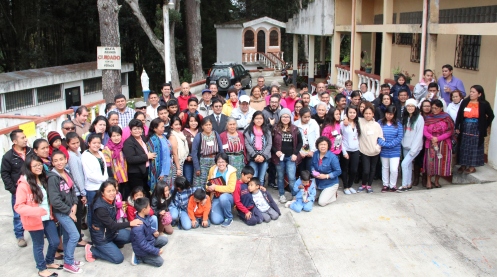 «We visited the families with the Word of Life leaflet and while talking about one thing and the other, a meeting ensued.» These were the words of Carmen, who with her husband, Mynor and their nearest of kin, initiated the holding of the Mariapolis close to their city, Chimaltenango, 54 km from Guatemala City. Based on commerce and agriculture, the city’s economy is integrated with the modern rhythms of production and consumption, but still jealously guards their ancient culture and traditions. Carmen and Mynor are the heart of the Focolare community and their big house is the local base of the Movement. With a twinge of pride they told us about the meetings they hold there. Information about the Movement was barely disseminated, so the first thing they did was to inform the parish priest, who Mynor, Carmen, and her sister, Marta went to visit. But priests in these areas are very busy, and since Mynor could not wait for long, he went to his work in Court. «The priest could not understand what novelties the Movement could bring – Carmen continued – until my sister Marta told him about the experiences of her children who are gen3». The first had allocated the money she received on her 15th birthday to the poor children of an isolated village; the other had forgiven a school mate who had tripped him and caused him to consequently break an arm. At that point the parish priest understood the effects of living the Focolare spirituality. Once they received the support of the local church, they had to cover the expenses. «When people are invited to a retreat – Mynor said – they know they will be hosted as guests». Because of this the preparation for the Mariapolis also consisted in fundraising activities, one of which was holding Bingo sessions in the parish hall, and gathering gifts for the occasion.
«We visited the families with the Word of Life leaflet and while talking about one thing and the other, a meeting ensued.» These were the words of Carmen, who with her husband, Mynor and their nearest of kin, initiated the holding of the Mariapolis close to their city, Chimaltenango, 54 km from Guatemala City. Based on commerce and agriculture, the city’s economy is integrated with the modern rhythms of production and consumption, but still jealously guards their ancient culture and traditions. Carmen and Mynor are the heart of the Focolare community and their big house is the local base of the Movement. With a twinge of pride they told us about the meetings they hold there. Information about the Movement was barely disseminated, so the first thing they did was to inform the parish priest, who Mynor, Carmen, and her sister, Marta went to visit. But priests in these areas are very busy, and since Mynor could not wait for long, he went to his work in Court. «The priest could not understand what novelties the Movement could bring – Carmen continued – until my sister Marta told him about the experiences of her children who are gen3». The first had allocated the money she received on her 15th birthday to the poor children of an isolated village; the other had forgiven a school mate who had tripped him and caused him to consequently break an arm. At that point the parish priest understood the effects of living the Focolare spirituality. Once they received the support of the local church, they had to cover the expenses. «When people are invited to a retreat – Mynor said – they know they will be hosted as guests». Because of this the preparation for the Mariapolis also consisted in fundraising activities, one of which was holding Bingo sessions in the parish hall, and gathering gifts for the occasion. 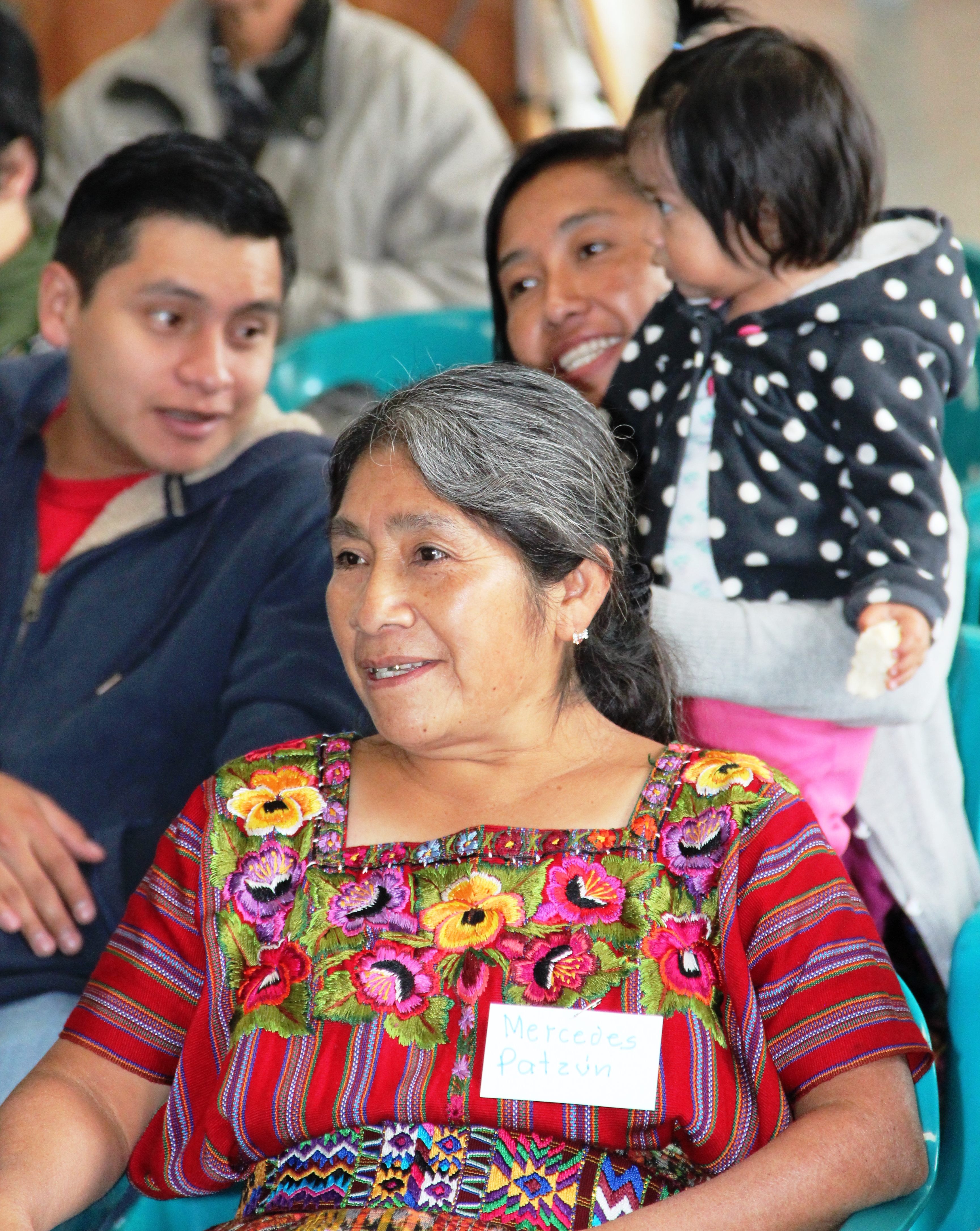 Kelly, the second of Carmen and Mynor’s four children, is studying law to follow in her father’s footsteps. «There are only a few of us in the faculty – she affirmed – but we help each other. Only two of us are gen but we always try to have Jesus in our midst and with everyone». Kelly admires the coherent life of her parents: «When they invited people to the Mariapolis, they spoke about experiences I know, and which were all true. In our home, the Word of Life is the reference for every situation. And so, when there is a problem we read it in order to put it into practice.» Respect for the elderly is one of the riches of the Kaqchikel. In their presence, a gesture of reverence is shown before speaking. Motherhood and the gift of children are considered a benediction of God and are foremost in value compared to all considerations. «For me, the Movement – again Carmen says – is a grace of God that welcomes us, adults and children, and likewise the various cultures and languages. Here, they appreciate us, with our traditions and mentality.» In the culture of the Maya there is a strong bond with nature. «We invoke it, giving thanks to the heart of the heavens and the heart of the earth, and like St. Francis, we say: all are my brothers. Also Chiara Lubich had this vision. The Holy Spirit inspired her in this sense, which is why the Focolare Movement welcomes us as we are.» Mynor concludes: «The Maya philosophy stresses harmony, balance of the material and spiritual aspects, and solidarity which is equal to fraternity, to nurture conditions of cooperation.» Beyond all the contradictions that reign in every culture, the Kaqchikel conserve many human values which, enlightened and purified by the Gospel, enrich all those who receive it. Filippo Casabianca, Guatemala City
Kelly, the second of Carmen and Mynor’s four children, is studying law to follow in her father’s footsteps. «There are only a few of us in the faculty – she affirmed – but we help each other. Only two of us are gen but we always try to have Jesus in our midst and with everyone». Kelly admires the coherent life of her parents: «When they invited people to the Mariapolis, they spoke about experiences I know, and which were all true. In our home, the Word of Life is the reference for every situation. And so, when there is a problem we read it in order to put it into practice.» Respect for the elderly is one of the riches of the Kaqchikel. In their presence, a gesture of reverence is shown before speaking. Motherhood and the gift of children are considered a benediction of God and are foremost in value compared to all considerations. «For me, the Movement – again Carmen says – is a grace of God that welcomes us, adults and children, and likewise the various cultures and languages. Here, they appreciate us, with our traditions and mentality.» In the culture of the Maya there is a strong bond with nature. «We invoke it, giving thanks to the heart of the heavens and the heart of the earth, and like St. Francis, we say: all are my brothers. Also Chiara Lubich had this vision. The Holy Spirit inspired her in this sense, which is why the Focolare Movement welcomes us as we are.» Mynor concludes: «The Maya philosophy stresses harmony, balance of the material and spiritual aspects, and solidarity which is equal to fraternity, to nurture conditions of cooperation.» Beyond all the contradictions that reign in every culture, the Kaqchikel conserve many human values which, enlightened and purified by the Gospel, enrich all those who receive it. Filippo Casabianca, Guatemala City
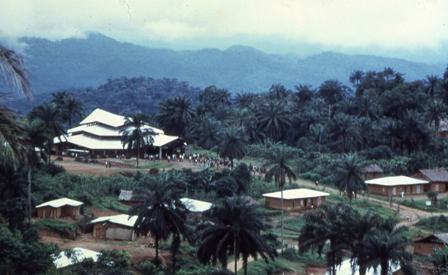
Dec 19, 2016 | Focolare Worldwide
 “I was asked to present a report on the Christian witness in front of African tradition. It wasn’t easy for me, for two simple reasons: the first is that I am a Bangwa, the second is that I’m not only Christian, but also the bishop of Mamfe.” The speaker is Bishop Andrew Fuanya Nkea at a symposium on dalogue between traditional African religions and Christianity, during the 50th anniversary celebration of the Focolare Movement in Fontem. Fifty-one years old, he is originally from Widikum, Cameroon, graduate in Philosophy and Theology, a priest since 1992, pastor, secretary of the Diocese, professor and formator, Secretary General of the Catholic University of Cameroon and recently named Bishop of the diocese of Mamfe. “I decided to use a more practical than theoretical approach in my talk,” said the bishop who then proceeded to recount the history of the relationship between the Bangwa culture – especially in the south west region of Cameroon, the Lebialem District – and Christianity. That relationship was marked by an encounter that turned into a sort of parting of the waters between a before and an after: the encounter with the Focolare Movement. Bishop Andrew Fuanya is a living demonstration that it is possible to overcome the dualism between two traditions, without falling into religous syncretism. The Christianity brought by the first missionaries who arrived in Cameroon in the 1920s had placed the population in front of a fork in the road: “Either you become Christian and avoid all aspects of the traditional religions, or you practice the Bangwa religion, remaining a pagan, good only as firewood for hell.” There was little or no dialogue between Christianity and the local culture. Typical musical instruments were banned in church, along with traditional prayers. In spite of the rigidity and inflexible methods used by the first missionaries, many people embraced Christianity, even though it was very difficult and in direct opposition to their communities.
“I was asked to present a report on the Christian witness in front of African tradition. It wasn’t easy for me, for two simple reasons: the first is that I am a Bangwa, the second is that I’m not only Christian, but also the bishop of Mamfe.” The speaker is Bishop Andrew Fuanya Nkea at a symposium on dalogue between traditional African religions and Christianity, during the 50th anniversary celebration of the Focolare Movement in Fontem. Fifty-one years old, he is originally from Widikum, Cameroon, graduate in Philosophy and Theology, a priest since 1992, pastor, secretary of the Diocese, professor and formator, Secretary General of the Catholic University of Cameroon and recently named Bishop of the diocese of Mamfe. “I decided to use a more practical than theoretical approach in my talk,” said the bishop who then proceeded to recount the history of the relationship between the Bangwa culture – especially in the south west region of Cameroon, the Lebialem District – and Christianity. That relationship was marked by an encounter that turned into a sort of parting of the waters between a before and an after: the encounter with the Focolare Movement. Bishop Andrew Fuanya is a living demonstration that it is possible to overcome the dualism between two traditions, without falling into religous syncretism. The Christianity brought by the first missionaries who arrived in Cameroon in the 1920s had placed the population in front of a fork in the road: “Either you become Christian and avoid all aspects of the traditional religions, or you practice the Bangwa religion, remaining a pagan, good only as firewood for hell.” There was little or no dialogue between Christianity and the local culture. Typical musical instruments were banned in church, along with traditional prayers. In spite of the rigidity and inflexible methods used by the first missionaries, many people embraced Christianity, even though it was very difficult and in direct opposition to their communities.  The novelty represented by the first visit of Chiara Lubich to the royal palace of the Fon of Fontem in 1966 can be described with an image used by the Focolare foundress in describing the first spark, the first inspiration of the interreligious dialogue that would later develop: “Suddenly I had the strong impression of God as an enormous sun that embraced everybody with His love – us and them.” A new era had begun, driven on the wind of the Second Vatican Council and by the extraordinary story of the friendship among the first focolarini to reach the spot and the Bangwa people. The focolarini included doctors who had come to wipe out the sleeping sickness that was decimating the population. Since then, the relationship between the faithful of the two religions have been characterized by deep mutual respect which restored dignity to the traditional culture and was a veritable laboratory in which the identity of both religions could grow. The bishop explains: some local religious traditions were kept, such as praying to the dead, so that they might intercede for the family, or the Cry Die, the day dedicated to them; other things were strange to their new faith, such as polygamy, animal sacrifice and witchcraft. The new inculturation, concluded the bishop, according to the spirit of the Second Vatican Council, does not come from an imposition of a rigid uniformity, but is inspired by the values of dialogue and collaboration, in the search for the ‘Seeds of the Word’ that are scattered in every religious tradition. “The challenge for the Christians of Lebialem for the next 50 years will be to recognize that their credibility will depend on how much they are able to love everybody, independant of the religion they belong to.” Only in this way will they be authentic Christians and authentic Africans.” Chiara Favotti Full interview with Mons. Andrew F. Nkea
The novelty represented by the first visit of Chiara Lubich to the royal palace of the Fon of Fontem in 1966 can be described with an image used by the Focolare foundress in describing the first spark, the first inspiration of the interreligious dialogue that would later develop: “Suddenly I had the strong impression of God as an enormous sun that embraced everybody with His love – us and them.” A new era had begun, driven on the wind of the Second Vatican Council and by the extraordinary story of the friendship among the first focolarini to reach the spot and the Bangwa people. The focolarini included doctors who had come to wipe out the sleeping sickness that was decimating the population. Since then, the relationship between the faithful of the two religions have been characterized by deep mutual respect which restored dignity to the traditional culture and was a veritable laboratory in which the identity of both religions could grow. The bishop explains: some local religious traditions were kept, such as praying to the dead, so that they might intercede for the family, or the Cry Die, the day dedicated to them; other things were strange to their new faith, such as polygamy, animal sacrifice and witchcraft. The new inculturation, concluded the bishop, according to the spirit of the Second Vatican Council, does not come from an imposition of a rigid uniformity, but is inspired by the values of dialogue and collaboration, in the search for the ‘Seeds of the Word’ that are scattered in every religious tradition. “The challenge for the Christians of Lebialem for the next 50 years will be to recognize that their credibility will depend on how much they are able to love everybody, independant of the religion they belong to.” Only in this way will they be authentic Christians and authentic Africans.” Chiara Favotti Full interview with Mons. Andrew F. Nkea
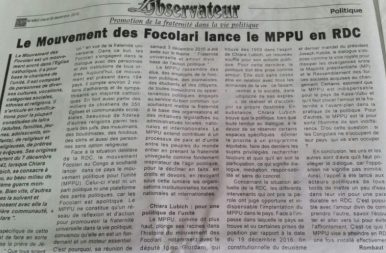
Dec 18, 2016 | Focolare Worldwide
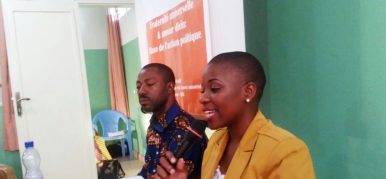 The Democratic Republic of the Congo (DRC) has been passing through a very delicate phase in its politics since last November 14th when the Premier Augustin Matata Ponyo was dismissed, following an accord in October that prolonged the mandate of President Joseph Kabila. Kabila should have terminated his office last December 19th, but his coalition, along with part of the opposition, has decided to continue on until next elections in April 2018. This was the heated context in which the Congolese Political Movement for Unity (PMU), which is inspired by the values of the spirituality of Chiara Lubich, was formed last October 29th. “During this period, the Church and its Bishops Conference is working to avoid chaos in the country,” say Damien Kasereka and Aga Ghislaine Kahambu from the local Focolare Movement. “The launching of the PMU at this moment is really an answer to a need. We’re glad to see members of the Movement more involved in politics, especially the young people who are convinced that things can be different. In spite of everything, we don’t lost hope.” On December 3rd the PMU was officially introduced at the multi-purpose meeting hall of the Moyi Mwa Ntongo Medical Centre in Kinshasa. The Le potentiel newspaper devoted a long article to the event, titled “Love and Brotherhood in Society: the Launch of a Mass-Awareness Movement”. “Far from being a political party, the PMU is a network of reflection and action for the promotion of brotherhood in the political life of the Congo. Its initiators are convinced that universal brotherhood is the basis and the key for positive change in society, especially Congolese [society] whose anti-values are finding it hard to die out,” the newspaper wrote. The event was attended by university researchers, teaching staff, journalists, religious, medical doctors, graduate students, social activists and other professionals. The meeting underscored the importance and opportunity being offered by the PMU in the DRC, since it promotes “doing politics in favour of unity” which is so needed at this difficult moment in time. The National Deputy Dieudonné Upira, one of the initiators of the PMU in the DRC, affirmed: “We’d like to raise a generation of young people who are not afraid like us. Obviously, we have not done much for this country. Perhaps we weren’t trained and this is the reason behind our fear. Therefore, we want to train the young people who are interested in doing good, so that they will be prepared to denounce, announce and renounce. Young people who, in front of the bipolarization of the Congolese political sphere, are able to say: “We must work for our nation.” A young person with training can influence society with his or her way of acting.”
The Democratic Republic of the Congo (DRC) has been passing through a very delicate phase in its politics since last November 14th when the Premier Augustin Matata Ponyo was dismissed, following an accord in October that prolonged the mandate of President Joseph Kabila. Kabila should have terminated his office last December 19th, but his coalition, along with part of the opposition, has decided to continue on until next elections in April 2018. This was the heated context in which the Congolese Political Movement for Unity (PMU), which is inspired by the values of the spirituality of Chiara Lubich, was formed last October 29th. “During this period, the Church and its Bishops Conference is working to avoid chaos in the country,” say Damien Kasereka and Aga Ghislaine Kahambu from the local Focolare Movement. “The launching of the PMU at this moment is really an answer to a need. We’re glad to see members of the Movement more involved in politics, especially the young people who are convinced that things can be different. In spite of everything, we don’t lost hope.” On December 3rd the PMU was officially introduced at the multi-purpose meeting hall of the Moyi Mwa Ntongo Medical Centre in Kinshasa. The Le potentiel newspaper devoted a long article to the event, titled “Love and Brotherhood in Society: the Launch of a Mass-Awareness Movement”. “Far from being a political party, the PMU is a network of reflection and action for the promotion of brotherhood in the political life of the Congo. Its initiators are convinced that universal brotherhood is the basis and the key for positive change in society, especially Congolese [society] whose anti-values are finding it hard to die out,” the newspaper wrote. The event was attended by university researchers, teaching staff, journalists, religious, medical doctors, graduate students, social activists and other professionals. The meeting underscored the importance and opportunity being offered by the PMU in the DRC, since it promotes “doing politics in favour of unity” which is so needed at this difficult moment in time. The National Deputy Dieudonné Upira, one of the initiators of the PMU in the DRC, affirmed: “We’d like to raise a generation of young people who are not afraid like us. Obviously, we have not done much for this country. Perhaps we weren’t trained and this is the reason behind our fear. Therefore, we want to train the young people who are interested in doing good, so that they will be prepared to denounce, announce and renounce. Young people who, in front of the bipolarization of the Congolese political sphere, are able to say: “We must work for our nation.” A young person with training can influence society with his or her way of acting.”  Ex-Deputy Georgine Madiko, who was among the initiators, also said: “We’ll begin periodic university courses that will allow young people to receive training through modules. [Then,] we’ll spread like a spider web covering the whole country and all the academic fields. This spider web will serve – if not in eradicating – at least in mitigating the wrong in our society and in promoting the good.” It will begin with a group of 59 people. At the conclusion, Aga Ghislaine Kahambu thanked everyone: “Your presence shows that you want our country to change. You don’t need a crowd to change society. Each one of us can perform positive actions. Now, we no longer want these actions to be isolated.” Gustavo Clariá
Ex-Deputy Georgine Madiko, who was among the initiators, also said: “We’ll begin periodic university courses that will allow young people to receive training through modules. [Then,] we’ll spread like a spider web covering the whole country and all the academic fields. This spider web will serve – if not in eradicating – at least in mitigating the wrong in our society and in promoting the good.” It will begin with a group of 59 people. At the conclusion, Aga Ghislaine Kahambu thanked everyone: “Your presence shows that you want our country to change. You don’t need a crowd to change society. Each one of us can perform positive actions. Now, we no longer want these actions to be isolated.” Gustavo Clariá
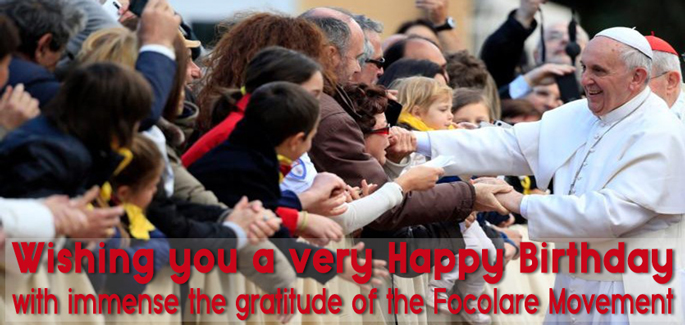
Dec 17, 2016 | Non categorizzato
 Use the social network to send your birthday greetings to Pope Francis:
Use the social network to send your birthday greetings to Pope Francis: Twitter: @pontifex Instagram: franciscus Ha*htag #Pontifex80
Dec 17, 2016 | Focolare Worldwide

Dec 16, 2016 | Focolare Worldwide
Sonia is from Slovacchia; she’s five and goes to nursery school. One day she told her mom that she had found a friend in school. “And what’s her name?” “I don’t know, she doesn’t speak. I approached her since I saw she was always alone and nobody wanted to play with her.” Sonia’s mom usually fetches her for lunch. But the teacher said: “Let her stay! She helps us with a gypsy girl who at first did not speak at all and now, thanks to her, has started to talk and cooperate with the others.” When she returned home her mother asked: “Did your friend say something to you?” “No, but she smiles when I tell her I like her.” Her mother remained silent. And the child said: “You know, love warms up each one of us.” 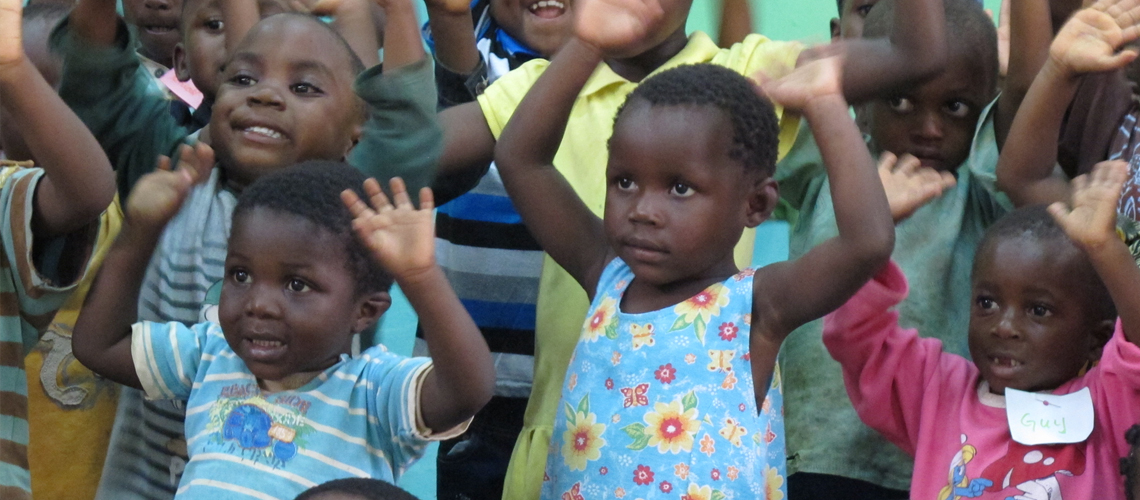 From Cameroon Kevin wrote: «One day in school during the break I asked one of my schoolmates if he had anything to eat. I was hungry and had nothing. He refused. The day after, I brought a piece of bread and when he came to ask me, I in turn refused. The next day, upon throwing the love dice it said: “Love your enemies.” I thought of that classmate. In school I tried to speak to him but he didn’t answer. So I sat in front of the house, waiting for him and when he came by, I called out to him, went up to him and when I asked why I shouldn’t speak to him anymore, he answered: “You refused to share with me the bread you had.” I immediately said, “Let’s make up!”and handed him some guava fruit I had with me. And so we started to talk and became friends again.»
From Cameroon Kevin wrote: «One day in school during the break I asked one of my schoolmates if he had anything to eat. I was hungry and had nothing. He refused. The day after, I brought a piece of bread and when he came to ask me, I in turn refused. The next day, upon throwing the love dice it said: “Love your enemies.” I thought of that classmate. In school I tried to speak to him but he didn’t answer. So I sat in front of the house, waiting for him and when he came by, I called out to him, went up to him and when I asked why I shouldn’t speak to him anymore, he answered: “You refused to share with me the bread you had.” I immediately said, “Let’s make up!”and handed him some guava fruit I had with me. And so we started to talk and became friends again.»  From Italy, Marco recounts: «One day at the nursery, the children made fun of me because I’m fat. I was sorry they did that and sometimes I cried. So I went to the Nun and instead of accusing them I told her of my sufferings. I understood that I had to forgive them and did so, because a Gen4 is one who, like Jesus, forgives and loves all.» Carmen lives in a slum at the outskirts of Mexico City. Often in the evening her uncles returns home drunk. Carmen is scared and hides herself. «But the other evening I didn’t hide – she says – I waited for him and helped him enter. I wasn’t scared because I knew that Our Lady takes care of me.» E Bartek, from Poland: «At the children’s party I received a gift from Teacher Ela, a chocolate bar and a lollipop. In my class there a girl called Asia, whom nobody likes. I remembered that in the morning upon throwing the dice, it said: “Love your enemies” and so I gave Asia the lollipop and half of the chocolate. She was surprised and thanked me, and then left. Now we have become big friends.» «In the centre of Naples (Italy), the “Baby Jesus” we make and offer to people is really selling quickly and many gather around the stand if only to say that they wish to join the initiative. A teacher, an agnostic, who has many problems, held Baby Jesus in her hands and looked at it: “This will be my Christmas!” A child ran home, emptied out his piggy bank and came with all his coins to buy his own Baby Jesus.» By the Gen4 Centres
From Italy, Marco recounts: «One day at the nursery, the children made fun of me because I’m fat. I was sorry they did that and sometimes I cried. So I went to the Nun and instead of accusing them I told her of my sufferings. I understood that I had to forgive them and did so, because a Gen4 is one who, like Jesus, forgives and loves all.» Carmen lives in a slum at the outskirts of Mexico City. Often in the evening her uncles returns home drunk. Carmen is scared and hides herself. «But the other evening I didn’t hide – she says – I waited for him and helped him enter. I wasn’t scared because I knew that Our Lady takes care of me.» E Bartek, from Poland: «At the children’s party I received a gift from Teacher Ela, a chocolate bar and a lollipop. In my class there a girl called Asia, whom nobody likes. I remembered that in the morning upon throwing the dice, it said: “Love your enemies” and so I gave Asia the lollipop and half of the chocolate. She was surprised and thanked me, and then left. Now we have become big friends.» «In the centre of Naples (Italy), the “Baby Jesus” we make and offer to people is really selling quickly and many gather around the stand if only to say that they wish to join the initiative. A teacher, an agnostic, who has many problems, held Baby Jesus in her hands and looked at it: “This will be my Christmas!” A child ran home, emptied out his piggy bank and came with all his coins to buy his own Baby Jesus.» By the Gen4 Centres
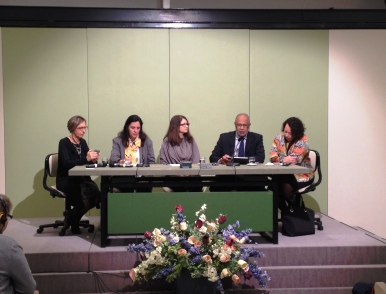
Dec 15, 2016 | Non categorizzato
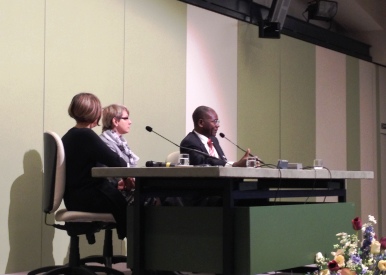 The objective of the convention was to «Review the various professions involved in the sector of justice – magistrates, lawyers, chancellors, university professors, prison staff, law enforcers – and discover the path to be pursued together, with the active participation of all the “actors” of the multifaceted relationships involved». The international congress promoted by Communion and Law (CeD) and New Humanity, was held last 26 and 27 November in Castel Gandolfo (Rome). The presence of a film director in a meeting on justice may have seemed to be quite unusual, but in his moving testimonial, Fernando Muraca succeeded in describing the experience of a prison staff in the Penal Institute for Minors of Catanzaro (Southern Italy). This was a documentary filmed entirely by the youths of the Institute, and the fruit of a commitment translated into a “cinema project” that transformed the young inmates not only into actors, but into people who have given a new meaning to their existence. Muraca is also the author and director of the film The land of Saints in which he faces the reality of the mafia’s organized crime. During the two days of intense dialogue among the various operators working in the field of justice, the discourse oftentimes stressed the concept of human dignity, and the intrinsic and inestimable value of every human being, in the conviction that also legal relationships can be lived in the spirit of fraternity and the quest for true justice.
The objective of the convention was to «Review the various professions involved in the sector of justice – magistrates, lawyers, chancellors, university professors, prison staff, law enforcers – and discover the path to be pursued together, with the active participation of all the “actors” of the multifaceted relationships involved». The international congress promoted by Communion and Law (CeD) and New Humanity, was held last 26 and 27 November in Castel Gandolfo (Rome). The presence of a film director in a meeting on justice may have seemed to be quite unusual, but in his moving testimonial, Fernando Muraca succeeded in describing the experience of a prison staff in the Penal Institute for Minors of Catanzaro (Southern Italy). This was a documentary filmed entirely by the youths of the Institute, and the fruit of a commitment translated into a “cinema project” that transformed the young inmates not only into actors, but into people who have given a new meaning to their existence. Muraca is also the author and director of the film The land of Saints in which he faces the reality of the mafia’s organized crime. During the two days of intense dialogue among the various operators working in the field of justice, the discourse oftentimes stressed the concept of human dignity, and the intrinsic and inestimable value of every human being, in the conviction that also legal relationships can be lived in the spirit of fraternity and the quest for true justice.  The rich and varied programme also deepened particularly current themes such as the protection of unaccompanied minors and political asylum applicants, relationship with jailees and protection of the victims. Dr. David Shaeed (magistrate in Indianapolis), Atty. Alba Doto (Boston), Atty. Endy Moraes (Fordham University, New York), and Dr. Luciane Barzotto Cardoso (magistrate of the Federal Court of Porto Alegre, Brazil), reviewed the current laws in various parts of the world, and elaborated the methods of pursuing the research and study paths initiated for some years now, also enriched by concrete implementations. Among the speeches was the video presentation of Maria Voce, Focolare President, the first woman lawyer of the Court of Cosenza (Italy), entitled Justice and the common good in the perspective of universal brotherhood. In a passage of her speech, Maria Voce explained: «Today, in the light of this “piecemeal World War III,” the tragic destructions, wiping out of every right and respect for peoples living in war territories, and closure of the borders to migrants, fraternity is the only answer, and the commitment we are called to give is to build it even with small actions, infinitesimal drops that may, however, enlighten the night.». The working sessions according to professional sectors evidenced the need to facilitate a confrontation within the various professions without losing sight of the entirety, to develop a dialogue among the operators and share know-how and experiences of the various activities developed in the field of Law. A significant note was the presence of the youth and the deep involvement of students. One of the most heartfelt testimonies was that of Roberto (former convict), and Alfonso, who has been working for some years in the Rebibbia Jail (Rome) to give a concrete hand to the families of the prisoners. Roberto did not hide his emotions in presenting his experience before such a qualified public, and ended by requesting the civil community to facilitate and promote the difficult employment and social reinsertion of ex-convicts. The next event will be for the youth in the Summer School 2017. Patrizia Mazzola
The rich and varied programme also deepened particularly current themes such as the protection of unaccompanied minors and political asylum applicants, relationship with jailees and protection of the victims. Dr. David Shaeed (magistrate in Indianapolis), Atty. Alba Doto (Boston), Atty. Endy Moraes (Fordham University, New York), and Dr. Luciane Barzotto Cardoso (magistrate of the Federal Court of Porto Alegre, Brazil), reviewed the current laws in various parts of the world, and elaborated the methods of pursuing the research and study paths initiated for some years now, also enriched by concrete implementations. Among the speeches was the video presentation of Maria Voce, Focolare President, the first woman lawyer of the Court of Cosenza (Italy), entitled Justice and the common good in the perspective of universal brotherhood. In a passage of her speech, Maria Voce explained: «Today, in the light of this “piecemeal World War III,” the tragic destructions, wiping out of every right and respect for peoples living in war territories, and closure of the borders to migrants, fraternity is the only answer, and the commitment we are called to give is to build it even with small actions, infinitesimal drops that may, however, enlighten the night.». The working sessions according to professional sectors evidenced the need to facilitate a confrontation within the various professions without losing sight of the entirety, to develop a dialogue among the operators and share know-how and experiences of the various activities developed in the field of Law. A significant note was the presence of the youth and the deep involvement of students. One of the most heartfelt testimonies was that of Roberto (former convict), and Alfonso, who has been working for some years in the Rebibbia Jail (Rome) to give a concrete hand to the families of the prisoners. Roberto did not hide his emotions in presenting his experience before such a qualified public, and ended by requesting the civil community to facilitate and promote the difficult employment and social reinsertion of ex-convicts. The next event will be for the youth in the Summer School 2017. Patrizia Mazzola
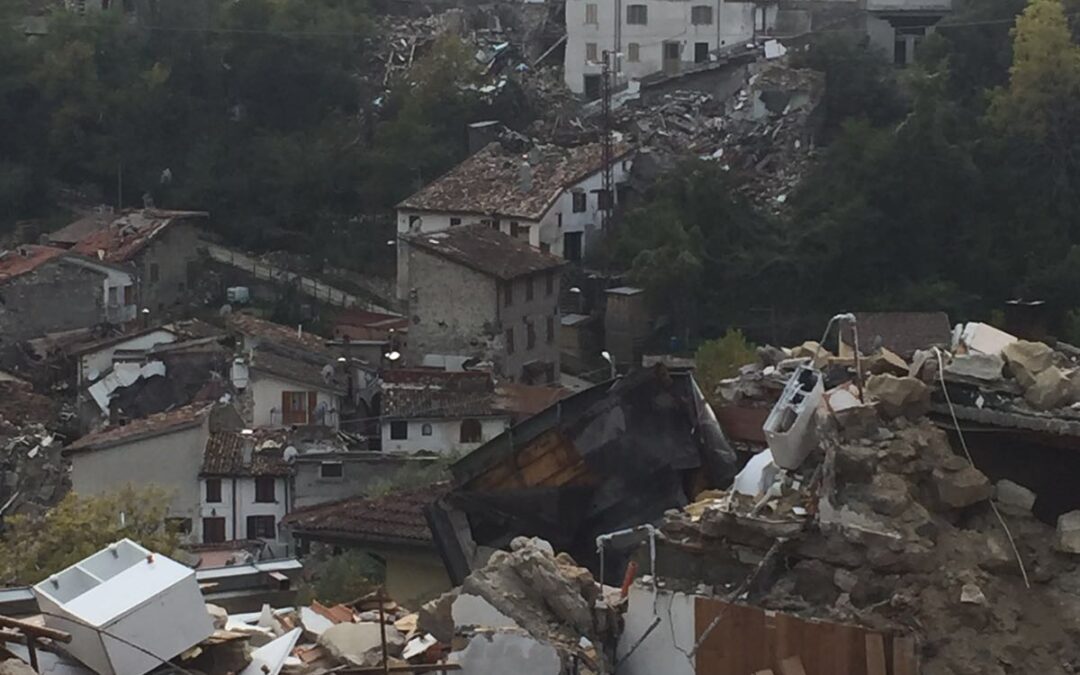
Dec 14, 2016 | Focolare Worldwide
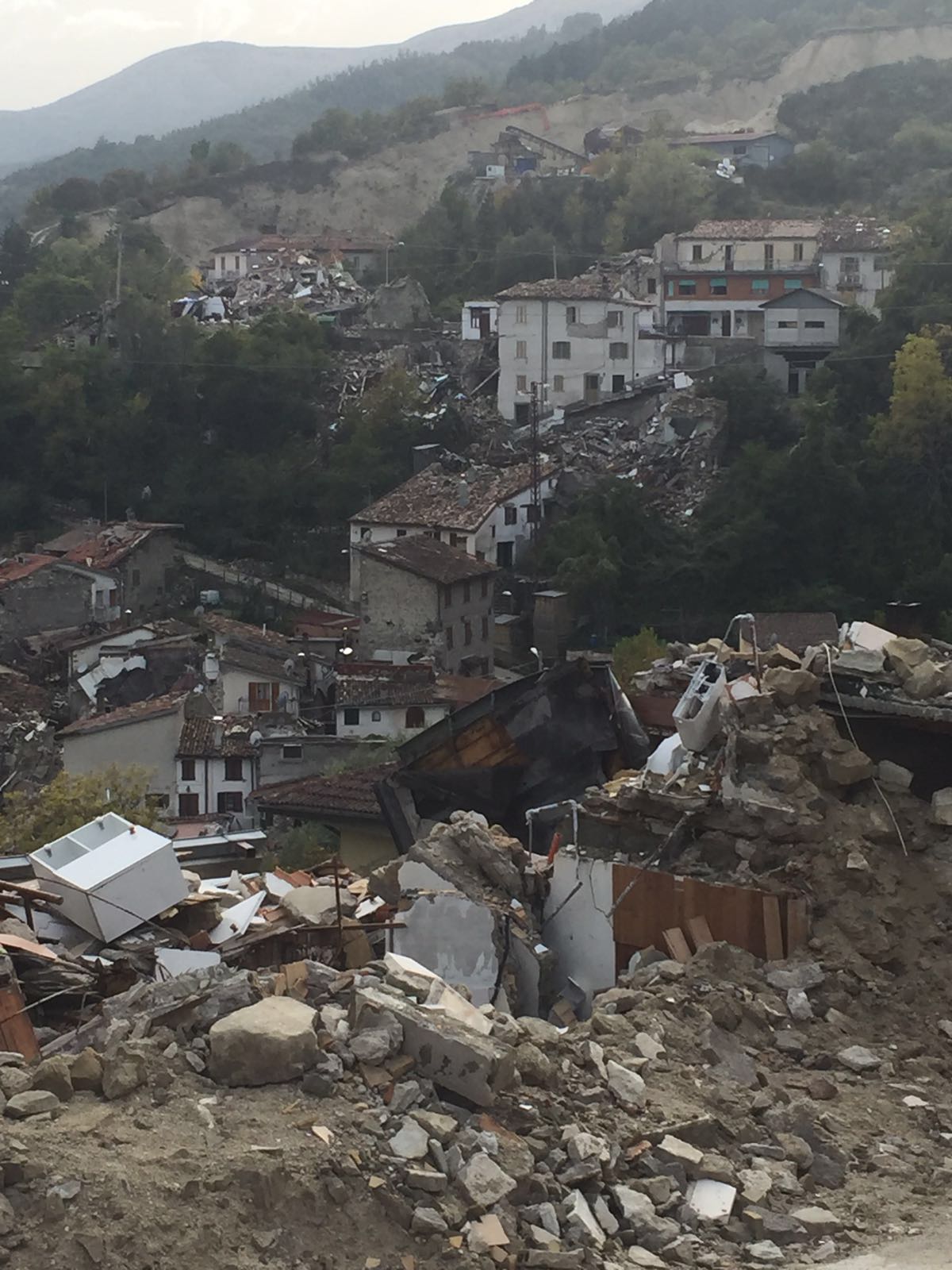 Christmas is also on the way for the displaced victims of the earthquake in Central Italy. We know that you are working in during this after phase of the earthquake. What are you doing? FrancescoTortorella explains: “AMU and AFN have coordinated with the Focolare Movement in Italy, to carry ahead their work during the after phase of the earthquake. Since August, there have been three site surveys in the regions that were hit, to examine the possible ways of intervening. The first intervention that we identified was that of supporting the families that run small agricultural businesses, along with the farm regions that suffered damage.” After a feasibility study, you came up with the comprehensive project. What is it? “We called it RImPresa and it consists of two activities,” Paola Iacovone explains. “The first activity, which will be carried out by the Abbraccio Planetario from Castelli Romani, Italy, and the Bread and Fish Foundation from Ascoli Piceno, Italy, will consist of 4 joint purchasing groups which, through a web portal, will purchase products from the small businesses that were hit by the earthquake, which will provide long-term support to entire families.” There are also many agricultural businesses that were damaged by the earthquake and are finding it hard to start up again. Are you also working on this front? “Yes. The Italian Associazione Italiana Imprenditori per un Economia di Comunione (AIPEC), which we work with is promoting the second activity of RImPresa,” Tortorella adds, “which is only concerned with supporting families with small agricultural and breeding businesses, by providing machinery or small infrastructures. All of it is carried out in coordination with the Italian Civil Protection Agency that has the full picture of the businesses that were damaged and of the assistance that is distributed.” “We’re a small drop in the ocean along with many others,” Paola concludes. “We’ve received many contributions up until now part of which had been destined to help finance the RImPresa Project. There are still funds to carry out other projects that will begin in the next few months. The contributions continue to arrive, so this fund will probably grow in the next few weeks.” Best wishes for a happy Christmas! Gustavo Clariá To collaborate:
Christmas is also on the way for the displaced victims of the earthquake in Central Italy. We know that you are working in during this after phase of the earthquake. What are you doing? FrancescoTortorella explains: “AMU and AFN have coordinated with the Focolare Movement in Italy, to carry ahead their work during the after phase of the earthquake. Since August, there have been three site surveys in the regions that were hit, to examine the possible ways of intervening. The first intervention that we identified was that of supporting the families that run small agricultural businesses, along with the farm regions that suffered damage.” After a feasibility study, you came up with the comprehensive project. What is it? “We called it RImPresa and it consists of two activities,” Paola Iacovone explains. “The first activity, which will be carried out by the Abbraccio Planetario from Castelli Romani, Italy, and the Bread and Fish Foundation from Ascoli Piceno, Italy, will consist of 4 joint purchasing groups which, through a web portal, will purchase products from the small businesses that were hit by the earthquake, which will provide long-term support to entire families.” There are also many agricultural businesses that were damaged by the earthquake and are finding it hard to start up again. Are you also working on this front? “Yes. The Italian Associazione Italiana Imprenditori per un Economia di Comunione (AIPEC), which we work with is promoting the second activity of RImPresa,” Tortorella adds, “which is only concerned with supporting families with small agricultural and breeding businesses, by providing machinery or small infrastructures. All of it is carried out in coordination with the Italian Civil Protection Agency that has the full picture of the businesses that were damaged and of the assistance that is distributed.” “We’re a small drop in the ocean along with many others,” Paola concludes. “We’ve received many contributions up until now part of which had been destined to help finance the RImPresa Project. There are still funds to carry out other projects that will begin in the next few months. The contributions continue to arrive, so this fund will probably grow in the next few weeks.” Best wishes for a happy Christmas! Gustavo Clariá To collaborate:
| Azione per un Mondo Unito ONLUS (AMU) |
Azione per Famiglie Nuove ONLUS (AFN) |
| IBAN: IT16 G050 1803 2000 0000 0120 434 at Banca Popolare Etica |
IBAN: IT55 K033 5901 6001 0000 0001 060 at Banca Prossima |
| Codice SWIFT/BIC: CCRTIT2184D |
Codice SWIFT/BIC: BCITITMX |
| CAUSE : Emergenza terremoto (Italia) |
| All contributions that are deposited in these two accounts for this cause will be jointly administered by AMU and AFN. Except for cash donations, Italian taxpayers can get deductions and allowances from income, in accordance with the regulations for non-profit organizations, to up to 10% of income and the € 70,000.00 annual limit. Tax benefits are provided in many European Union countries and other countries of the world in accordance with local regulations. |
Dec 13, 2016 | Non categorizzato
Upon receiving the news of the death of Bishop Javier Echevarría, prelate of the Opus Dei, yesterday 12 December, the Focolare Movement conveys its heartfelt condolences. Most grateful for his life spent at the service of the Church, Bishop Echevarría, the second successor of St. Josemaría Escribá de Balaguer, founder of the Opus Dei, the Focolare Movement is particularly united in prayer and friendship with the Opus Dei family worldwide.
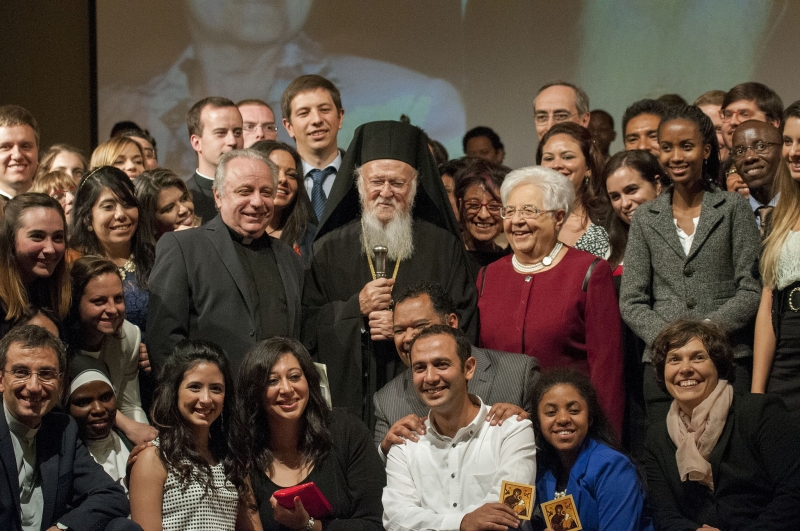
Dec 13, 2016 | Non categorizzato
 “Your Holiness, the Focolare community of Bari salutes you with great affection! We are so gladdened by your visit to our city, which is a bridge between East and West and has a special ecumenical calling. Your presence encourages us to work even more at the service of the full and visible unity among Christians, and for the protection of Creation. The charism of unity that you love so much, spurs us on to work in our own environments as apostles of dialogue who are aware that only unity, love and brotherhood will be able to respond to the challenges of today’s world.” This was the welcoming message from the local Focolare community in Bari as it welcomed the Ecumenical Patriarch Bartholomew on his December 5-6 visit to their city for the feast day of St. Nicholas. It is a “highly significant ecumenical event,” said representatives of the diocese, “that puts the Church of Bari-Bitonto on the map and contributes to dialogue between the Catholic Church and the Orthodox Church.” On December 5th, at the Basilica of St Nicholas the Patriarch gave the opening address for the beginning of the 2016-2017 academic school year of the Pugliese School of Theology, and received the Saint Nicholas Prize from the Ecumenical Institute. He had been awarded the Prize in recognition of his 25 years of ecumenical efforts as a “patient and courageous artisan of the culture of communion.” Pope Francis sent a congratulatory message that was read during the award ceremony in which he praised the efforts of the Patriarch for “the promotion of ever greater communion among those who believe in Christ.” In his keynote address entitled, Adriatic and Ionian Seas of Communion, Bartholomew reflected on the idea of communion, beginning from its theological significance as koinonia, as a “common participation of grace, love and communion in the life of God, that becomes experience itself of ‘being in relationship’.” He also remembered the Great Council of Crete held in June 2016 when “Our Holy Orthodox Church manifested its “communion” [emphasising the word] by unanimous decision of all the Patriarchs of the auto-cephalous Orthodox Churches.” He also underscored the need for an economy of solidarity, saying that “there needs to be an economy of communion which is all embracing and which does not create social discontent in the host country.” On December 6th, at the conclusion of the solemn Eucharistic celebration, presided by Archbishop Franco Cacucci in the same Basilica, Patriarch Bartholomew gave a second talk: “We have also come as pilgrims to the tomb of this great saint,” he said, “to invoke his intercession, his prayer and his support in our Patriarchal service, to thank God with him, for our 25 years of service to the unity of the Church, on St Andrew’s Throne; but also to be strong witnesses to the need of encounter among the disciples of Christ so that the world may believe, and we may one day not so far away, break the Bread of Life together and drink from the same Chalice of Salvation.” Fausta Giardina and Roberto Lago, from the Focolare in Puglia, write: “We’re breathing in a beautiful ecumenical atmosphere in our city during these days. The Patriarch’s visit and the special celebrations have been heartfelt by everyone.” The Focolare’s friendship with the Patriarch is longstanding. On October 26, 2016, Sophia University Institute, Loppiano, conferred its first Honorary Doctorate in the Culture of Unity to Patriarch Bartholomew. On that occasion he said: “One of the ideals of the Focolare Movement is the unity of the Church. Chiara Lubich and her collaborators did much work. She made 23 visits to [Patriarch] Athenagoras in Constantinople. Then she began to visit Dimitrios and then me. In 2008, I visited Chiara at the Gimelli Hospital a few days before her death. I’m sure that she’s with us this evening, with her spiritual presence and with her prayer. She rejoices with us and prays for the unity between our Churches.”
“Your Holiness, the Focolare community of Bari salutes you with great affection! We are so gladdened by your visit to our city, which is a bridge between East and West and has a special ecumenical calling. Your presence encourages us to work even more at the service of the full and visible unity among Christians, and for the protection of Creation. The charism of unity that you love so much, spurs us on to work in our own environments as apostles of dialogue who are aware that only unity, love and brotherhood will be able to respond to the challenges of today’s world.” This was the welcoming message from the local Focolare community in Bari as it welcomed the Ecumenical Patriarch Bartholomew on his December 5-6 visit to their city for the feast day of St. Nicholas. It is a “highly significant ecumenical event,” said representatives of the diocese, “that puts the Church of Bari-Bitonto on the map and contributes to dialogue between the Catholic Church and the Orthodox Church.” On December 5th, at the Basilica of St Nicholas the Patriarch gave the opening address for the beginning of the 2016-2017 academic school year of the Pugliese School of Theology, and received the Saint Nicholas Prize from the Ecumenical Institute. He had been awarded the Prize in recognition of his 25 years of ecumenical efforts as a “patient and courageous artisan of the culture of communion.” Pope Francis sent a congratulatory message that was read during the award ceremony in which he praised the efforts of the Patriarch for “the promotion of ever greater communion among those who believe in Christ.” In his keynote address entitled, Adriatic and Ionian Seas of Communion, Bartholomew reflected on the idea of communion, beginning from its theological significance as koinonia, as a “common participation of grace, love and communion in the life of God, that becomes experience itself of ‘being in relationship’.” He also remembered the Great Council of Crete held in June 2016 when “Our Holy Orthodox Church manifested its “communion” [emphasising the word] by unanimous decision of all the Patriarchs of the auto-cephalous Orthodox Churches.” He also underscored the need for an economy of solidarity, saying that “there needs to be an economy of communion which is all embracing and which does not create social discontent in the host country.” On December 6th, at the conclusion of the solemn Eucharistic celebration, presided by Archbishop Franco Cacucci in the same Basilica, Patriarch Bartholomew gave a second talk: “We have also come as pilgrims to the tomb of this great saint,” he said, “to invoke his intercession, his prayer and his support in our Patriarchal service, to thank God with him, for our 25 years of service to the unity of the Church, on St Andrew’s Throne; but also to be strong witnesses to the need of encounter among the disciples of Christ so that the world may believe, and we may one day not so far away, break the Bread of Life together and drink from the same Chalice of Salvation.” Fausta Giardina and Roberto Lago, from the Focolare in Puglia, write: “We’re breathing in a beautiful ecumenical atmosphere in our city during these days. The Patriarch’s visit and the special celebrations have been heartfelt by everyone.” The Focolare’s friendship with the Patriarch is longstanding. On October 26, 2016, Sophia University Institute, Loppiano, conferred its first Honorary Doctorate in the Culture of Unity to Patriarch Bartholomew. On that occasion he said: “One of the ideals of the Focolare Movement is the unity of the Church. Chiara Lubich and her collaborators did much work. She made 23 visits to [Patriarch] Athenagoras in Constantinople. Then she began to visit Dimitrios and then me. In 2008, I visited Chiara at the Gimelli Hospital a few days before her death. I’m sure that she’s with us this evening, with her spiritual presence and with her prayer. She rejoices with us and prays for the unity between our Churches.”
Gustavo Clariá
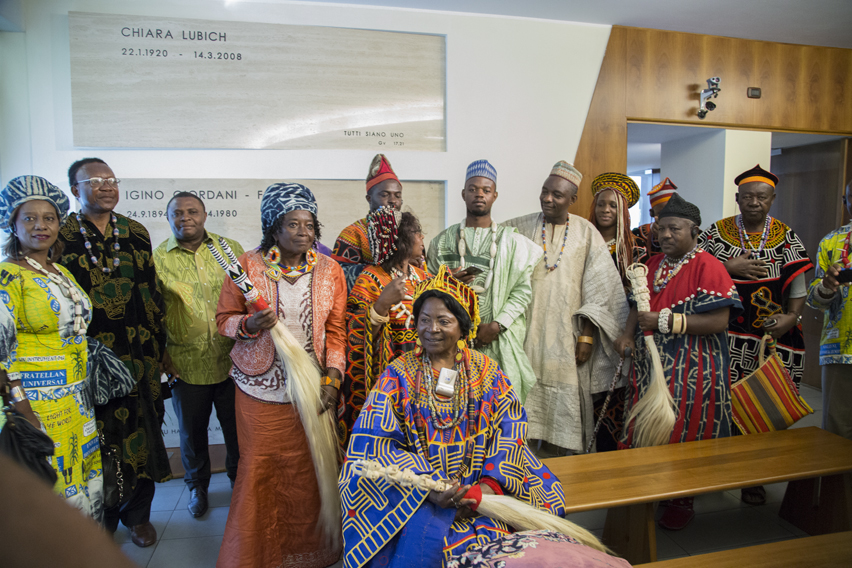
Dec 12, 2016 | Focolare Worldwide
 “Through the Focolare Movement, God has visited the Bangwa people (…).They have lived the pact of mutual love with the Bangwa people and taught them the spirituality of unity and universal brotherhood (…).They have reduced the infant mortality within these years from close to 90% to almost zero; they have tirelessly worked hard to eliminate the deadly Tsetse Fly that made Fontem look like the valley of death; thousands of Lebialem people would not have had a good education without them; good health facilities have been at our door steps all these years (…).Now is the time to celebrate the love of God for all the Lebialem people”. These quotes are taken from the letter written by Mgsr. Andrew Nkea, Bishop of Mamfe to announce the year 2016 as a Jubilee year of thanksgiving to God for the arrival of the Focolare Movement amongst the Bangwa people. In this letter, one finds a prayer to be recited daily together the Bishop’s words that highlight the most important moments of these 50 years of history and recall the protagonists and all those who gave their lives towards them. It also expresses the feelings of the Fons – the kings of the territories of this region -,of persons holding positions of responsibility and of the entire population.
“Through the Focolare Movement, God has visited the Bangwa people (…).They have lived the pact of mutual love with the Bangwa people and taught them the spirituality of unity and universal brotherhood (…).They have reduced the infant mortality within these years from close to 90% to almost zero; they have tirelessly worked hard to eliminate the deadly Tsetse Fly that made Fontem look like the valley of death; thousands of Lebialem people would not have had a good education without them; good health facilities have been at our door steps all these years (…).Now is the time to celebrate the love of God for all the Lebialem people”. These quotes are taken from the letter written by Mgsr. Andrew Nkea, Bishop of Mamfe to announce the year 2016 as a Jubilee year of thanksgiving to God for the arrival of the Focolare Movement amongst the Bangwa people. In this letter, one finds a prayer to be recited daily together the Bishop’s words that highlight the most important moments of these 50 years of history and recall the protagonists and all those who gave their lives towards them. It also expresses the feelings of the Fons – the kings of the territories of this region -,of persons holding positions of responsibility and of the entire population. 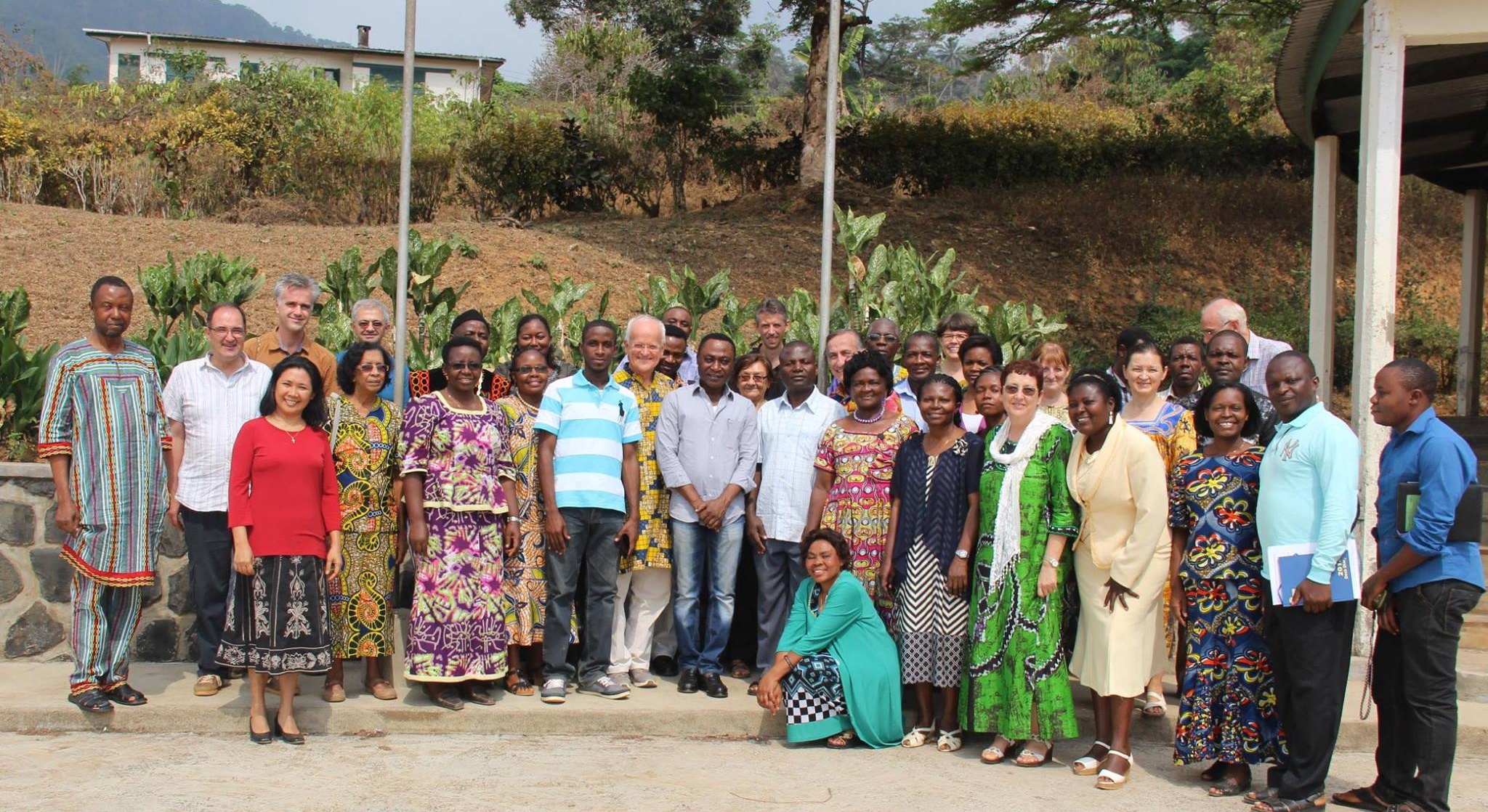 The first focolarini doctors arrived in Fontem in 1966. The state of emergency of the Bangwa people became a priority for the whole Focolare Movement. Chiara Lubich paid her first visit to Fontem that same year and she was given a great welcome by the king, Fon Defang, important personalities and the whole population. She visited Fontem another two times. In May 2000, when she addressed all the Bangwa, gathered in the wide open space in front of the Fon’s palace, she said: “I feel that I cannot leave you without having made a solemn pact with you. A strong and binding pact of mutual love. It is a sort of oath by which we promise to be always fully at peace with one another and to be always ready to make peace and start again whenever our promise is broken”. This jubilee year will come to its end with a solemn celebration to be held from the 14 to 17 December 2016. The Fons and other heads of institutions have been actively involved in the preparation of this celebration, which was presented to the Prime Minister, Philémon Yang at Yaoundé last October. Since then, it is being recognized as a national event. The programme includes: the success of Our Lady Seat of Wisdom College, which, with 500 students per year, is among the best five pre-university institutions in the anglophone Cameroonian system; life and work experiences of the Focolare Movement in Fontem; an International Conference on Interreligious Dialogue between Christianity and the African Traditional Religion, in these last 50 experience among the Bangwa people. Today, the inculturation of Christianity seems to have become more obvious. Martin Nkafu, the African philosopher and theologian, director of the department of Human and Social Sciences in the International Research Area at the Pontifical Lateran University in Rome, says: “Christianity has not changed the people’s mentality; a Bangwa who adheres to Christ keeps his personality, his culture, and has an integrated vision of reality; and as Pope John Paul II said in Nairobi in 1982, this allows him to be authentically African and deeply Christian”.
The first focolarini doctors arrived in Fontem in 1966. The state of emergency of the Bangwa people became a priority for the whole Focolare Movement. Chiara Lubich paid her first visit to Fontem that same year and she was given a great welcome by the king, Fon Defang, important personalities and the whole population. She visited Fontem another two times. In May 2000, when she addressed all the Bangwa, gathered in the wide open space in front of the Fon’s palace, she said: “I feel that I cannot leave you without having made a solemn pact with you. A strong and binding pact of mutual love. It is a sort of oath by which we promise to be always fully at peace with one another and to be always ready to make peace and start again whenever our promise is broken”. This jubilee year will come to its end with a solemn celebration to be held from the 14 to 17 December 2016. The Fons and other heads of institutions have been actively involved in the preparation of this celebration, which was presented to the Prime Minister, Philémon Yang at Yaoundé last October. Since then, it is being recognized as a national event. The programme includes: the success of Our Lady Seat of Wisdom College, which, with 500 students per year, is among the best five pre-university institutions in the anglophone Cameroonian system; life and work experiences of the Focolare Movement in Fontem; an International Conference on Interreligious Dialogue between Christianity and the African Traditional Religion, in these last 50 experience among the Bangwa people. Today, the inculturation of Christianity seems to have become more obvious. Martin Nkafu, the African philosopher and theologian, director of the department of Human and Social Sciences in the International Research Area at the Pontifical Lateran University in Rome, says: “Christianity has not changed the people’s mentality; a Bangwa who adheres to Christ keeps his personality, his culture, and has an integrated vision of reality; and as Pope John Paul II said in Nairobi in 1982, this allows him to be authentically African and deeply Christian”. Among the initiatives achieved during this year, one finds the Fons’ pilgrimage to Rome. They came last September to celebrate the Jubilee of Mercy with Pope Francis and to visit the places of Mafua Ndem, “the queen sent by God”, as Fon Lucas Njifua of Fontem called Chiara Lubich on her last visit to Cameroon. A competition, entitled “God’s intervention in the history and life of the Nweh Mundani people” has also been organized and promoted throughout the year among students in all primary and secondary schools. 4000 people were involved in this project, which included poetry, songs, literary compositions and quizes; 700 students from 21 schools participated through their various works. This event mobilizes and brings together even the Bangwa people who during the last years left Cameroon. A Development Commission, with members in Cameroon and in other countries, has started to dialogue with State bodies in view of concrete actions regarding education, health, youth and women’s status. This 50th anniversary celebration is being followed by the Focolare Community world-wide. The president, Maria Voce has closely accompanied the preparation for it, while Jesús Morán and the Central council members responsible for Africa will be present in Fontem. Sources: Press releases (SIF)
Among the initiatives achieved during this year, one finds the Fons’ pilgrimage to Rome. They came last September to celebrate the Jubilee of Mercy with Pope Francis and to visit the places of Mafua Ndem, “the queen sent by God”, as Fon Lucas Njifua of Fontem called Chiara Lubich on her last visit to Cameroon. A competition, entitled “God’s intervention in the history and life of the Nweh Mundani people” has also been organized and promoted throughout the year among students in all primary and secondary schools. 4000 people were involved in this project, which included poetry, songs, literary compositions and quizes; 700 students from 21 schools participated through their various works. This event mobilizes and brings together even the Bangwa people who during the last years left Cameroon. A Development Commission, with members in Cameroon and in other countries, has started to dialogue with State bodies in view of concrete actions regarding education, health, youth and women’s status. This 50th anniversary celebration is being followed by the Focolare Community world-wide. The president, Maria Voce has closely accompanied the preparation for it, while Jesús Morán and the Central council members responsible for Africa will be present in Fontem. Sources: Press releases (SIF)
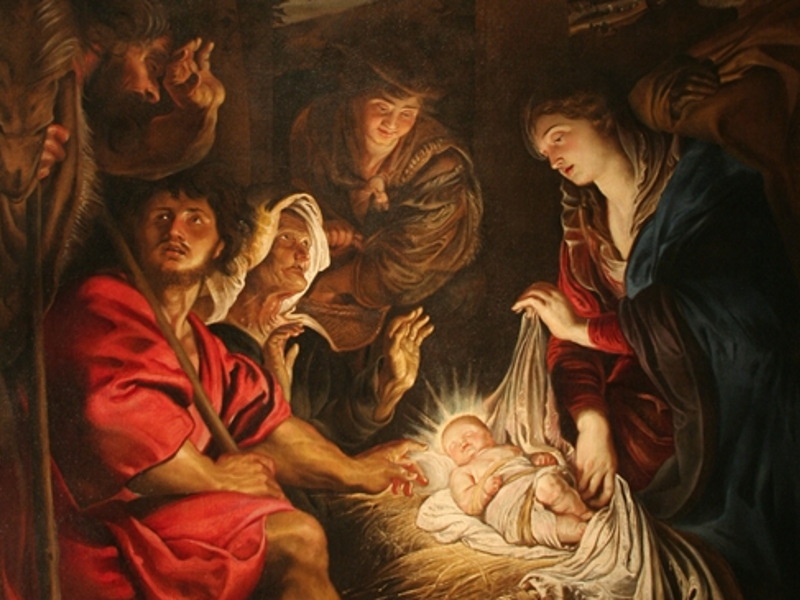
Dec 11, 2016 | Non categorizzato
 For the ancients Christ was a king. But the real Christ was outside normal schemes. He was born in a stable among shephereds and beasts, and his mother was the daughter of peasants. Whereas other sovereigns loomed from above, stepping down from carriages and thrones to rule, he came from below, from the lowest class, to serve. He was under everyone so that he could be the universal servant: His kingliness consisted of service. Everything is simple and enchanting as a fairy tale in this birth of a boy child in the middle of a windy night, in the middle of the nights of time. And everything is tragic and revolutionary, because this birth foreshadows a scaffold. This son of the king, son of God, comes forth from humble beings in a makeshift shelter, like some refugee pushed away by farthing folk and unnoticed by the wretched: this is by no means a new revolution. When the Saviour appeared, a great light lit up the night.The night remains, but so does the light. It’s always Christmas in the Christian world, and Christmas brings joy amidst tears still today. When God descends among us, we re-ascend to God; He humanizes and we are divinized. The meeting point is His heart. Jesus was born in a stall to demonstrate that he could also be born in our heart that is sometimes a rather squallid place. And whenever he’s born in our heart the angels rise to sing as they did over the stable that night while the moon shone in the night and peace rained down on the earth. In a similar way, the Word – Reason – incarnates among us today and can transform a stall into a Heavenly anti-chamber. Igino Giordani Le Feste S.E.I. (1954) p. 36.
For the ancients Christ was a king. But the real Christ was outside normal schemes. He was born in a stable among shephereds and beasts, and his mother was the daughter of peasants. Whereas other sovereigns loomed from above, stepping down from carriages and thrones to rule, he came from below, from the lowest class, to serve. He was under everyone so that he could be the universal servant: His kingliness consisted of service. Everything is simple and enchanting as a fairy tale in this birth of a boy child in the middle of a windy night, in the middle of the nights of time. And everything is tragic and revolutionary, because this birth foreshadows a scaffold. This son of the king, son of God, comes forth from humble beings in a makeshift shelter, like some refugee pushed away by farthing folk and unnoticed by the wretched: this is by no means a new revolution. When the Saviour appeared, a great light lit up the night.The night remains, but so does the light. It’s always Christmas in the Christian world, and Christmas brings joy amidst tears still today. When God descends among us, we re-ascend to God; He humanizes and we are divinized. The meeting point is His heart. Jesus was born in a stall to demonstrate that he could also be born in our heart that is sometimes a rather squallid place. And whenever he’s born in our heart the angels rise to sing as they did over the stable that night while the moon shone in the night and peace rained down on the earth. In a similar way, the Word – Reason – incarnates among us today and can transform a stall into a Heavenly anti-chamber. Igino Giordani Le Feste S.E.I. (1954) p. 36.
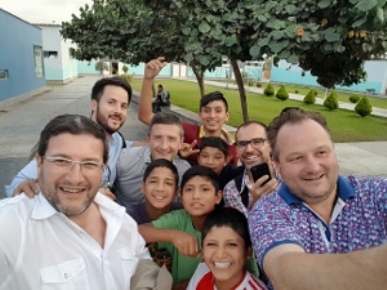
Dec 9, 2016 | Non categorizzato
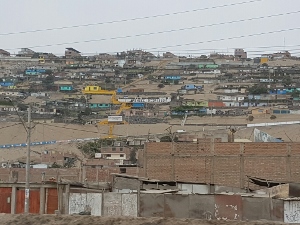 Lying at the outskirts of Lima is a district that takes its name from the pre-Inca Sanctuary built in Pachacamac (in the quecha language meaning ”god who created the earth”). «We got here with the objective of starting up a business run according to the practices of the Economy of Communion (EoC), the profits of which are able to support a rehab center for children saved from the streets and with drug addiction problems, » recounted Germán Jorge of the EoC Argentina. The Mundo Libre Institute is the only one of its kind existing in Perù today. It has been awarded international recognition for the professionalism with which it has performed its activities, but despite the possibility to host 100 children, today it supports only 40 due to lack of resources. Its foundress, Marilú Gonzalez Posada, has lived for 32 years with this objective. Her great concern regards the Institute’s sustainability, a problem common to all the social organizations that are unable to survive only on the generosity of people and international cooperation. One of the laboratories of Mundo Libre produces typical Peruvian sweets: the “chocotejas.” «The business plan we are working on, specifically involves this project to be implemented at the end of 2017, together with Solidarpole (which promotes different solidarity business projects and has proposed that the Economy of Communion be the choice) and AMU Luxembourg (that offered finances for the renovation of a barn and purchase of machinery). We now have to coordinate the resources. It is a challenge to EoC that has a lot to offer, and a communion which is not “imposed” but “generated” in response to a first free decision. This is what we have tried to do with each person we encounter along the way this week.». When the armed Spanish arrived on horseback in these lands to conquer the Pachacamac Totem – the indios who had never seen horses before, believed they were the gods who had come to replace their god, and did not counter with any resistance. History has left its mark on their culture. «We could see this in the relational difficulties. So our main commitment was to give room to all, in the effort to break the logic of the “European conquistador” (or the descendants of these), and of passive and underdog aborigines. As the days passed, and on the basis of relationships of trust which slowly developed, we started to overcome these relational dynamics and build new rapports of reciprocity.»
Lying at the outskirts of Lima is a district that takes its name from the pre-Inca Sanctuary built in Pachacamac (in the quecha language meaning ”god who created the earth”). «We got here with the objective of starting up a business run according to the practices of the Economy of Communion (EoC), the profits of which are able to support a rehab center for children saved from the streets and with drug addiction problems, » recounted Germán Jorge of the EoC Argentina. The Mundo Libre Institute is the only one of its kind existing in Perù today. It has been awarded international recognition for the professionalism with which it has performed its activities, but despite the possibility to host 100 children, today it supports only 40 due to lack of resources. Its foundress, Marilú Gonzalez Posada, has lived for 32 years with this objective. Her great concern regards the Institute’s sustainability, a problem common to all the social organizations that are unable to survive only on the generosity of people and international cooperation. One of the laboratories of Mundo Libre produces typical Peruvian sweets: the “chocotejas.” «The business plan we are working on, specifically involves this project to be implemented at the end of 2017, together with Solidarpole (which promotes different solidarity business projects and has proposed that the Economy of Communion be the choice) and AMU Luxembourg (that offered finances for the renovation of a barn and purchase of machinery). We now have to coordinate the resources. It is a challenge to EoC that has a lot to offer, and a communion which is not “imposed” but “generated” in response to a first free decision. This is what we have tried to do with each person we encounter along the way this week.». When the armed Spanish arrived on horseback in these lands to conquer the Pachacamac Totem – the indios who had never seen horses before, believed they were the gods who had come to replace their god, and did not counter with any resistance. History has left its mark on their culture. «We could see this in the relational difficulties. So our main commitment was to give room to all, in the effort to break the logic of the “European conquistador” (or the descendants of these), and of passive and underdog aborigines. As the days passed, and on the basis of relationships of trust which slowly developed, we started to overcome these relational dynamics and build new rapports of reciprocity.» The «Formulation of the “Business administration guidelines” helped in setting the person at the core of economic activities, without foregoing professionalism and the efficiency necessary to reach the targets. After passing days together, our interlocutors at the Mundo Libre Institute said that they already felt part of the Economy of Communion project, which in a sense, they had already unconsciously put into practice and which they now want to propose to their own employees and also educate the youth in these principles. ‘This is our challenge in 2017’». «The horses not originating from Perù, had to develop the capacity to walk on sand in these desert zones. Throughout these 500 years an equine breed has developed with the characteristic concentric-circles gait which allows them to move freely in these environments. We are like the first horses and are making a big effort to learn how to live the “culture of giving” in communion. But if we develop these abilities, many others will slowly follow in many parts of the globe. They will carry this new culture in their blood, and will succeed in changing the world.» Gustavo Clariá
The «Formulation of the “Business administration guidelines” helped in setting the person at the core of economic activities, without foregoing professionalism and the efficiency necessary to reach the targets. After passing days together, our interlocutors at the Mundo Libre Institute said that they already felt part of the Economy of Communion project, which in a sense, they had already unconsciously put into practice and which they now want to propose to their own employees and also educate the youth in these principles. ‘This is our challenge in 2017’». «The horses not originating from Perù, had to develop the capacity to walk on sand in these desert zones. Throughout these 500 years an equine breed has developed with the characteristic concentric-circles gait which allows them to move freely in these environments. We are like the first horses and are making a big effort to learn how to live the “culture of giving” in communion. But if we develop these abilities, many others will slowly follow in many parts of the globe. They will carry this new culture in their blood, and will succeed in changing the world.» Gustavo Clariá
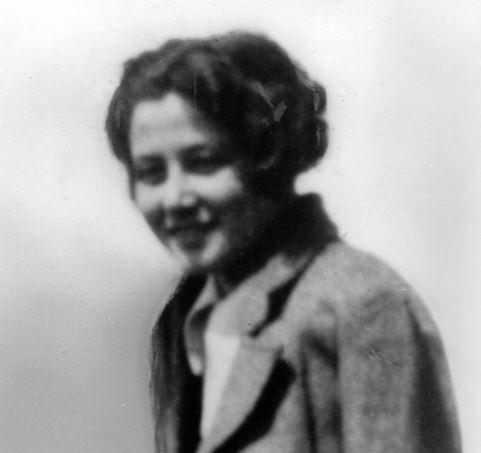
Dec 7, 2016 | Non categorizzato
 “I was 19 years old and had a great thirst for God.” Her thirst was so strong that every time she met a priest she would tell him: “Talk to me about God.” Urged by that thirst she intended to study at the Catholic University, but since her family did not have the financial means, she participated in a lottery to obtain a scholarship, but she was one point short. “I remember the cry I had, because I was thinking that at the Catholic University they would talk about God. And I recall that in the midst of that cry as I sat in the lounge with my mother, I heard someone inside me say: “I will be your Teacher.” A few months later she went to Loreto with a young women’s group that she belonged to. There is a very large shrine located there in central Italy which is said to contain the little house of Nazareth where the Holy Family lived. Chiara recounts that when she stepped into that little house, something extraordinary happened within her. “I was overcome with emotion, such great emotion that it seemed like was being crushed by the Divine that I contemplated all around me. The idea had come alive inside me that Jesus had perhaps walked over there, that those walls had listened to the echo of Mary’s songs, Joseph, the Annunciation, the angel…. the feeling was so alive that all I could do was cry.” That cry was provoked “by the weight of the Divine that crushed down on me.” She said that during the days in Loreto, “whenever I could, I escaped” to the little house and experienced the same strong sensation that God was opening a new path that had to do with that sacred place with the Holy Family that dwelled there. On the day before her departure, Chiara went to the Shrine and found it filled with people. She stood in the back of the church and, in that moment she heard the voice of God in her heart: “A host of virgins will follow you.” Over the years, she would realize that these were the first signs of the new path that the Lord was preparing: the focolare. Four years later, in 1943, something else happened, a simple but decisive event. Her mother asked Chiara’s younger sisters to fetch some milk, but it was cold outside and they didn’t want to go. She didn’t ask Chiara because she wanted her to study, but Chiara felt urged to love, and offered to go get the milk. “Along the way,” she says, “I felt as if God was saying to me; Give yourself to me, give your whole self to me.” I stopped surprised. I went to get the milk, then returned home and wrote a very fiery letter to a priest,” in which I recounted to him what I was feeling in my soul. At that time, when someone wanted to consecrate themself to God, they were advised to do it for a certain period of time and then renew each year until it became a more and more certain commitment. Chiara was so determined in that letter and so taken by God’s love, that she managed to convince the priest to give her permission to consecrate herself to God for life. It was December 7, 1943 when she went alone to early morning Mass, as a “big storm was raging.” “I had the impression that the world was against me,” Chiara would recall. “A small pew had been prepared for me near to the altar, and I had a small missal in my hand. They made me recite the formula that I give myself totally to God forever. I was so happy, I didn’t realize what I was doing, because I was young. Only after pronouncing the formula I had the impression that a bridge had fallen behind, that I could never turn back because now I belonged all to God. And there one tear fell on the small missal. But the happiness was just immense!” Chiara concluded her recount of that December 7, 1943, which marks the beginning of the Focolare Movement: “I marry God, so I expect everything possible good thing. It will be a divine adventure. I marry God! And later we saw that it had really been just that.” Gustavo Clariá
“I was 19 years old and had a great thirst for God.” Her thirst was so strong that every time she met a priest she would tell him: “Talk to me about God.” Urged by that thirst she intended to study at the Catholic University, but since her family did not have the financial means, she participated in a lottery to obtain a scholarship, but she was one point short. “I remember the cry I had, because I was thinking that at the Catholic University they would talk about God. And I recall that in the midst of that cry as I sat in the lounge with my mother, I heard someone inside me say: “I will be your Teacher.” A few months later she went to Loreto with a young women’s group that she belonged to. There is a very large shrine located there in central Italy which is said to contain the little house of Nazareth where the Holy Family lived. Chiara recounts that when she stepped into that little house, something extraordinary happened within her. “I was overcome with emotion, such great emotion that it seemed like was being crushed by the Divine that I contemplated all around me. The idea had come alive inside me that Jesus had perhaps walked over there, that those walls had listened to the echo of Mary’s songs, Joseph, the Annunciation, the angel…. the feeling was so alive that all I could do was cry.” That cry was provoked “by the weight of the Divine that crushed down on me.” She said that during the days in Loreto, “whenever I could, I escaped” to the little house and experienced the same strong sensation that God was opening a new path that had to do with that sacred place with the Holy Family that dwelled there. On the day before her departure, Chiara went to the Shrine and found it filled with people. She stood in the back of the church and, in that moment she heard the voice of God in her heart: “A host of virgins will follow you.” Over the years, she would realize that these were the first signs of the new path that the Lord was preparing: the focolare. Four years later, in 1943, something else happened, a simple but decisive event. Her mother asked Chiara’s younger sisters to fetch some milk, but it was cold outside and they didn’t want to go. She didn’t ask Chiara because she wanted her to study, but Chiara felt urged to love, and offered to go get the milk. “Along the way,” she says, “I felt as if God was saying to me; Give yourself to me, give your whole self to me.” I stopped surprised. I went to get the milk, then returned home and wrote a very fiery letter to a priest,” in which I recounted to him what I was feeling in my soul. At that time, when someone wanted to consecrate themself to God, they were advised to do it for a certain period of time and then renew each year until it became a more and more certain commitment. Chiara was so determined in that letter and so taken by God’s love, that she managed to convince the priest to give her permission to consecrate herself to God for life. It was December 7, 1943 when she went alone to early morning Mass, as a “big storm was raging.” “I had the impression that the world was against me,” Chiara would recall. “A small pew had been prepared for me near to the altar, and I had a small missal in my hand. They made me recite the formula that I give myself totally to God forever. I was so happy, I didn’t realize what I was doing, because I was young. Only after pronouncing the formula I had the impression that a bridge had fallen behind, that I could never turn back because now I belonged all to God. And there one tear fell on the small missal. But the happiness was just immense!” Chiara concluded her recount of that December 7, 1943, which marks the beginning of the Focolare Movement: “I marry God, so I expect everything possible good thing. It will be a divine adventure. I marry God! And later we saw that it had really been just that.” Gustavo Clariá
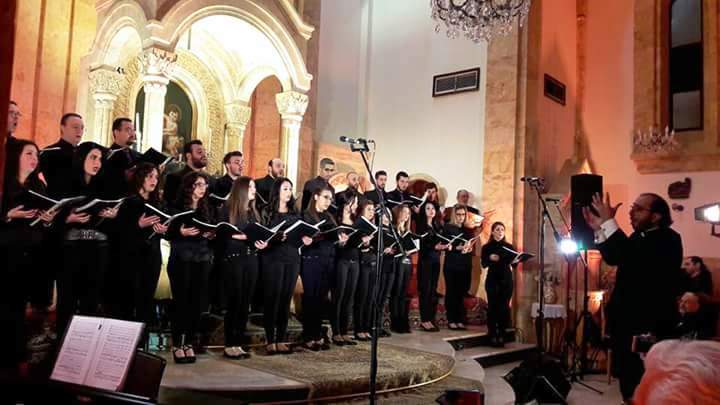
Dec 6, 2016 | Non categorizzato
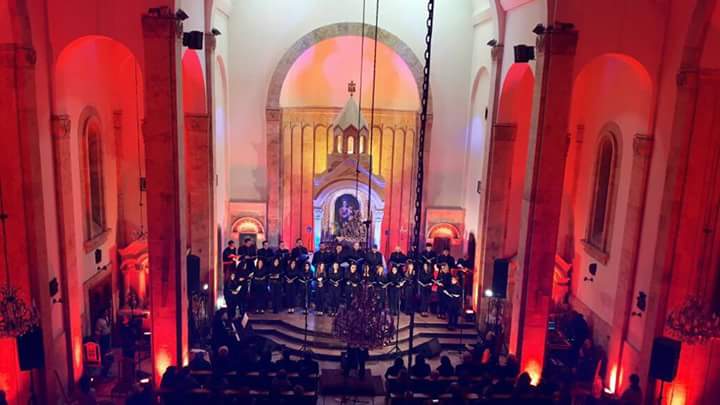 I attended for the first time, a classical music concert in the midst of a battle. It happened in Aleppo, where, surrounded by death, a voice of peace arose among many others that announced war, to comfort the hearts of the people and make them momentarily forget the cold and death. It was like a chapter of a modern tragedy that resembled Greek mythology. In a fully packed Church and with very few tools, Father Elias Janji with the Naregatsi choir and the pianist played some pieces of Verdi, Mozart, Vivaldi and Karl Orf, elevating our spirits to another horizon, despite the polar chill that has invaded Aleppo these days.. And to think that not too far away, the tragedy continues with missiles launched from Eastern Aleppo over the Western zone, killing school children and innocent people, while in the Eastern part of the city, the Syrian army continues to attack. Thousands of people (an estimated 60,000 up to today) managed to escape from East Aleppo and take refuge in the Western zone. They tell of how many have been taken as hostages and that some of those who were shot in their backs while escaping, were killed. Others escaped amid the gunfire, carrying their grandmas or other elderly relatives on their shoulders. The people were relieved since they could finally return to their own homes that were liberated in these days while the army took hold of the city’s water pumping station, even if it was mined. Water is forecasted to return to the city in a month’s time, after the technicians have completed their work. Thus a chapter of the tragedy will end, though there will surely be many more.
I attended for the first time, a classical music concert in the midst of a battle. It happened in Aleppo, where, surrounded by death, a voice of peace arose among many others that announced war, to comfort the hearts of the people and make them momentarily forget the cold and death. It was like a chapter of a modern tragedy that resembled Greek mythology. In a fully packed Church and with very few tools, Father Elias Janji with the Naregatsi choir and the pianist played some pieces of Verdi, Mozart, Vivaldi and Karl Orf, elevating our spirits to another horizon, despite the polar chill that has invaded Aleppo these days.. And to think that not too far away, the tragedy continues with missiles launched from Eastern Aleppo over the Western zone, killing school children and innocent people, while in the Eastern part of the city, the Syrian army continues to attack. Thousands of people (an estimated 60,000 up to today) managed to escape from East Aleppo and take refuge in the Western zone. They tell of how many have been taken as hostages and that some of those who were shot in their backs while escaping, were killed. Others escaped amid the gunfire, carrying their grandmas or other elderly relatives on their shoulders. The people were relieved since they could finally return to their own homes that were liberated in these days while the army took hold of the city’s water pumping station, even if it was mined. Water is forecasted to return to the city in a month’s time, after the technicians have completed their work. Thus a chapter of the tragedy will end, though there will surely be many more.  December 4 is the feast of St. Barbara, the young girl martyred in the first centuries of Christianity, pierced with a sword by her father since, as a follower of Jesus, she had refused to adore another God. It is a great feast for the Christians of the East, adults and children who, despite the war, gathered together to honour her in a masquerade and recount her story in song – a story which despite the centuries passed – has not changed very much. We can’t help but wonder, what has remained of man and his dignity? What will happen now? Will the war in Aleppo end, and bring back serenity to the people who have suffered so much, even if they will find a great part of the city destroyed? The population is weary and wants the conflict to end. But the armed groups refuse to accept defeat and want to fight to the last, despite the appeal of the UN special envoy, Staffan De Mistura, to all the groups to leave the city and spare the lives of the people, who would otherwise pay a heavy price, according to the logic of war! How can we forget that in the end, it is Man since each one, whether good or bad, is an image of God, though this image is buried under a thousand vices and wickedness. With Christmas now at our doorstep, let us therefore remind ourselves that this feast should not only be a remembrance of a past fact celebrated with the usual festivity. The arrival of the “Prince of Peace” should also change the hearts and gestures of all of us, because these become tiny stones in the construction of a better world we all dream of. From Aleppo, Pascal Bedros
December 4 is the feast of St. Barbara, the young girl martyred in the first centuries of Christianity, pierced with a sword by her father since, as a follower of Jesus, she had refused to adore another God. It is a great feast for the Christians of the East, adults and children who, despite the war, gathered together to honour her in a masquerade and recount her story in song – a story which despite the centuries passed – has not changed very much. We can’t help but wonder, what has remained of man and his dignity? What will happen now? Will the war in Aleppo end, and bring back serenity to the people who have suffered so much, even if they will find a great part of the city destroyed? The population is weary and wants the conflict to end. But the armed groups refuse to accept defeat and want to fight to the last, despite the appeal of the UN special envoy, Staffan De Mistura, to all the groups to leave the city and spare the lives of the people, who would otherwise pay a heavy price, according to the logic of war! How can we forget that in the end, it is Man since each one, whether good or bad, is an image of God, though this image is buried under a thousand vices and wickedness. With Christmas now at our doorstep, let us therefore remind ourselves that this feast should not only be a remembrance of a past fact celebrated with the usual festivity. The arrival of the “Prince of Peace” should also change the hearts and gestures of all of us, because these become tiny stones in the construction of a better world we all dream of. From Aleppo, Pascal Bedros
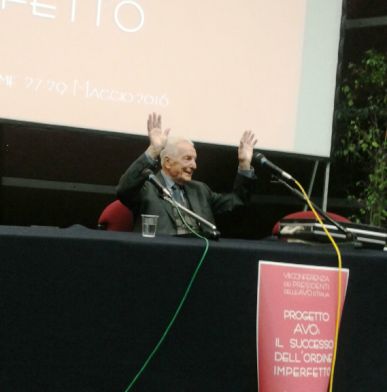
Dec 5, 2016 | Focolare Worldwide, Senza categoria
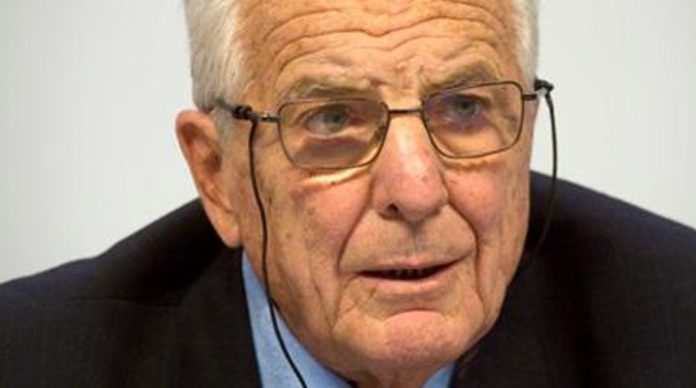 Erminio Longhini was born in Milan, Italy, on July 19, 1928. After his marriage with Nuccia, he and his wife had three children: Michela, Matteo and Stefano. While they were still university students, Nuccia and Erminio were determined to keep the human person at the centre of their professional life. “Ever since I was a child,” Erminio himself admits, “I felt strongly drawn to the Virgin Mary.” Perhaps this explains his filial devotion to “so beautiful a Mother” that even though he was buried in professional responsibilities, he offered to accompany the sick on their journeys to Lourdes. He was serious, scrupulous, demanding and went through years of hard sacrifice working from morning until deep into the night serving the sick and doing research. But his soul was also searching. He and Nuccia felt the need for a spirituality that could accompany the life of their family. They found their answer in the Focolare, in God-Love to whom Erminio felt called to give himself completely, and to serve all the brothers and sisters he would meet. He became a married focolarino. Thanks to generous contributions he set up an internal medicine department with modern equipment and welcomed young graduates from Italy and developing countries. He managed to engage colleagues and nurses until the medical division he directed became one of the best in both technical quality and in human relationships, with hundreds of published research projects. Erminio understood more and more that it was not enough to care for the patient, but for the human being.
Erminio Longhini was born in Milan, Italy, on July 19, 1928. After his marriage with Nuccia, he and his wife had three children: Michela, Matteo and Stefano. While they were still university students, Nuccia and Erminio were determined to keep the human person at the centre of their professional life. “Ever since I was a child,” Erminio himself admits, “I felt strongly drawn to the Virgin Mary.” Perhaps this explains his filial devotion to “so beautiful a Mother” that even though he was buried in professional responsibilities, he offered to accompany the sick on their journeys to Lourdes. He was serious, scrupulous, demanding and went through years of hard sacrifice working from morning until deep into the night serving the sick and doing research. But his soul was also searching. He and Nuccia felt the need for a spirituality that could accompany the life of their family. They found their answer in the Focolare, in God-Love to whom Erminio felt called to give himself completely, and to serve all the brothers and sisters he would meet. He became a married focolarino. Thanks to generous contributions he set up an internal medicine department with modern equipment and welcomed young graduates from Italy and developing countries. He managed to engage colleagues and nurses until the medical division he directed became one of the best in both technical quality and in human relationships, with hundreds of published research projects. Erminio understood more and more that it was not enough to care for the patient, but for the human being.  In collaboration with the Catholic University he carried out research in 40 hospitals, which revealed that patients’ greatest handicap was feeling dependent on others: “Why not spend a bit of our time building a human relationship, a loving exchange between us and our patients?” With some difficulty and many complications, Erminio managed to come up with the first 30 volunteers to care for the sick beyond there purely medical needs. “What did I try to convey to them?” He explains: “What I had learned from Chiara Lubich: reciprocity.” The Hospital Volunteers Association emerged from that first group, in 1976. His work was encouraged not only by Chiara Lubich, but by Cardinals Colombo and Martini from Milan, and by John Paul II himself who, during an audience for 7,000 volunteers, said to Erminio: “I’m pleased, tell your friends to continue like this.” Following the painful death of his wife, Erminio’s meekness and abandonment to God deepened. Forced to have more frequent medical visits and transfusions, he confided: “I feel like an autumn leaf on a windy day. It might seem more desirable that the evening of life should come. Then, I realize that there’s a temptation hiding there, and in the morning I realize that another day is being given to me and that life is living the present moment, counting on God’s mercy for the past and for the hopes of the future.” In the meantime, the Hospital Volunteers Association spread all over Italy and now has 25,000 volunteers in 250 hospitals. Because of his commitment, in 2004, Erminio was awarded the Gold Medal of Merit Award for Health by the President of Italy. Until the end Erminio continued to offer spiritual encouragement to the volunteers through video messages and writings. In the final months his medical condition was not reassuring, but he was serene: “I thank God because I had much more in my life than what I would have imagined. I thank the Blessed Mother, and every night I finish my prayers saying to her: “Let it be You to come and get me, and it will be pure joy. I’ll hear You and see You!” He died on November 4th. Everybody that knew and loved him, are certain that it happened just as he had desired in payment for a life seeped in the Gospel. The current president of the association writes: “A great man has left us, a man who was able to perceive with his sensitivity, humanity and faith the invisible essence that eye cannot see, nor even the mind. But he doesn’t leave us alone, each of us will meet him in their service to others if we manage to allow all the wisdom, knowledge and depth that Erminio always conveyed and taught to bear fruit.” Anna Friso
In collaboration with the Catholic University he carried out research in 40 hospitals, which revealed that patients’ greatest handicap was feeling dependent on others: “Why not spend a bit of our time building a human relationship, a loving exchange between us and our patients?” With some difficulty and many complications, Erminio managed to come up with the first 30 volunteers to care for the sick beyond there purely medical needs. “What did I try to convey to them?” He explains: “What I had learned from Chiara Lubich: reciprocity.” The Hospital Volunteers Association emerged from that first group, in 1976. His work was encouraged not only by Chiara Lubich, but by Cardinals Colombo and Martini from Milan, and by John Paul II himself who, during an audience for 7,000 volunteers, said to Erminio: “I’m pleased, tell your friends to continue like this.” Following the painful death of his wife, Erminio’s meekness and abandonment to God deepened. Forced to have more frequent medical visits and transfusions, he confided: “I feel like an autumn leaf on a windy day. It might seem more desirable that the evening of life should come. Then, I realize that there’s a temptation hiding there, and in the morning I realize that another day is being given to me and that life is living the present moment, counting on God’s mercy for the past and for the hopes of the future.” In the meantime, the Hospital Volunteers Association spread all over Italy and now has 25,000 volunteers in 250 hospitals. Because of his commitment, in 2004, Erminio was awarded the Gold Medal of Merit Award for Health by the President of Italy. Until the end Erminio continued to offer spiritual encouragement to the volunteers through video messages and writings. In the final months his medical condition was not reassuring, but he was serene: “I thank God because I had much more in my life than what I would have imagined. I thank the Blessed Mother, and every night I finish my prayers saying to her: “Let it be You to come and get me, and it will be pure joy. I’ll hear You and see You!” He died on November 4th. Everybody that knew and loved him, are certain that it happened just as he had desired in payment for a life seeped in the Gospel. The current president of the association writes: “A great man has left us, a man who was able to perceive with his sensitivity, humanity and faith the invisible essence that eye cannot see, nor even the mind. But he doesn’t leave us alone, each of us will meet him in their service to others if we manage to allow all the wisdom, knowledge and depth that Erminio always conveyed and taught to bear fruit.” Anna Friso
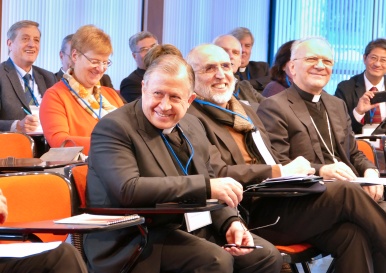
Dec 3, 2016 | Non categorizzato
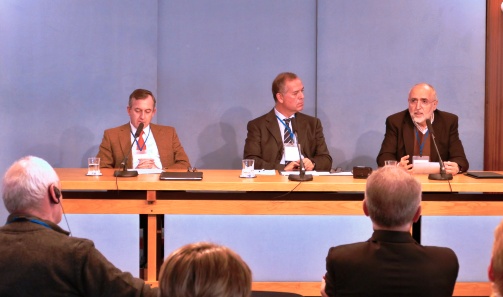
From left: Jorge López e Alberto García (Regnum Chisti), Jesús Morán (Focolari)

From left: D. Edoardo Robles Gil, General Director of the Legionaries of Christ- Regnum Christi with Jesús Morán and Archbishop Vincenzo Zani.
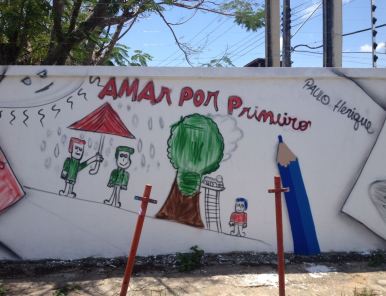
Dec 1, 2016 | Non categorizzato
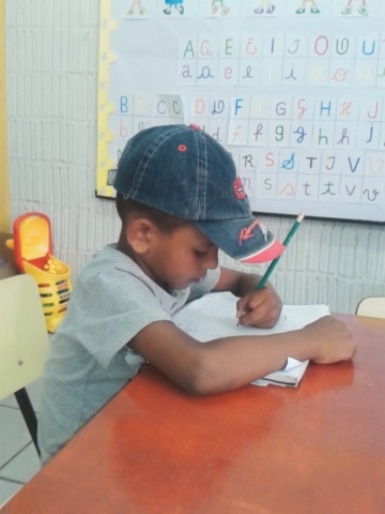 In Coroado on the outskirts of the capital of the State of Amazonas, the wall that separates and protects the centre from the harsh realities of violence and drugs that consume the neighborhood, had begun to deteriorate because of recent rains. Begun in the early 1990s through the efforts of some people from the Focolare Movement, the centre began its work in favour of social inclusion, with a nursery and primary school, but soon turned into a real social agency that was open morning until night. It was begun as an attempt to ensure children and adolescents of the area the right to a harmonious and wholesome development, through educational and recreational activities and support for their families. It is financially supoorted by the generosity of so many people, especially by distance support from the New Families Non Profit Organisation which, in addition to education also provides nutrition and preventive medical care. Several activities followed, such as a study in collaboration with the School of Educational Psychology at the Federal University of Amazonas to identify and overcome the learning problems of some of the young people. There was also also a project carried out and presented by the Pharmacy students to provide the children and their families with a basic knowledge of hygiene, nutrition and personal care. The School of Pharmacy did research project on infectious diseases with blood samples, and provided treatments. There are drug prevention programmes and programmes that combat child labour while parents are offered vocational training courses in collaboration with the Centre of Technology Education of the State of Amazonas. Jeanne and Carlos who work full time for the project recount: “Over the years we came up with Literature and Theatre workshops. We also managed to come up with a programme on emotions and sexuality for teenagers and young adults.”
In Coroado on the outskirts of the capital of the State of Amazonas, the wall that separates and protects the centre from the harsh realities of violence and drugs that consume the neighborhood, had begun to deteriorate because of recent rains. Begun in the early 1990s through the efforts of some people from the Focolare Movement, the centre began its work in favour of social inclusion, with a nursery and primary school, but soon turned into a real social agency that was open morning until night. It was begun as an attempt to ensure children and adolescents of the area the right to a harmonious and wholesome development, through educational and recreational activities and support for their families. It is financially supoorted by the generosity of so many people, especially by distance support from the New Families Non Profit Organisation which, in addition to education also provides nutrition and preventive medical care. Several activities followed, such as a study in collaboration with the School of Educational Psychology at the Federal University of Amazonas to identify and overcome the learning problems of some of the young people. There was also also a project carried out and presented by the Pharmacy students to provide the children and their families with a basic knowledge of hygiene, nutrition and personal care. The School of Pharmacy did research project on infectious diseases with blood samples, and provided treatments. There are drug prevention programmes and programmes that combat child labour while parents are offered vocational training courses in collaboration with the Centre of Technology Education of the State of Amazonas. Jeanne and Carlos who work full time for the project recount: “Over the years we came up with Literature and Theatre workshops. We also managed to come up with a programme on emotions and sexuality for teenagers and young adults.” The latest win was described by Janine and Carlos: “The economic crisis is making the situation of our country more and more difficult. For example, one institution that offered a computer course for more than ten years, had to stop collaborating with us. Some of the children’s parents are losing their jobs. And the financial resources for repairing our protective wall that had assumed a gloomy and even threatening appearance often defaced by vandals, were just not available. Then we had the idea of appealing to the Manaus Court of Justice and proposing a partnership called “Let’s paint the wall.” The proposal, which was subsequently passed, would portray in images the experience and the values that we live with the children at the Social Centre and to give an air of joy and harmony to our neighborhood. We wanted the boys and girls to be engaged in this project, so we collected their drawings so that they could be reproduced on the wall.” The newly restored and painted wall was unvieled on October 27th. “It was a very joful event for us,” say Janine and Carlos, “because this recognition from the Court of Justice not only comforts the centre and its efforts, but it allows us to bring ahead the project in the best way we can. We especially thank the many people who generously support us in giving the boys and girls the opportunity to gain knowledge and training that will allow them to take their life in their own hands and become new women and new men.” Giovanna Pieroni
The latest win was described by Janine and Carlos: “The economic crisis is making the situation of our country more and more difficult. For example, one institution that offered a computer course for more than ten years, had to stop collaborating with us. Some of the children’s parents are losing their jobs. And the financial resources for repairing our protective wall that had assumed a gloomy and even threatening appearance often defaced by vandals, were just not available. Then we had the idea of appealing to the Manaus Court of Justice and proposing a partnership called “Let’s paint the wall.” The proposal, which was subsequently passed, would portray in images the experience and the values that we live with the children at the Social Centre and to give an air of joy and harmony to our neighborhood. We wanted the boys and girls to be engaged in this project, so we collected their drawings so that they could be reproduced on the wall.” The newly restored and painted wall was unvieled on October 27th. “It was a very joful event for us,” say Janine and Carlos, “because this recognition from the Court of Justice not only comforts the centre and its efforts, but it allows us to bring ahead the project in the best way we can. We especially thank the many people who generously support us in giving the boys and girls the opportunity to gain knowledge and training that will allow them to take their life in their own hands and become new women and new men.” Giovanna Pieroni
Nov 29, 2016 | Non categorizzato
Nov 28, 2016 | Non categorizzato, Word of
https://www.focolare.org/gb/files/2016/11/2016-12.mp3
Word of Life for ages 4-8 | for ages 9-14 | for ages 15-17
The verb is in the present tense: “He comes …” We can be sure of his coming in this very moment. We do not have to wait till tomorrow, or the end of time, or the next life. God acts immediately, because love shuns both hesitation and delay. The prophet Isaiah is speaking to a people anxiously waiting for their exile to end so they can return to their homeland. For us too who are waiting for Christmas, we cannot but recall a similar promise given to Mary: “The Lord is with you” (Lk 1:28), as the angel announces to her the birth of the Lord. The Lord does not come for a casual visit. His is a decisive intervention, a matter of greatest importance. He comes to save us! From what? Are we in grave danger? Yes. At times we are aware of it, at other times not. He intervenes because he sees our selfishness, our indifference to those who suffer or who are in need, our hatred, our divisions. The heart of humanity is ailing. Moved by pity, he comes towards each one he has made, who he does not want to be lost. The Lord offers his outstretched hand as if to the drowning victim of a shipwreck. Sadly these days this image is always in front us, brought to mind day by day when we see those refugees who are trying to cross seas, those immigrants crossing borders. We witness how quickly they grasp an outstretched hand or a life jacket. We too, in every moment, can grasp God’s outstretched hand and follow him with trust. He does not only heal our hearts from self-absorption, which closes us off from others, but he makes us, in our turn, able to help those who are in need, who are sorrowful, who are going through trials. “Certainly it is not the historical Jesus or Jesus as head of the Mystical Body who sorts out our problems,” wrote Chiara Lubich. “It is done by Jesus-us, Jesus-me, Jesus-you… It is Jesus in human beings, in that specific human being (when grace is present in him or her) who builds a bridge, lays down a road … “It is as another Christ, as a member of his Mystical Body, that each human being brings his or her characteristic contribution in all fields: in the sciences, in the arts, in politics, in communications, and so on.” The person thus works together with Christ. “It is the incarnation that continues, a complete incarnation that involves all those who are Jesus in Christ’s Mystical Body.” (“Jesus Forsaken and the Collective and Cultural Night,” an address given by Chiara Lubich to a group of young women on January 7, 2007). This is exactly what happened to Roberto, an ex-convict who found someone who “saved” him and who then, in turn, became someone who “saved” others. He told his experience at a Focolare gathering in Villa Borghese in Rome last April. “When my long-term prison sentence came to an end, I thought I would start life again, but as usually happens, even if you have paid your debt to society, you still seem very suspect to people. “I found the doors shut in my search for work. I had to beg on the streets, and for seven months I lived as a tramp. But then I met Alfonso who, through an organization started by him, helps prisoners’ families. “He said to me, ‘If you want to start again, come with me.’ For a year now I have been helping him prepare food packages for these families in whom I see a reflection of myself. I see the dignity of these women who are alone with little children, living in desperate situations, waiting for someone to give them a bit of comfort, a bit of love. “Giving of myself, I have rediscovered my own dignity as a human being, and my life has meaning. I have more strength because I have God in my heart, and I feel I am loved …” Fr. Fabio Ciardi, OMI Each month the Focolare offers a Scripture passage as a guide and inspiration for daily living. Ever since the Focolare’s earliest years, founder Chiara Lubich (1920–2008) wrote her own commentaries each month. Now Fr. Fabio Ciardi, OMI, theologian and close collaborator of Lubich, heads a group of scripture experts who have been entrusted with the task of writing the Word of Life commentaries, reflecting her thoughts and her spirituality of unity. This Word of Life is translated into 96 different languages and reaches several million people worldwide through the media. This monthly leaflet is also a supplement to Living City, the Focolare magazine (livingcitymagazine.com). For information and to subscribe to this leaflet or to the magazine, write to: Living City, 202 Comforter Blvd, Hyde Park, NY 12538; tel: 845-229-0496; e-mail: livingcity@livingcitymagazine.com. Visit focolare.org (international) or focolare.us (U.S.). © 2016 by Living City of the Focolare Movement, Inc. Read more: Lubich, Chiara. “How I met you,” Essential Writings, New City Press: Hyde Park, New York: 2007, p. 56. Lubich, Chiara. “The attraction of modern times,” Essential Writings, New City Press: Hyde Park, New York: 2007, pp.169–178.
Nov 28, 2016 | Focolare Worldwide
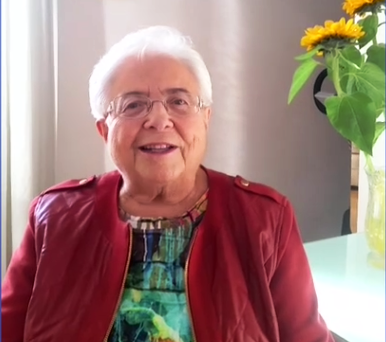
Nov 27, 2016 | Non categorizzato
 “I have seen how seriously you have been preparing for this moment and this makes me very happy indeed, and gives me great peace for the Movement’s future, because I have seen that you have taken Chiara (Lubich’s) legacy seriously which is handed on to the second generation in the Movement … with the same zeal” as at the start of the Movement. In response to various questions that the young people asked her, on Jesus forsaken, the point of the spirituality of unity which has been chosen to go into depth with this year, Maria Voce explained: “God sent his Son to re-build these bonds, [of unity between God and humankind and among all people] so to do something great.” In order to do this “Jesus did not choose to come with an armada … but he chose a means that maybe is not understood first off; he chose the means of the cross. The means of the cross which for Jesus meant loving right to the end, the greatest love of all, taking on himself all of humanity’s pain, all sufferings, all humiliations, purely out of love! And in the moment he did it, Jesus made a new creation, he created a new unity, he redeemed humanity, so he re-established the unity that humankind had lost with God and people had lost among themselves; it was the greatest of works.” “So in that moment Jesus forsaken is truly the victorious King! He is not only someone who is suffering. Yes, suffering was the means that He chose, but it was because through that suffering he showed the greatest love; because he bore witness before people as to how much the Father loved them and how much he was ready to suffer out of love for the Father and love for them. Now Jesus forsaken comes to us and says the same thing: “Do you want to bear witness to God’s love in front of the whole world, and all people? Then use the same means as I did. Make yourself one with them right to the end, take on the sufferings, pain, doubts and anguish that people feel,” creating “bonds which will make the human family a real family of God’s children, bonded with one another and with the Father.” Concerning questions about their future, Maria Voce answered: Be generous with God! If you truly feel that God is calling you somehow, that he is speaking in the depths of your heart, don’t pay attention to anything else, pay attention only to this voice and say yes … then He will be the one to take you where he wants you to be”, to fulfil God’s “plan of love for each one that will give you the greatest happiness. I wish you this with all my heart!” Gustavo Clariá https://vimeo.com/192601570
“I have seen how seriously you have been preparing for this moment and this makes me very happy indeed, and gives me great peace for the Movement’s future, because I have seen that you have taken Chiara (Lubich’s) legacy seriously which is handed on to the second generation in the Movement … with the same zeal” as at the start of the Movement. In response to various questions that the young people asked her, on Jesus forsaken, the point of the spirituality of unity which has been chosen to go into depth with this year, Maria Voce explained: “God sent his Son to re-build these bonds, [of unity between God and humankind and among all people] so to do something great.” In order to do this “Jesus did not choose to come with an armada … but he chose a means that maybe is not understood first off; he chose the means of the cross. The means of the cross which for Jesus meant loving right to the end, the greatest love of all, taking on himself all of humanity’s pain, all sufferings, all humiliations, purely out of love! And in the moment he did it, Jesus made a new creation, he created a new unity, he redeemed humanity, so he re-established the unity that humankind had lost with God and people had lost among themselves; it was the greatest of works.” “So in that moment Jesus forsaken is truly the victorious King! He is not only someone who is suffering. Yes, suffering was the means that He chose, but it was because through that suffering he showed the greatest love; because he bore witness before people as to how much the Father loved them and how much he was ready to suffer out of love for the Father and love for them. Now Jesus forsaken comes to us and says the same thing: “Do you want to bear witness to God’s love in front of the whole world, and all people? Then use the same means as I did. Make yourself one with them right to the end, take on the sufferings, pain, doubts and anguish that people feel,” creating “bonds which will make the human family a real family of God’s children, bonded with one another and with the Father.” Concerning questions about their future, Maria Voce answered: Be generous with God! If you truly feel that God is calling you somehow, that he is speaking in the depths of your heart, don’t pay attention to anything else, pay attention only to this voice and say yes … then He will be the one to take you where he wants you to be”, to fulfil God’s “plan of love for each one that will give you the greatest happiness. I wish you this with all my heart!” Gustavo Clariá https://vimeo.com/192601570
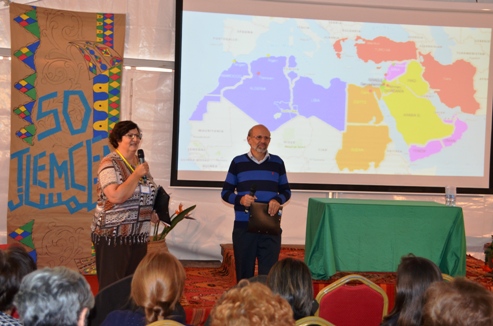
Nov 26, 2016 | Focolare Worldwide
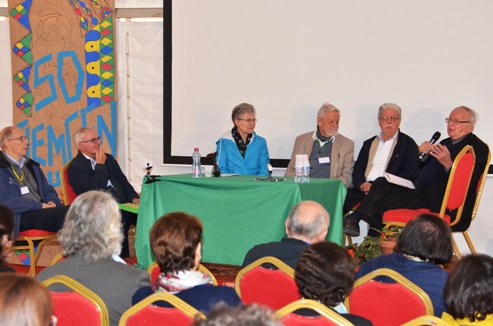 The event was attended by 90 Muslims and Christians from Jordan, Syria, Libya, Greece, Tunisia, France, Italy, Switzerland, Burkina Faso, Canada and Algeria. Four topics were discussed: suffering in light of God; the divine inspiration on unity in Chiara Lubich; the challenges and problems for the contemporary Muslim; being builders of universal brotherhood. The most repeated word at the conference was “together” which highlighted the experience that has been maturing for years in the heart of the Focolare Movement: Christians and Muslims living the ideal of unity together, according to the charism given by God to Chiara Lubich fully accepting their individual identities and differences. Chiara’s deep mystical experience from the summer of 1949 was introduced by Jésus Morán and welcomed by the participants in an atmosphere of deep fraternity: “Chiara takes us into the God of Oneness, beyond the differences of single religions,” said Jalleh who is a Sciite from Iran. Someone else remarked: “Chiara uses images that are understandable when talking about the Trinity.” Rita Moussallem and Roberto Catalano, who work for the Movement’s interreligious dialogue, presented the Focolare’s experience with different religions around the world: “You could say that God manifested himself and gave us all a bit of his light,” said one participant. After an immersion in the unity that is born from the Christian context, the focus shifted to Islam. The Algerian-Tunisian scholar Adnane Mokrani, who teaches as the Pontifical Institute of Arab and Islamist Studies at Rome (PISAI), talked about the crisis that Islam is going through today. She invited the audience not to allow itself to be taken in by the different conspiracy theories, not to blame others, but to return to the discussion table, without being discouraged: because “the majority of the people want peace, perhaps an inactive majority … But it’s up to us,” she emphasized, “an active minority to do all that we can to arouse that majority. It’s our task.”
The event was attended by 90 Muslims and Christians from Jordan, Syria, Libya, Greece, Tunisia, France, Italy, Switzerland, Burkina Faso, Canada and Algeria. Four topics were discussed: suffering in light of God; the divine inspiration on unity in Chiara Lubich; the challenges and problems for the contemporary Muslim; being builders of universal brotherhood. The most repeated word at the conference was “together” which highlighted the experience that has been maturing for years in the heart of the Focolare Movement: Christians and Muslims living the ideal of unity together, according to the charism given by God to Chiara Lubich fully accepting their individual identities and differences. Chiara’s deep mystical experience from the summer of 1949 was introduced by Jésus Morán and welcomed by the participants in an atmosphere of deep fraternity: “Chiara takes us into the God of Oneness, beyond the differences of single religions,” said Jalleh who is a Sciite from Iran. Someone else remarked: “Chiara uses images that are understandable when talking about the Trinity.” Rita Moussallem and Roberto Catalano, who work for the Movement’s interreligious dialogue, presented the Focolare’s experience with different religions around the world: “You could say that God manifested himself and gave us all a bit of his light,” said one participant. After an immersion in the unity that is born from the Christian context, the focus shifted to Islam. The Algerian-Tunisian scholar Adnane Mokrani, who teaches as the Pontifical Institute of Arab and Islamist Studies at Rome (PISAI), talked about the crisis that Islam is going through today. She invited the audience not to allow itself to be taken in by the different conspiracy theories, not to blame others, but to return to the discussion table, without being discouraged: because “the majority of the people want peace, perhaps an inactive majority … But it’s up to us,” she emphasized, “an active minority to do all that we can to arouse that majority. It’s our task.”  She and Adnane Mokrani answered several spontaneous questions from the audience. Scholar of Comparative Religions at the University of Amman, Jordan, Amer Hafi said: “God is great[er] means that he is greater than our fears, than our problems and misfortunes: God is the key of our hope and of our life. But unfortunately this invocation has become a death signal.” The presence of Emeritus Archbishop Henri Teissier with his in-depth knowledge of Islam was deeply appreciate, along with Bishop of Orano, Jean Paul Vesco. He explained: “the friendship founded on spiritual communion is the apex of dialogue among the religions and their differences.” The young Algerian Muslims from the Focolare Movement provided music and song. The visit to the mausoleum of mystic Sidi Boumediène, which was presented by Algerian scholar Dr Sari-Ali Hikmet, immersed the conference members in the spirituality, art and culture of Islam. This was followed by a visit to the El Mechouar Museum, a palace from the Zianide Dynasty, and a visit to the Great Mosque and to the modern Andalusi Centre of Studies. Before leaving Tlemcen, Jesús Morán commented on the experience: “It wasn’t only getting along, but of being one, sharing the same experience of God, of sharing what we have deepest inside of us.” Jean-Louis Marechal
She and Adnane Mokrani answered several spontaneous questions from the audience. Scholar of Comparative Religions at the University of Amman, Jordan, Amer Hafi said: “God is great[er] means that he is greater than our fears, than our problems and misfortunes: God is the key of our hope and of our life. But unfortunately this invocation has become a death signal.” The presence of Emeritus Archbishop Henri Teissier with his in-depth knowledge of Islam was deeply appreciate, along with Bishop of Orano, Jean Paul Vesco. He explained: “the friendship founded on spiritual communion is the apex of dialogue among the religions and their differences.” The young Algerian Muslims from the Focolare Movement provided music and song. The visit to the mausoleum of mystic Sidi Boumediène, which was presented by Algerian scholar Dr Sari-Ali Hikmet, immersed the conference members in the spirituality, art and culture of Islam. This was followed by a visit to the El Mechouar Museum, a palace from the Zianide Dynasty, and a visit to the Great Mosque and to the modern Andalusi Centre of Studies. Before leaving Tlemcen, Jesús Morán commented on the experience: “It wasn’t only getting along, but of being one, sharing the same experience of God, of sharing what we have deepest inside of us.” Jean-Louis Marechal
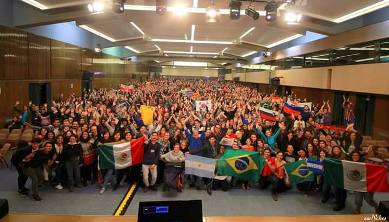
Nov 25, 2016 | Focolare Worldwide
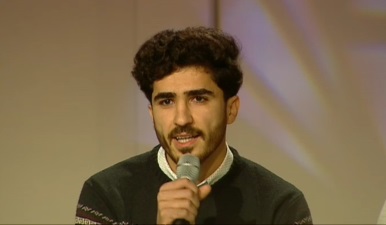 The words of the young Iraqi, Aziiz, were welcomed by a long applause and attentive gazes of more than a thousand Gen attending their annual congress. They listened closely as he recounted the drama that he and his family had lived through in Qaraqosh, a town on the Nineveh Plain, when the militiamen of the self-styled Islamic state arrived. “Before telling you my story,” Aziiz began, “I’d like to ask you a question. Have you ever thought that you could one day lose everything? Your family home with all of your most cherished memories, your friends, dreams and your people? That’s what happened to me….” The suffering of the escape from his hometown with his family towards Iraqi Kurdistan was still visible in his eyes: “I wondered why I had to go through this Calvary, and that’s where the experience began of finding myself living with Jesus Forsaken. I felt like I was in an action film, where I couldn’t differentiate between what was real and what was imaginary: masses of people walking on foot in search of a way to escape, tears, cries…. I was stiffened by the pain, but I said to myself that perhaps I could smile back at the people next to me. With us there was a group from the Yazidi religion, who were in need of even more help, because ISIS had inflicted torture on them. I put my fears aside in order to be close to them and to offer them support.” Aziiz and his family are now taking refuge in France. It was a difficult decision, given the thousands of challenges they would have to face, but he never felt abandoned by God’s love “whose invisible hand continues to wipe away our tears and lightens our sufferings.” We young people possess an enormous potential for changing the world, beginning with the small things: either we live to change something and make the world better; or our life is meaningless.”
The words of the young Iraqi, Aziiz, were welcomed by a long applause and attentive gazes of more than a thousand Gen attending their annual congress. They listened closely as he recounted the drama that he and his family had lived through in Qaraqosh, a town on the Nineveh Plain, when the militiamen of the self-styled Islamic state arrived. “Before telling you my story,” Aziiz began, “I’d like to ask you a question. Have you ever thought that you could one day lose everything? Your family home with all of your most cherished memories, your friends, dreams and your people? That’s what happened to me….” The suffering of the escape from his hometown with his family towards Iraqi Kurdistan was still visible in his eyes: “I wondered why I had to go through this Calvary, and that’s where the experience began of finding myself living with Jesus Forsaken. I felt like I was in an action film, where I couldn’t differentiate between what was real and what was imaginary: masses of people walking on foot in search of a way to escape, tears, cries…. I was stiffened by the pain, but I said to myself that perhaps I could smile back at the people next to me. With us there was a group from the Yazidi religion, who were in need of even more help, because ISIS had inflicted torture on them. I put my fears aside in order to be close to them and to offer them support.” Aziiz and his family are now taking refuge in France. It was a difficult decision, given the thousands of challenges they would have to face, but he never felt abandoned by God’s love “whose invisible hand continues to wipe away our tears and lightens our sufferings.” We young people possess an enormous potential for changing the world, beginning with the small things: either we live to change something and make the world better; or our life is meaningless.”  Chiara Lubich’s words spoken to the Gen2 in 1967 sounded timely as well as prophetic: “Rumours and news of wars sadden the world horizon. Perhaps in the Middle or Far East some of our Gen (…) were or are in danger of dying. Our very goal – to help peace in the world – seems painfully compromised. What will we do? Not be discouraged (…) The bombs fall and destroy houses and kill people: let love spread even more quickly to build a new society and a new world.” “Fifty years have passed, but we’re still that same generation that never stops, said Gloria from Uganda, “that still wants to live the ideal that Chiara has given to us.” Damián from Argentina explains: “This is a moment of celebration for us. We revisited some important moments of the Gen Movement from past years, trying to revive each word that Chiara said to us.” Testimonies were given by Gen from several countries, dialogue and reflection with music and song to celebrate the fifty years of intense life of the Focolare’s second generation. In a video message, Focolare president, Maria Voce, invited the young people to follow the plan of love that God has for each one of them, following the example of Jesus who chose the Cross – love to the very end – to be generous and willing to work for a world of peace. During an enabling and very open discussion, Focolare co-president, Jesùs Morán, encouraged the Gen to live a life of love for others, opting for the least, the people that society rejects in an ever more divided world. The more than a thousand young people departed with Chiara Lubich’s prophetic mandate: “It will be the second generation that will make the cry of Jesus Forsaken echo to the ends of the earth … And in that cry the entire world will breathe again.” Patrizia Mazzola
Chiara Lubich’s words spoken to the Gen2 in 1967 sounded timely as well as prophetic: “Rumours and news of wars sadden the world horizon. Perhaps in the Middle or Far East some of our Gen (…) were or are in danger of dying. Our very goal – to help peace in the world – seems painfully compromised. What will we do? Not be discouraged (…) The bombs fall and destroy houses and kill people: let love spread even more quickly to build a new society and a new world.” “Fifty years have passed, but we’re still that same generation that never stops, said Gloria from Uganda, “that still wants to live the ideal that Chiara has given to us.” Damián from Argentina explains: “This is a moment of celebration for us. We revisited some important moments of the Gen Movement from past years, trying to revive each word that Chiara said to us.” Testimonies were given by Gen from several countries, dialogue and reflection with music and song to celebrate the fifty years of intense life of the Focolare’s second generation. In a video message, Focolare president, Maria Voce, invited the young people to follow the plan of love that God has for each one of them, following the example of Jesus who chose the Cross – love to the very end – to be generous and willing to work for a world of peace. During an enabling and very open discussion, Focolare co-president, Jesùs Morán, encouraged the Gen to live a life of love for others, opting for the least, the people that society rejects in an ever more divided world. The more than a thousand young people departed with Chiara Lubich’s prophetic mandate: “It will be the second generation that will make the cry of Jesus Forsaken echo to the ends of the earth … And in that cry the entire world will breathe again.” Patrizia Mazzola
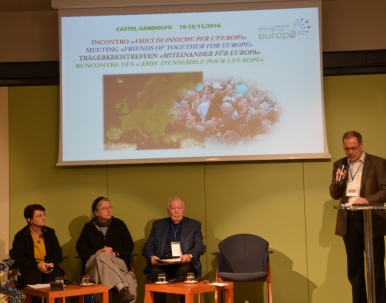
Nov 24, 2016 | Non categorizzato
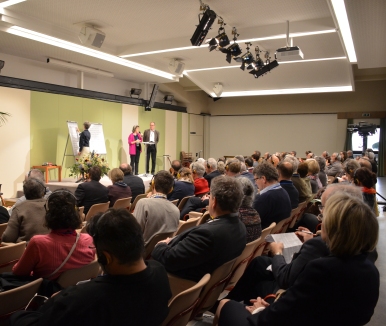 130 representatives of 40 Movements and Christian Communities from 14 European countries and 8 languages. These are the numbers from a three-day Together for Europe meeting held at the Focolare Movement International Centre, Castel Gandolfo, Italy. “We heard about the Paris attacks on year ago during our annual meeting in Holland,” Beatriz Lauenroth recalls. “Those and other events that are leading to fragmenation in Europe, show the need for encounter and working together for unity.” Many of the participants underscored this need, such as German Elke Pechmann from the Offensive Junger Christen: “Together for Europe is not an extra luxury, it’s not merely something more. It’s a noteworthy investment in the present and especially the future of Europe.” Moscow representative Larisa Musina from the Transfiguration Fellowship of Minor Orthodox Brotherhoods, Saint Philaret underscored the importance of deepening our knowledge of one another in order to increase dialogue: “We need to widen the dialogue between countries of the East and the West. Together with other Eastern European countries we Russians also have much to give to the West.” Switzerland made the voice of the young be heard: “The five of us young people representing Jacksonville Association of Health Underwriters (JAHU),” Selomi Zürcher explained, “feel that the future of Europe is also of concern to us. We value the experience and wisdom of our elders. And we ask them to have faith in us, and to learn from us as well. Thus the Europe of our forefathers will also be the Europe of the sons and daughters.”
130 representatives of 40 Movements and Christian Communities from 14 European countries and 8 languages. These are the numbers from a three-day Together for Europe meeting held at the Focolare Movement International Centre, Castel Gandolfo, Italy. “We heard about the Paris attacks on year ago during our annual meeting in Holland,” Beatriz Lauenroth recalls. “Those and other events that are leading to fragmenation in Europe, show the need for encounter and working together for unity.” Many of the participants underscored this need, such as German Elke Pechmann from the Offensive Junger Christen: “Together for Europe is not an extra luxury, it’s not merely something more. It’s a noteworthy investment in the present and especially the future of Europe.” Moscow representative Larisa Musina from the Transfiguration Fellowship of Minor Orthodox Brotherhoods, Saint Philaret underscored the importance of deepening our knowledge of one another in order to increase dialogue: “We need to widen the dialogue between countries of the East and the West. Together with other Eastern European countries we Russians also have much to give to the West.” Switzerland made the voice of the young be heard: “The five of us young people representing Jacksonville Association of Health Underwriters (JAHU),” Selomi Zürcher explained, “feel that the future of Europe is also of concern to us. We value the experience and wisdom of our elders. And we ask them to have faith in us, and to learn from us as well. Thus the Europe of our forefathers will also be the Europe of the sons and daughters.”  One question which kept coming up in the presentations, personal conversations and work groups was – what the path forward should be for Together for Europe and there were several concrete suggestions. They were all steps that could be taken by individual Movements and Communities during 2017, both for their own countries and Together for Europe. For example, a March 25th prayer vigil, on the 60th anniversary of the signing of the Treaty of Rome which is considered one of the most significant historical moments of the process of European integration. It will gather many European political figures in Rome. Together for Europe would also like to be there and has already sent a document to the politicians regarding “our idea of Europe, and we hope that similar vigils can be held in European cities where we have a presence.” Another initiatitve that the participants felt to be important was that spaces for encounter and sharing be created. “We want to increase the communion among the Movements at local levels and offer even more events for individual cities.” The impressions people shared during the closing express the enthusiasm they experienced in being together. A young woman from Germany said: “I’d like more young people to catch my enthusiasm for Together for Europe, and I hope that next year there will be even more of us.” A young man from Slovenia: “When we get home we’ll update all the other Movements in Slovenia about what we experienced here. We’ll also invite a Catholic and Lutheran bishop, so that they may know that the laity is also with the Church and stepping into action for the better future of the continent.” With the meeting of Castel Gandolfo participation in Together for Europe has expanded to Religious Congregations and ancient charismatic communities. The next Friends of Together for Europe event is planned for November 9-11, 2017 in Vienna, Austria.
One question which kept coming up in the presentations, personal conversations and work groups was – what the path forward should be for Together for Europe and there were several concrete suggestions. They were all steps that could be taken by individual Movements and Communities during 2017, both for their own countries and Together for Europe. For example, a March 25th prayer vigil, on the 60th anniversary of the signing of the Treaty of Rome which is considered one of the most significant historical moments of the process of European integration. It will gather many European political figures in Rome. Together for Europe would also like to be there and has already sent a document to the politicians regarding “our idea of Europe, and we hope that similar vigils can be held in European cities where we have a presence.” Another initiatitve that the participants felt to be important was that spaces for encounter and sharing be created. “We want to increase the communion among the Movements at local levels and offer even more events for individual cities.” The impressions people shared during the closing express the enthusiasm they experienced in being together. A young woman from Germany said: “I’d like more young people to catch my enthusiasm for Together for Europe, and I hope that next year there will be even more of us.” A young man from Slovenia: “When we get home we’ll update all the other Movements in Slovenia about what we experienced here. We’ll also invite a Catholic and Lutheran bishop, so that they may know that the laity is also with the Church and stepping into action for the better future of the continent.” With the meeting of Castel Gandolfo participation in Together for Europe has expanded to Religious Congregations and ancient charismatic communities. The next Friends of Together for Europe event is planned for November 9-11, 2017 in Vienna, Austria.
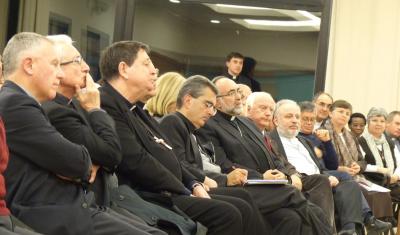
Nov 23, 2016 | Non categorizzato
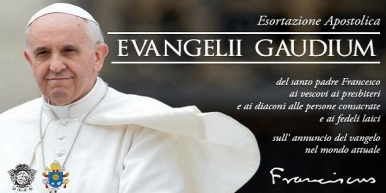 A first initiative already launched in October, well expressed the dynamism and creativity of the new Evangelii Gaudium Centre (EGC) which, even before the official inauguration, broke the ice with a course for educators, animators and missionary, pastoral theology students, entitled “Wake up the World.” This new Centre arose from the synergy between the Sophia University Institute (IUS) and the Focolare Movement, particularly the Presbyterians, deacons, seminarians, religious men and women, Parish and the Diocesan Movement directly involved in the ecclesial world. It was thus an already active Centre, which celebrated its first day of public life last November, taking the occasion to explain its mission: to give enthusiasm, orientation and content to the work of pastoral renewal of the evangelisation the Church is called to perform today. It is a commitment which the EGC intends to undertake as a response to Pope Francis, drawing inspiration and its name from “Evangelii Gaudium,” his apostolic exhortation. Through courses, conventions, seminars, symposiums, workshops, and scientific meetings, the EGC wishes to be a “place of thought” solidly bound to the synod stylelines gathering together all those spiritual inspirations and experiences generated by Chiara Lubich’s charism of unity. And it aims to do so by focusing on formation, studies and research within the framework of ecclesiology, pastoral theology and the missions, spiritual theology and the theology of charisms in the life of the Church today.
A first initiative already launched in October, well expressed the dynamism and creativity of the new Evangelii Gaudium Centre (EGC) which, even before the official inauguration, broke the ice with a course for educators, animators and missionary, pastoral theology students, entitled “Wake up the World.” This new Centre arose from the synergy between the Sophia University Institute (IUS) and the Focolare Movement, particularly the Presbyterians, deacons, seminarians, religious men and women, Parish and the Diocesan Movement directly involved in the ecclesial world. It was thus an already active Centre, which celebrated its first day of public life last November, taking the occasion to explain its mission: to give enthusiasm, orientation and content to the work of pastoral renewal of the evangelisation the Church is called to perform today. It is a commitment which the EGC intends to undertake as a response to Pope Francis, drawing inspiration and its name from “Evangelii Gaudium,” his apostolic exhortation. Through courses, conventions, seminars, symposiums, workshops, and scientific meetings, the EGC wishes to be a “place of thought” solidly bound to the synod stylelines gathering together all those spiritual inspirations and experiences generated by Chiara Lubich’s charism of unity. And it aims to do so by focusing on formation, studies and research within the framework of ecclesiology, pastoral theology and the missions, spiritual theology and the theology of charisms in the life of the Church today.  The important EGC objectives were highlighted by the Focolare President, Maria Voce, in her welcome speech and that of the Co-President, Jesús Morán: to promote and support projects and activities of formation along the lines of Vatican II in communion with the other charisms of the Church, in the perspective of ecumenical, interreligious and intercultural dialogue. These objectives were deeply echoed also in the greetings coming from the General Secretary of Italian Bishops, Bishop Galantino, and the Grand Chancellor of Sophia, Bishop Betori, Archbishop of Florence. The working session of the inaugural convention was opened by Card. Joao Braz de Aviz, Prefect of the Congregation for the Institutes of Consecrated Life, and Archbishop Vincenzo Zani, Secretary of the Congregation for Catholic Education. Sophia University Rector, Prof. Piero Coda, was instead given the task of describing the aims of the new Centre, followed by Prof.Tiziana Merletti (former Mother General of the Franciscan Nuns of the Poor). «The challenge consists in giving a contribution to that change of paradigm in culture and relations between ecclesial communities and civil society – declared Piero Coda – which our time demands, and to which the prophecy of Pope Francis repeats with force, that the time has come to start with faithfulness and creativity». In the next round table there will be a confrontation between exponents of the worlds of politics and sports, represented by Massimo Toschi and Damiano Tommasi, on the long awaited epochal historical transition of the Church which has been called to investigate and gather the expectations and hopes of society today. Anna Friso
The important EGC objectives were highlighted by the Focolare President, Maria Voce, in her welcome speech and that of the Co-President, Jesús Morán: to promote and support projects and activities of formation along the lines of Vatican II in communion with the other charisms of the Church, in the perspective of ecumenical, interreligious and intercultural dialogue. These objectives were deeply echoed also in the greetings coming from the General Secretary of Italian Bishops, Bishop Galantino, and the Grand Chancellor of Sophia, Bishop Betori, Archbishop of Florence. The working session of the inaugural convention was opened by Card. Joao Braz de Aviz, Prefect of the Congregation for the Institutes of Consecrated Life, and Archbishop Vincenzo Zani, Secretary of the Congregation for Catholic Education. Sophia University Rector, Prof. Piero Coda, was instead given the task of describing the aims of the new Centre, followed by Prof.Tiziana Merletti (former Mother General of the Franciscan Nuns of the Poor). «The challenge consists in giving a contribution to that change of paradigm in culture and relations between ecclesial communities and civil society – declared Piero Coda – which our time demands, and to which the prophecy of Pope Francis repeats with force, that the time has come to start with faithfulness and creativity». In the next round table there will be a confrontation between exponents of the worlds of politics and sports, represented by Massimo Toschi and Damiano Tommasi, on the long awaited epochal historical transition of the Church which has been called to investigate and gather the expectations and hopes of society today. Anna Friso
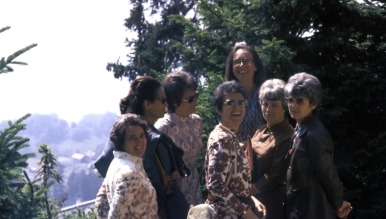
Nov 22, 2016 | Focolare Worldwide
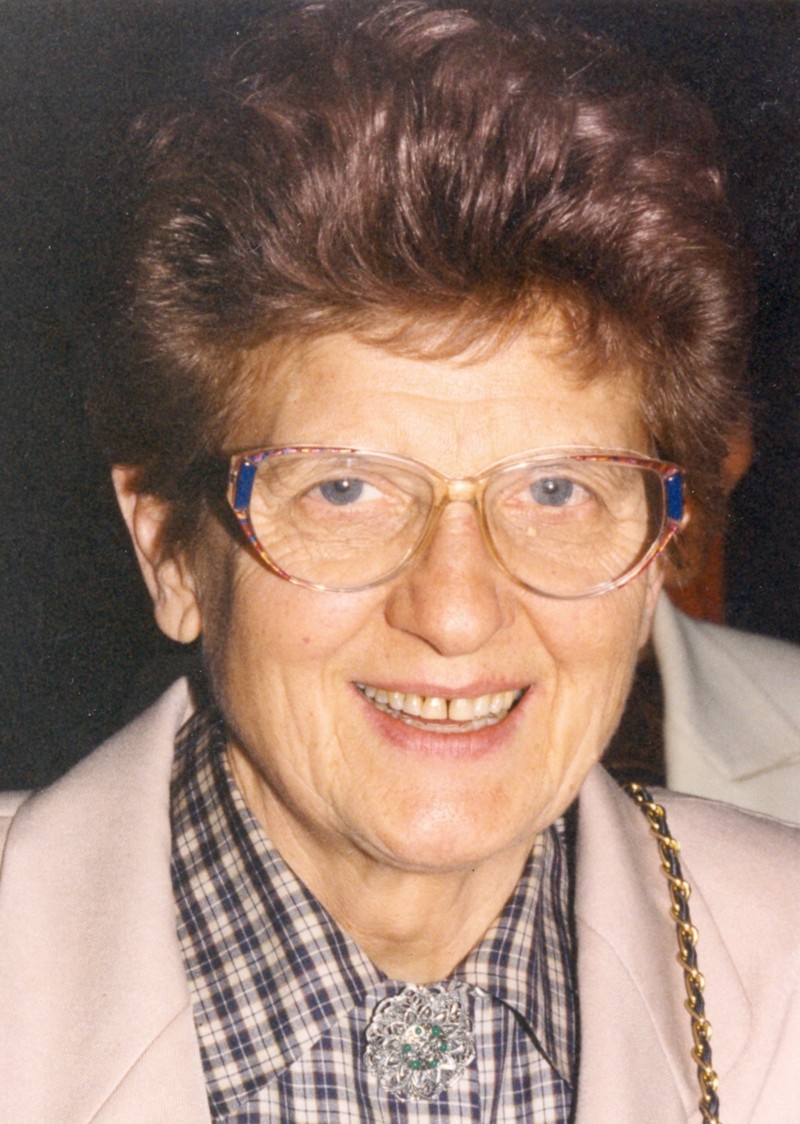 “Let us accompany Aletta with joy and immense gratitude to the house of the Father. We couldn’t have a better model of one who “gave her life unsparingly” to God, as today’s daily thought suggests.” This is how Maria Voce informed the members of the Focolare Movement of the death of Vittoria Salizzoni, who passed away peacefully on the morning of 22 November, a few days before reaching the age of 92 years. Vittoria Salizzoni was born in Martignano (Trent) on 27 November 1924. She was the third of 8 children born to Mary and David Salizzoni. She lived in France for 12 years where she had emigrated with her family. In 1941, she returned to Trento and on 7 January 1945, during World War II, she met Chiara Lubich, and remained close to her for many years.
“Let us accompany Aletta with joy and immense gratitude to the house of the Father. We couldn’t have a better model of one who “gave her life unsparingly” to God, as today’s daily thought suggests.” This is how Maria Voce informed the members of the Focolare Movement of the death of Vittoria Salizzoni, who passed away peacefully on the morning of 22 November, a few days before reaching the age of 92 years. Vittoria Salizzoni was born in Martignano (Trent) on 27 November 1924. She was the third of 8 children born to Mary and David Salizzoni. She lived in France for 12 years where she had emigrated with her family. In 1941, she returned to Trento and on 7 January 1945, during World War II, she met Chiara Lubich, and remained close to her for many years.

Aletta Salizzoni (right) with some of the first companions of Chiara Lubich
Nov 22, 2016 | Focolare Worldwide
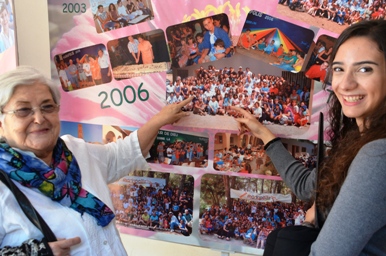
Nov 21, 2016 | Focolare Worldwide, Senza categoria
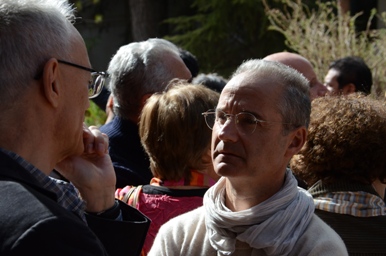 A country in which Christians are less than 1% of the population, Algeria was the first Muslim country to welcome the spirituality of unity in the mid-1960s. They were difficult years of transition and development in this strategic region. Here, the monks of Tibhirine are universally honoured as an example that transcends religious differences and points to the fraternal relationship that unites all the members of the human race. “Chiara Lubich had invited us not to stop in the face of the present difficulties,” Rosi Berolasi recalls. She spent 13 years in the focolare in Algiers. “Looking at it through her eyes, the experience we lived was charged with hope. She already saw the life that would later develop.” Rosi goes on to say: “Also the then bishop of Algiers, Cardinal Duval, had always encouraged us and today we are glad to say that there are Muslim men and women who have their own experience as members of the Focolare Movement.” In Tlemcen the 50th anniversary of the Focolare Movement’s arrival was celebrated last year at the beginning of November. Algeria opened the door to many other countries of North Africa and the Middle East. Archbishop Emeritus of Algiers, Archbishop Tessier, and Bishop of Orano, Bishop Vesco also attended the celebrations, along with Focolare co-president, Jesús Morán and people representing Focolare communities in several regions of the Middle East, inlcuding Syria. French focolarino, Pierre Le Vaslot, who now lives in Italy, remembered their arrival as if it was yesterday. He spoke at the current Mariapolis Centre which is named after Ulisse Caglioni (March 5, 1943 – September 1, 2003). Ulisse was one of those focolarini that spent their lives giving selfless witness to universal brotherhood ever since they arrived on October 5, 1966 in a Citroën that they had driven all the way from Paris.
A country in which Christians are less than 1% of the population, Algeria was the first Muslim country to welcome the spirituality of unity in the mid-1960s. They were difficult years of transition and development in this strategic region. Here, the monks of Tibhirine are universally honoured as an example that transcends religious differences and points to the fraternal relationship that unites all the members of the human race. “Chiara Lubich had invited us not to stop in the face of the present difficulties,” Rosi Berolasi recalls. She spent 13 years in the focolare in Algiers. “Looking at it through her eyes, the experience we lived was charged with hope. She already saw the life that would later develop.” Rosi goes on to say: “Also the then bishop of Algiers, Cardinal Duval, had always encouraged us and today we are glad to say that there are Muslim men and women who have their own experience as members of the Focolare Movement.” In Tlemcen the 50th anniversary of the Focolare Movement’s arrival was celebrated last year at the beginning of November. Algeria opened the door to many other countries of North Africa and the Middle East. Archbishop Emeritus of Algiers, Archbishop Tessier, and Bishop of Orano, Bishop Vesco also attended the celebrations, along with Focolare co-president, Jesús Morán and people representing Focolare communities in several regions of the Middle East, inlcuding Syria. French focolarino, Pierre Le Vaslot, who now lives in Italy, remembered their arrival as if it was yesterday. He spoke at the current Mariapolis Centre which is named after Ulisse Caglioni (March 5, 1943 – September 1, 2003). Ulisse was one of those focolarini that spent their lives giving selfless witness to universal brotherhood ever since they arrived on October 5, 1966 in a Citroën that they had driven all the way from Paris.  Upon their arrival the three focolarini – Pierre, Ulisse and Salvatore Strippoli – found themselves standing in front of the abandoned Benedictine Monastery that needed to be rebuilt. It had been constructed in the 1950s by German Abbot, Dom Walzer, who had been driven out of German for refusing to welcome Hitler at the Abbey of Beuron. The monastery is built against a mountain, at 900 metres and a few steps away from the tomb of Sufi mystic, Sidi Boumedienne, who left a strong spiritual imprint on the local region and beyond. The location is a perfect setting for gathering, hospitality and dialogue. It’s peaceful and serene. An experience of presence and sharing life began at the Dar es Salam centre in Tlemcen with people from the city. “It was a joy for us in Orano, to see the monastery brought back to life,” says the then young priest Theirry Becker. “But who are these focolarini? Nobody has ever heard of them. They’re neither priests nor monks, yet they live in community. They came to live unity and to make unity come alive in the people around them. I listened to them talk about their ideal, about Chiara Lubich, from whom I began to learn more about the spirituality. They immediately got to work, and Ulisse soon transformed the whole house.” Those were years of constant experiences, such as the contact with Imam Barkat. The focolarini had helped him save his little son, taking him to hospital in the middle of the night and insisting with the doctors. It would be this very Imam and father of the little one, to go to the focolare to give courses on the prophetic Hadiths and offer correct explanations of their spiritual writings. There were also very moving words from the first young people who were regulars at the focolare in Tlemcen in the 1960s – Mourad, Bouziane and Farouk. Now they are happily married with children of their own, and the new generations are carrying forward the ideal which they were the first to believe in. Maria Chiara De Lorenzo
Upon their arrival the three focolarini – Pierre, Ulisse and Salvatore Strippoli – found themselves standing in front of the abandoned Benedictine Monastery that needed to be rebuilt. It had been constructed in the 1950s by German Abbot, Dom Walzer, who had been driven out of German for refusing to welcome Hitler at the Abbey of Beuron. The monastery is built against a mountain, at 900 metres and a few steps away from the tomb of Sufi mystic, Sidi Boumedienne, who left a strong spiritual imprint on the local region and beyond. The location is a perfect setting for gathering, hospitality and dialogue. It’s peaceful and serene. An experience of presence and sharing life began at the Dar es Salam centre in Tlemcen with people from the city. “It was a joy for us in Orano, to see the monastery brought back to life,” says the then young priest Theirry Becker. “But who are these focolarini? Nobody has ever heard of them. They’re neither priests nor monks, yet they live in community. They came to live unity and to make unity come alive in the people around them. I listened to them talk about their ideal, about Chiara Lubich, from whom I began to learn more about the spirituality. They immediately got to work, and Ulisse soon transformed the whole house.” Those were years of constant experiences, such as the contact with Imam Barkat. The focolarini had helped him save his little son, taking him to hospital in the middle of the night and insisting with the doctors. It would be this very Imam and father of the little one, to go to the focolare to give courses on the prophetic Hadiths and offer correct explanations of their spiritual writings. There were also very moving words from the first young people who were regulars at the focolare in Tlemcen in the 1960s – Mourad, Bouziane and Farouk. Now they are happily married with children of their own, and the new generations are carrying forward the ideal which they were the first to believe in. Maria Chiara De Lorenzo

Nov 20, 2016 | Non categorizzato
 I thought I knew everything “As a priest, I thought I knew how to judge everything. One day I was invited to celebrate Mass at a retreat of some committed young people. During the rites they explicitly made a pact to be ready to give their lives for each other. I was shocked! Would I have been able to do such a thing? All that I knew it seemed, although not useless, was insufficient to be a true Christian. How many things were neglected in the name of studies? How many omissions were justified with some effort I thought was important! Those young people have changed my life.” (RP – France) Before the offering “After moving into the new village, the friendship that was born with a family in the neighbourhood greatly helped us to insert ourselves into the new environment, even helping the children get to school. There was mutual esteem.The children of that family called us uncle and auntie and so did our children also address them that way. Unfortunately, in time the relationship became a bit strained and the children of these neighbours began to greet us with a formal “Good morning”. It could not go on like this also because we belonged to the same parish. One Sunday at Mass, the Gospel passage reminded us that before making an offering at the altar, it would be well to reconcile oneself with the brother. My wife and I looked at each other and we decided to act accordingly. After Mass, we approached those neighbours and asked their forgiveness if we had offended them in some way. After a moment of awkwardness, we hugged each other.” (AT – Hungary) She was another person “In the hospital where I work as a gynecologist, a woman known as a prostitute was admitted. Other patients and even some nurses tried to avoid her. Noticing her isolation, I gave her particular attention and this encouraged others to also talk to her and give her some help. The same sad story of her life attracted attention and benevolence. In just a few days, she already seemed another person. When she was discharged from the hospital, she thanked me saying, “True healing is not physical. Life starts again in another way.” (MS – Poland)
I thought I knew everything “As a priest, I thought I knew how to judge everything. One day I was invited to celebrate Mass at a retreat of some committed young people. During the rites they explicitly made a pact to be ready to give their lives for each other. I was shocked! Would I have been able to do such a thing? All that I knew it seemed, although not useless, was insufficient to be a true Christian. How many things were neglected in the name of studies? How many omissions were justified with some effort I thought was important! Those young people have changed my life.” (RP – France) Before the offering “After moving into the new village, the friendship that was born with a family in the neighbourhood greatly helped us to insert ourselves into the new environment, even helping the children get to school. There was mutual esteem.The children of that family called us uncle and auntie and so did our children also address them that way. Unfortunately, in time the relationship became a bit strained and the children of these neighbours began to greet us with a formal “Good morning”. It could not go on like this also because we belonged to the same parish. One Sunday at Mass, the Gospel passage reminded us that before making an offering at the altar, it would be well to reconcile oneself with the brother. My wife and I looked at each other and we decided to act accordingly. After Mass, we approached those neighbours and asked their forgiveness if we had offended them in some way. After a moment of awkwardness, we hugged each other.” (AT – Hungary) She was another person “In the hospital where I work as a gynecologist, a woman known as a prostitute was admitted. Other patients and even some nurses tried to avoid her. Noticing her isolation, I gave her particular attention and this encouraged others to also talk to her and give her some help. The same sad story of her life attracted attention and benevolence. In just a few days, she already seemed another person. When she was discharged from the hospital, she thanked me saying, “True healing is not physical. Life starts again in another way.” (MS – Poland)
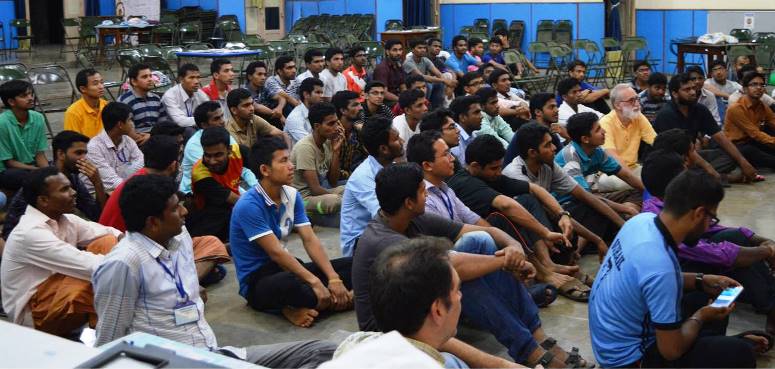
Nov 19, 2016 | Non categorizzato
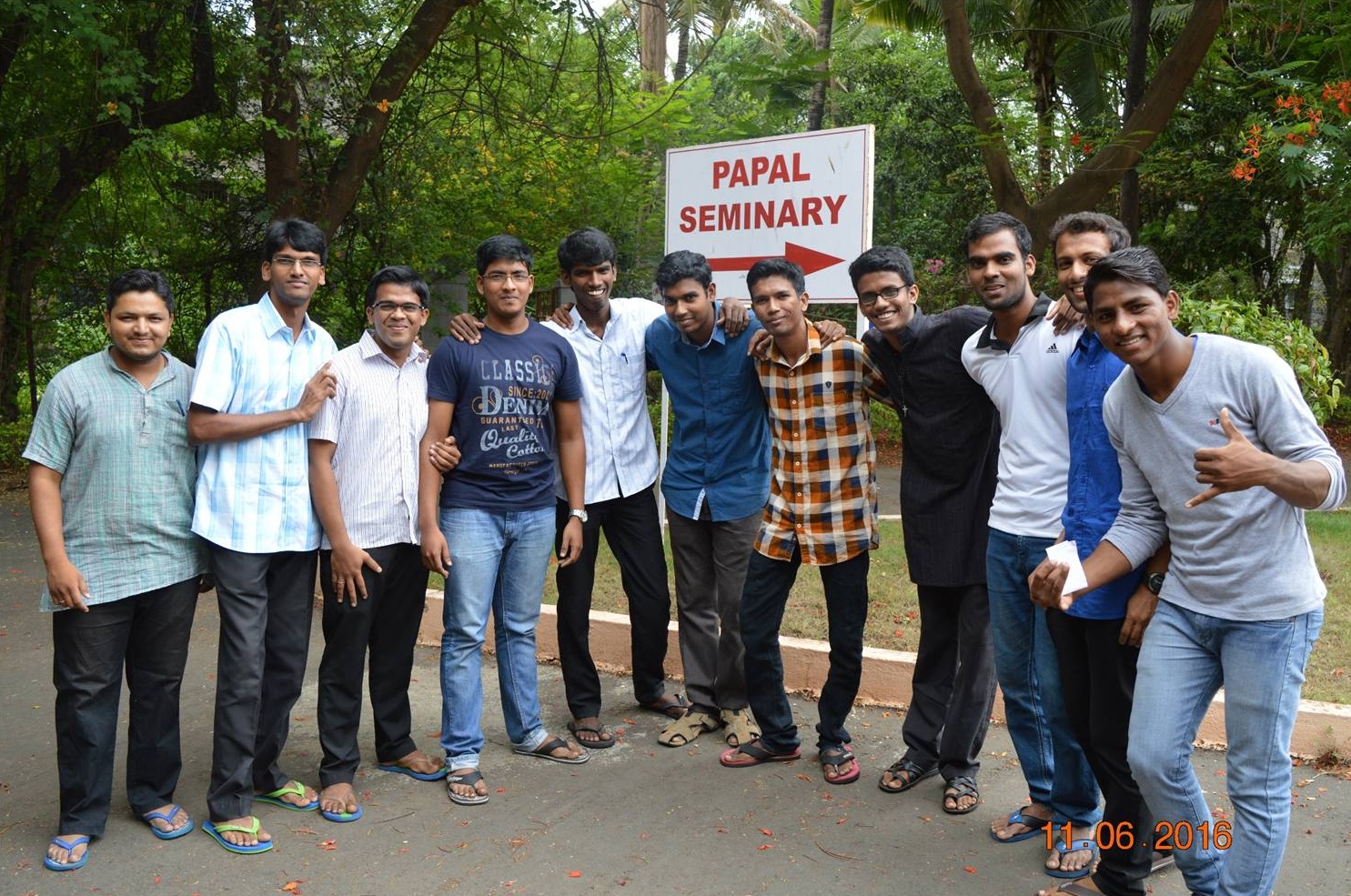 “I learned to be open and not to sweep the dust under the rug,” remarked one seminarians who had attended the workshop on group dynamics based on the Focolare’s spirituality of unity. “I realized that I have to think positive in all that I do,” said another one with great enthusiasm. The spirit of these young men is striking. It is also surprising that in India – a land with thousands of rites and divinities, a land of Hinduism and Buddhism – there should a Catholic seminary with so many young men. The Focolare’s relationship with the Pontifical Seminary of India goes back to 1980. Since then, focolarini on various occasions have been invited to present their spirituality to the seminarians. Many of those seminarians who moved on to become priests and bishops continued to promote the communitarian dimension of the Christian message, which is not always easy to do in their pastoral ministry. In 2016 they asked the Movement for a three-day workshop on group dynamics. It was the first time that the focolarini in Mumbai were faced with such a project, but they accepted the challenge. With a team of 12 men, women, experts from the fields of psychology and relationship, they got to work at putting together a programme for seminarians. It was a demanding task, because of the diversity of cultures among the seminarians who came from all over India, and also because of their different courses of study: from high school to philosophy and theology. The goal of the workshop was to provide the seminarians the tools they could use to help create a community. They had been asked to draw on those elements of Focolare spirituality that have to do with interpersonal relationships: “making ourselves one” with the other; deep listening; the pact of mutual love; sharing experiences of living the Word; giving priority to relationships. These tools were presented from the point of view of psychology and interpersonal relationships through a mixture of brief reports, roll play, testimonies of lay people and clergy and applying the tools to their own lives.
“I learned to be open and not to sweep the dust under the rug,” remarked one seminarians who had attended the workshop on group dynamics based on the Focolare’s spirituality of unity. “I realized that I have to think positive in all that I do,” said another one with great enthusiasm. The spirit of these young men is striking. It is also surprising that in India – a land with thousands of rites and divinities, a land of Hinduism and Buddhism – there should a Catholic seminary with so many young men. The Focolare’s relationship with the Pontifical Seminary of India goes back to 1980. Since then, focolarini on various occasions have been invited to present their spirituality to the seminarians. Many of those seminarians who moved on to become priests and bishops continued to promote the communitarian dimension of the Christian message, which is not always easy to do in their pastoral ministry. In 2016 they asked the Movement for a three-day workshop on group dynamics. It was the first time that the focolarini in Mumbai were faced with such a project, but they accepted the challenge. With a team of 12 men, women, experts from the fields of psychology and relationship, they got to work at putting together a programme for seminarians. It was a demanding task, because of the diversity of cultures among the seminarians who came from all over India, and also because of their different courses of study: from high school to philosophy and theology. The goal of the workshop was to provide the seminarians the tools they could use to help create a community. They had been asked to draw on those elements of Focolare spirituality that have to do with interpersonal relationships: “making ourselves one” with the other; deep listening; the pact of mutual love; sharing experiences of living the Word; giving priority to relationships. These tools were presented from the point of view of psychology and interpersonal relationships through a mixture of brief reports, roll play, testimonies of lay people and clergy and applying the tools to their own lives.  Right from the start the workshop was enthusiastically received and supported by the lively participation, which helped to make the passage from “me to us” that the young men were trying to make. Such a process will be very useful to them when they return to work in groups, and when they will be called upon to start up and conduct groups of other people. It will enable them to put into practice that culture of encounter that is so underscored by Pope Francis. Father George called the workshop “an authentic experience of God among the people.” The intuition to translate the spirituality into life, and the ideas into daily life, turned out to be a winning idea. This is confirmed by the abundant feedback that was written by the participants: “I can everything, but under one condition: that I’m always attentive to the others.” “The encouragement to put the Gospel into practice and not only study it, provoked a radical change in my life.” “This workshop has turned out to be a springboard for my vocation and my way of interacting. The other people’s stories were a great lesson for me.” “It was an extremely fruitful experience of training in being communion. New paths have opened before us. It’s a grace to be able to offer the spirituality of unity in the current social context.”
Right from the start the workshop was enthusiastically received and supported by the lively participation, which helped to make the passage from “me to us” that the young men were trying to make. Such a process will be very useful to them when they return to work in groups, and when they will be called upon to start up and conduct groups of other people. It will enable them to put into practice that culture of encounter that is so underscored by Pope Francis. Father George called the workshop “an authentic experience of God among the people.” The intuition to translate the spirituality into life, and the ideas into daily life, turned out to be a winning idea. This is confirmed by the abundant feedback that was written by the participants: “I can everything, but under one condition: that I’m always attentive to the others.” “The encouragement to put the Gospel into practice and not only study it, provoked a radical change in my life.” “This workshop has turned out to be a springboard for my vocation and my way of interacting. The other people’s stories were a great lesson for me.” “It was an extremely fruitful experience of training in being communion. New paths have opened before us. It’s a grace to be able to offer the spirituality of unity in the current social context.”
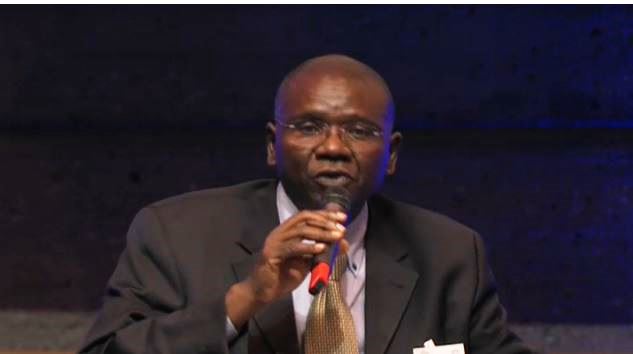
Nov 18, 2016 | Focolare Worldwide
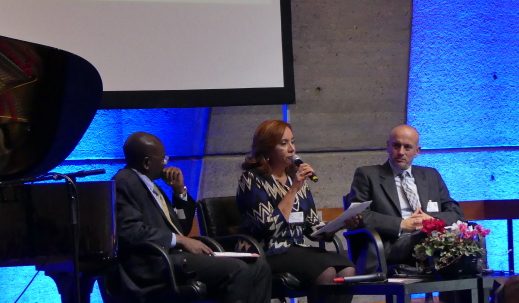 «In a world where globalisation dictates its laws, one of the most important paradoxes we are encountering is that the voice of the southern end of the world is being ignored. Though rich in natural resources like diamonds, gold, oil and other precious minerals, Africa faces: growing poverty and underdevelopment, the worst life expectancy, and a high level of illiteracy, despite the millions of dollars in western aid deposited along the years in various projects. Why? The dramatic response is not only the war we have to suffer, or diseases, but especially corruption which in Africa has become a normal and accepted fact, tearing the continent apart. It is a continent in which the poor have to be corrupt in order to survive, get treated in hospitals, enter one of the “best” professional schools, obtain jobs and get out of jail. Not even the laws are able to eradicate this evil. In most African countries, the law is of western origin, with some nuances taken from local cultures. Protection of the individual alone, for as much as is universally accepted, goes against the principle of the community, most dear to African traditions and that underline the importance of solidarity. The individual is such only if he belongs to a community and acts in function of the community. It is the principle of the “Ubuntu”: I exist because we exist. In the African culture, the Ubuntu is an invitation to support and help each other; it is the awareness of one’s own duties. This how Nelson Mandela put it: Ubuntu means to ask oneself, “Do I want to help the community around me to improve?” It is a rule of life based on respect for others, and a belief in a bond of sharing which unites all of humanity. It is a desire for peace. And yet, precisely in Africa, peace is lacking in many places and the remote cause of the conflicts is absurdly one’s own immense wealth. There are battles to control the minerals and the victims of these conflicts are the weakest people. In the effort to integrate one’s own values with those inherited from colonisation and in the face of the challenges of a world in which economic development gives the right to speak up, Africa is increasingly losing its own values, without acquiring the truly important ones. In my country, Cameroon, which is full of corruption, a small town arose. Chiara Lubich created it by carrying out social
«In a world where globalisation dictates its laws, one of the most important paradoxes we are encountering is that the voice of the southern end of the world is being ignored. Though rich in natural resources like diamonds, gold, oil and other precious minerals, Africa faces: growing poverty and underdevelopment, the worst life expectancy, and a high level of illiteracy, despite the millions of dollars in western aid deposited along the years in various projects. Why? The dramatic response is not only the war we have to suffer, or diseases, but especially corruption which in Africa has become a normal and accepted fact, tearing the continent apart. It is a continent in which the poor have to be corrupt in order to survive, get treated in hospitals, enter one of the “best” professional schools, obtain jobs and get out of jail. Not even the laws are able to eradicate this evil. In most African countries, the law is of western origin, with some nuances taken from local cultures. Protection of the individual alone, for as much as is universally accepted, goes against the principle of the community, most dear to African traditions and that underline the importance of solidarity. The individual is such only if he belongs to a community and acts in function of the community. It is the principle of the “Ubuntu”: I exist because we exist. In the African culture, the Ubuntu is an invitation to support and help each other; it is the awareness of one’s own duties. This how Nelson Mandela put it: Ubuntu means to ask oneself, “Do I want to help the community around me to improve?” It is a rule of life based on respect for others, and a belief in a bond of sharing which unites all of humanity. It is a desire for peace. And yet, precisely in Africa, peace is lacking in many places and the remote cause of the conflicts is absurdly one’s own immense wealth. There are battles to control the minerals and the victims of these conflicts are the weakest people. In the effort to integrate one’s own values with those inherited from colonisation and in the face of the challenges of a world in which economic development gives the right to speak up, Africa is increasingly losing its own values, without acquiring the truly important ones. In my country, Cameroon, which is full of corruption, a small town arose. Chiara Lubich created it by carrying out social  work in favour of the Bangwa people who were at risk of extinction but found salvation instead. But with this work, Chiara above all introduced a new lifestyle, drawing inspiration from the principle of fraternity: giving rise to a coexistence inspired by reciprocity in true justice, which squashes every quarrel, prevents conflicts, and finds solutions to problems also in the families; nobody steals, kills, and the “paths of peace” are pursued. Fraternity can thus become also a lawful principle for coexistence, change relationships in the name of acceptance and inclusion, and translate into solidarity, responsibility and mutual assistance. Peace is expressed today as development, security, universality of human rights, and respect for life: peace is a right, but awaits that lawfulness to be used as its tool. And for this, Declarations and Treaties will not suffice if expressed only in the singular sense, affirming the individual and giving room to interests and conflicts. The “universal” does not mean “absolute,” but “collective”; it is what unites otherwise there will be no relationships between individuals and cultures, or concepts that clash with each other . And if universality enclosed in human dignity allows relationships with each other, fraternity which is the new paradigm, may be the new inspiring principle until it “becomes” also part of the legal system that paves the way for peace. What is born in the heart and translated into coherent attitudes in daily life, will be able to transform relational conflicts into sharing, and ultimately into reciprocity, where what is due is given as a gift to others». Raphaël Takougang
work in favour of the Bangwa people who were at risk of extinction but found salvation instead. But with this work, Chiara above all introduced a new lifestyle, drawing inspiration from the principle of fraternity: giving rise to a coexistence inspired by reciprocity in true justice, which squashes every quarrel, prevents conflicts, and finds solutions to problems also in the families; nobody steals, kills, and the “paths of peace” are pursued. Fraternity can thus become also a lawful principle for coexistence, change relationships in the name of acceptance and inclusion, and translate into solidarity, responsibility and mutual assistance. Peace is expressed today as development, security, universality of human rights, and respect for life: peace is a right, but awaits that lawfulness to be used as its tool. And for this, Declarations and Treaties will not suffice if expressed only in the singular sense, affirming the individual and giving room to interests and conflicts. The “universal” does not mean “absolute,” but “collective”; it is what unites otherwise there will be no relationships between individuals and cultures, or concepts that clash with each other . And if universality enclosed in human dignity allows relationships with each other, fraternity which is the new paradigm, may be the new inspiring principle until it “becomes” also part of the legal system that paves the way for peace. What is born in the heart and translated into coherent attitudes in daily life, will be able to transform relational conflicts into sharing, and ultimately into reciprocity, where what is due is given as a gift to others». Raphaël Takougang
![The simplicity of Aletta]()
Nov 17, 2016 | Non categorizzato
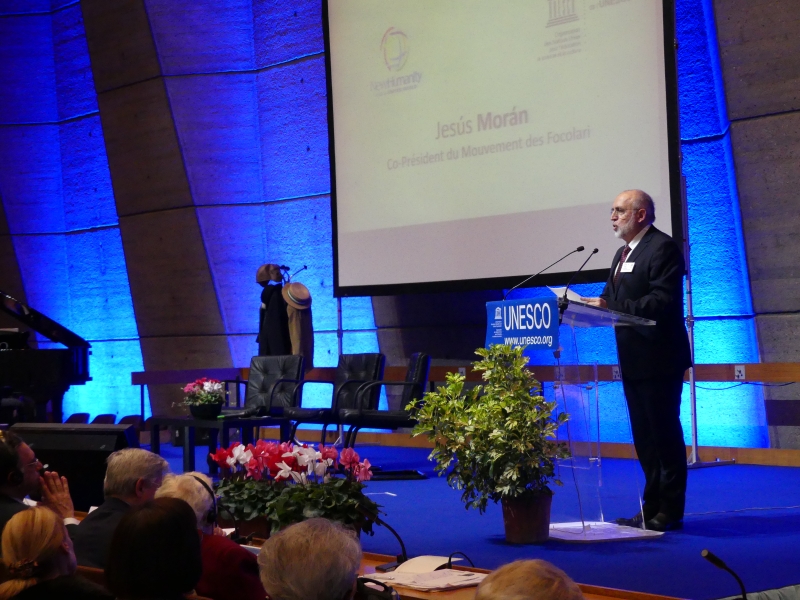
Jesús Morán © Fabio Bertagnin – CSC Audiovisivi
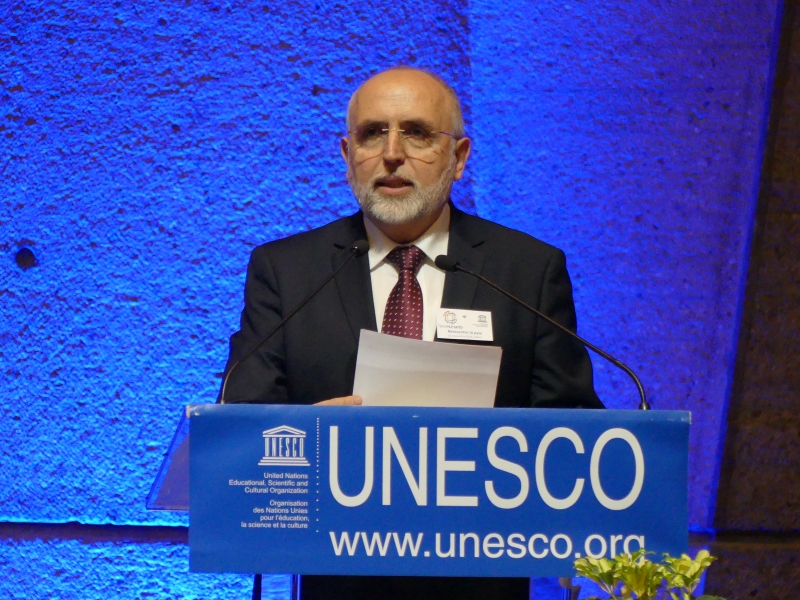
Jesús Morán © Fabio Bertagnin – CSC Audiovisivi
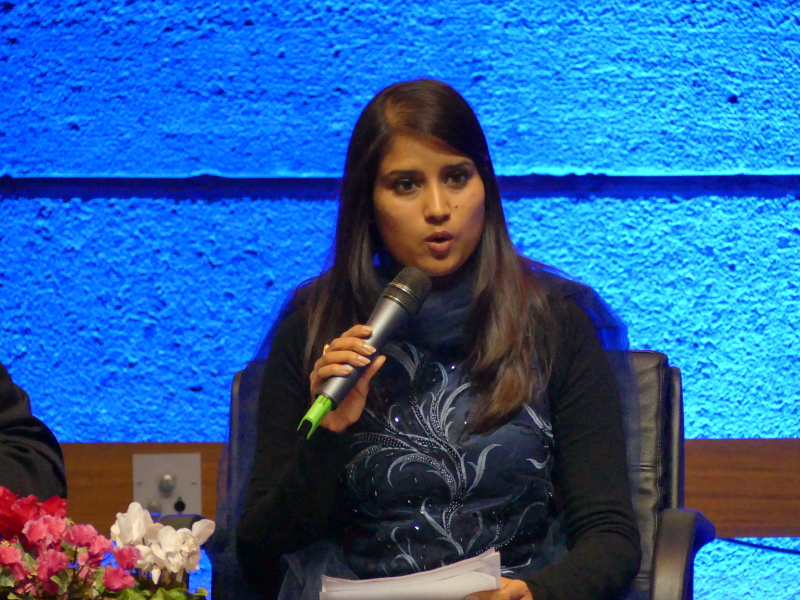
Nov 16, 2016 | Focolare Worldwide

Arooj Javed. Photo © Fabio Bertagnin – CSC Audiovisivi
“Today’s young people aspire to become global citizens and we aspire to a united world,” concluded Arooj Javed, a young student in International Relations, a statement which sums up the objectives of New Humanity.
This celebration of the 20th anniversary of the awarding of the Peace Education Prize to Chiara Lubich was not a nostalgic revisiting of the event. The recent US elections, the tragedy of refugees, climatic change, rising inequality, the greed-dominated markets – all these dramatic happenings, evoked by the various speakers, fully justified the title chosen for the symposium: “Reinventing Peace”. It was to discover – beginning with the Focolare communitarian spirituality – “new solutions” to the “agonizing face of new situations of war”, as expressed by Jesús Morán, the co-President of the Movement. Several catchphrases shed light on these reflections: intercultural laboratories, universal brotherhood, interreligious solidarity, the efforts of co-habitation and, above all, education in dialogue and peace.
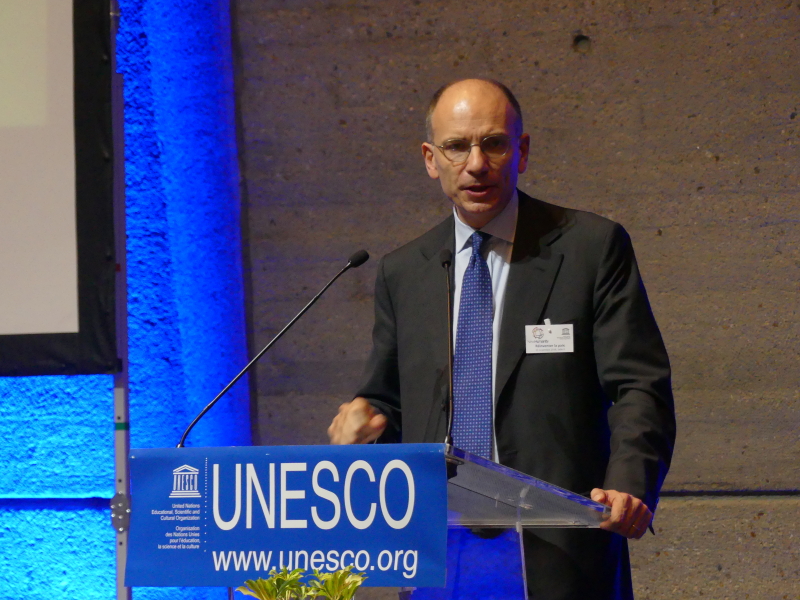
Enrico Letta. Photo © Fabio Bertagnin – CSC Audiovisivi
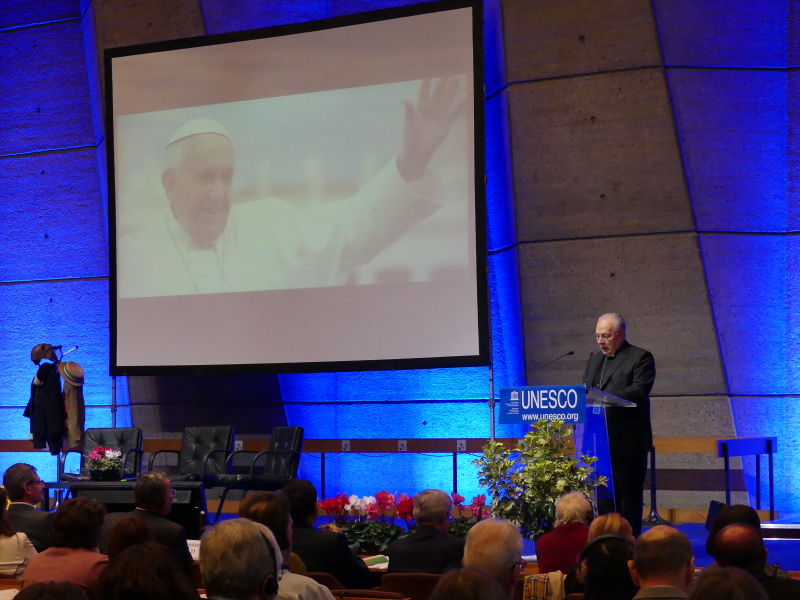
Francesco Follo, permanent observer of the Holy See to UNESCO, Photo © Fabio Bertagnin – CSC Audiovisivi
Chantal Joly (Paris)
Replay web streaming
Nov 15, 2016 | Senza categoria
- Date of Death: 16/11/2016
- Branch of belonging: Member of New Families
- Nation: Italy
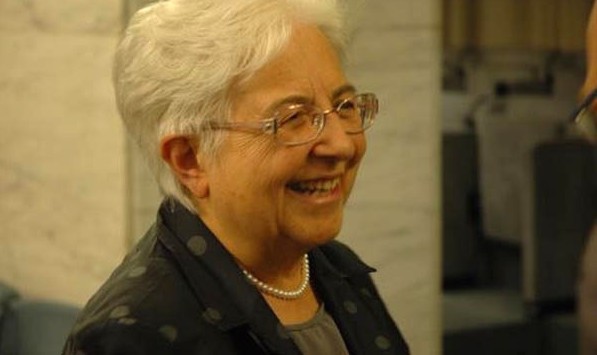
Nov 15, 2016 | Focolare Worldwide, Senza categoria
 “Every day we are presented with images of a world torn by conflicts of all kinds; we see walls being built, migrants and refugees fleeing from poverty and war; and contrasting forms of political self-interest fail to consider the human consequences of their actions.” This was Focolare President Maria Voce’s description of the world scene today, in a talk read on her behalf by Catherine Belzung. This world scene, she recalled, has often been described by Pope Francis as a “piecemeal third world war”. Its violence is unconventional, ubiquitous and pervasive; it is hard to defeat with the tools used up to now. … These conflicts can only be ended through collective commitment, not only on the part of the international community but by the community of all people in the world. No one can consider themselves excluded from this process. It must go through our streets, into our workplaces, our educational establishments, into sports centres and places of entertainment, communication and worship. The response to the “piecemeal world war” is to build world peace “one piece at a time”, through small steps, and concrete gestures. Everyone has a role to play. Everyone is responsible.” Maria Voce emphasised the commitment of international organisations, civil society, associations and movements. She mentioned her own movement which draws on the experience of 70 years of work for unity and peace initiated by Chiara Lubich and taken ahead in the most varied parts of the world in a 360ͦ dialogue, with in the Christian world, with other religions and with people of non-religious beliefs. It is a dialogue “founded on receptivity to people, on a deep understanding of their choices and ideas, appreciating all that is beautiful and positive, all that we might hold in common and that can create bonds. Fraternity can give rise to projects and actions in the complex political, economic, cultural and social fabric of our world. Fraternity Maria Voce affirmed, quoting Chiara Lubich “can give rise to projects and actions in the complex political, economic, cultural and social fabric of our world. Fraternity brings peoples out of their isolation and can offer the opportunity for development to those still excluded from it. It shows us how to resolve differences peacefully and relegates war to history books. Fraternity in action allows us to dream and even to hope for some kind of communion of goods between rich countries and poor countries, given that the scandalous economic inequality in today’s world is one of the main causes of terrorism. The deep need for peace expressed by humanity today shows that living as brothers and sisters is not only a value, not only a method, but is a global paradigm for political development».[1] “On these foundations, Maria Voce continued, it is possible to rethink peace, indeed to reinvent it.” She gave some examples, first of all a profound commitment to dialogue; engaging in projects that are not conditioned by short term or partial interests; breaking down the walls of indifference and acting responsibly to reduce inequality; promoting a culture of legality and caring for creation. Reinventing peace means loving our enemies. … Reinventing peace means forgiveness. Forgiveness is not the opposite of international justice but makes it possible for relationships to start again on a different footing. … This is why work is needed in terms of education and culture. We need to invest in knowledge and learning, as this Institution does … Lastly, reinventing peace means loving other countries as our own, loving other peoples, ethnicities and cultures as our own. Read the full text [1] Message to Prof. Benjamin Barber for the Interdependence Day, Rome, 10th November 2003.
“Every day we are presented with images of a world torn by conflicts of all kinds; we see walls being built, migrants and refugees fleeing from poverty and war; and contrasting forms of political self-interest fail to consider the human consequences of their actions.” This was Focolare President Maria Voce’s description of the world scene today, in a talk read on her behalf by Catherine Belzung. This world scene, she recalled, has often been described by Pope Francis as a “piecemeal third world war”. Its violence is unconventional, ubiquitous and pervasive; it is hard to defeat with the tools used up to now. … These conflicts can only be ended through collective commitment, not only on the part of the international community but by the community of all people in the world. No one can consider themselves excluded from this process. It must go through our streets, into our workplaces, our educational establishments, into sports centres and places of entertainment, communication and worship. The response to the “piecemeal world war” is to build world peace “one piece at a time”, through small steps, and concrete gestures. Everyone has a role to play. Everyone is responsible.” Maria Voce emphasised the commitment of international organisations, civil society, associations and movements. She mentioned her own movement which draws on the experience of 70 years of work for unity and peace initiated by Chiara Lubich and taken ahead in the most varied parts of the world in a 360ͦ dialogue, with in the Christian world, with other religions and with people of non-religious beliefs. It is a dialogue “founded on receptivity to people, on a deep understanding of their choices and ideas, appreciating all that is beautiful and positive, all that we might hold in common and that can create bonds. Fraternity can give rise to projects and actions in the complex political, economic, cultural and social fabric of our world. Fraternity Maria Voce affirmed, quoting Chiara Lubich “can give rise to projects and actions in the complex political, economic, cultural and social fabric of our world. Fraternity brings peoples out of their isolation and can offer the opportunity for development to those still excluded from it. It shows us how to resolve differences peacefully and relegates war to history books. Fraternity in action allows us to dream and even to hope for some kind of communion of goods between rich countries and poor countries, given that the scandalous economic inequality in today’s world is one of the main causes of terrorism. The deep need for peace expressed by humanity today shows that living as brothers and sisters is not only a value, not only a method, but is a global paradigm for political development».[1] “On these foundations, Maria Voce continued, it is possible to rethink peace, indeed to reinvent it.” She gave some examples, first of all a profound commitment to dialogue; engaging in projects that are not conditioned by short term or partial interests; breaking down the walls of indifference and acting responsibly to reduce inequality; promoting a culture of legality and caring for creation. Reinventing peace means loving our enemies. … Reinventing peace means forgiveness. Forgiveness is not the opposite of international justice but makes it possible for relationships to start again on a different footing. … This is why work is needed in terms of education and culture. We need to invest in knowledge and learning, as this Institution does … Lastly, reinventing peace means loving other countries as our own, loving other peoples, ethnicities and cultures as our own. Read the full text [1] Message to Prof. Benjamin Barber for the Interdependence Day, Rome, 10th November 2003.
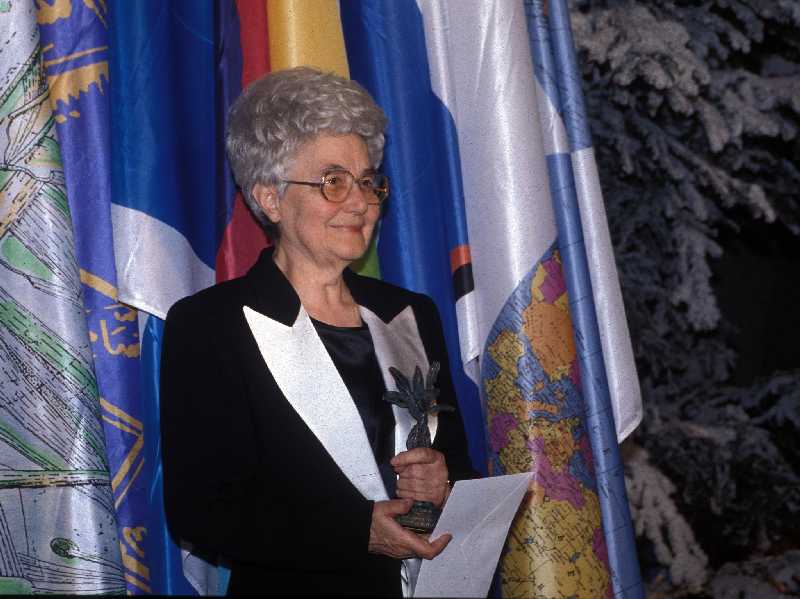
Nov 15, 2016 | Focolare Worldwide, Senza categoria
Live streaming can be followed from 10.00 to 13.00hrs and from 15.00 to 18.00hrs.  The event “Reinventing Peace” will be held at the UNESCO headquarters just two days after the first anniversary of the tragic terrorist attacks that happened in Paris. On the twentieth anniversary of the Prize for Peace Education awarded to Chiara Lubich, the Focolare Movement, in collaboration with the Directorate-General of UNESCO and the Permanent Observer Mission of the Holy See, will give voice to the commitment towards building peace and universal brotherhood lived with determination and creativity in many places all over the world. As Maria Voce, President of the Focolare Movement, said at the United Nations in April 2015, this daily commitment, which involves people of different cultures and religions, “is not limited to tollerance or to just accepting diversity”, but “it goes even beyond reconciliation, and creates, so to say, a new identity, which is broader and more shared. It is dialogue in action, which involves people of different beliefs, even non-religious ones, and urges towards answering to practical needs”. While referring to the actual commitment exercised even in situations affected by serious crises, Maria Voce stated that “it is not the time for half measures. If extreme violence is present, (…) the answer to it should be as radical, but structurally different, which means that one should answer with the extremism of dialogue. This dialogue requires maximum involvement; it is risky, demanding, challenging and aims at eradicating the roots of misunderstanding, fear and resentment”. The programme will be introduced by Marco Desalvo, President of New Humanity (the Focolare Movement NGO at the United Nations) and by a UNESCO Representative. Then, there will a word of welcome by Mons. Francesco Follo, Permanent Observer of the Holy See, followed by a talk from Jesús Morán, the Co-president of the Focolare Movement. This session will be concluded by Maria Voce, who will address the audience about “Reinventing peace”. The second part of the morning session will be interdisciplinary and intergenerational, and it will be enriched by multimedia contents. Concrete evidence in favour of unity and peace will be shared during the five brief panel talks on: Peace is Education; Peace is an Asset; Peace is Right; Peace is Green; Peace is Art. “Dialogue as a remedy for divisions in the world”, the theme for the afternoon session, will focus on key ideas for a new humanism that leads to the unity of the human family. The opening address of this session will be given by Enrico Letta, President of the Jacques Delors Institute, Discussions on two main topics will follow Rita Moussallem, co-director of the Focolare International Centre for Interreligious Dialogue will be the moderator on the panel for the first topic: “Religions: a problem or a resource for peace?”. The speakers will be Adnane Ben Abdelmajid Mokrani, Pontifical Institute for Arabic and Islamic Studies, Italy; Fabio Petito, International Relations at Sussex University, United Kingdom and Léonce Bekemans, economist and specialist of European Studies at “Chaire Jean Monnet”, Italy. The second topic: “Politics and economy in international disorder” will be moderated by Pál Tóth, Sophia University Institute, Italy. Pasquale Ferrara, Ambassador of Italy to Algeria; Silvia Costa, Chairperson of the European Parliament Commission on Culture and Education; and Damien Kattar, former Lebanese Minister of Finance will be the members on the second panel. Source: Press releases (SIF) Brochure: page1 – page 2 Invitation: Unesco Event Read Chiara Lubich’s speech in 1996
The event “Reinventing Peace” will be held at the UNESCO headquarters just two days after the first anniversary of the tragic terrorist attacks that happened in Paris. On the twentieth anniversary of the Prize for Peace Education awarded to Chiara Lubich, the Focolare Movement, in collaboration with the Directorate-General of UNESCO and the Permanent Observer Mission of the Holy See, will give voice to the commitment towards building peace and universal brotherhood lived with determination and creativity in many places all over the world. As Maria Voce, President of the Focolare Movement, said at the United Nations in April 2015, this daily commitment, which involves people of different cultures and religions, “is not limited to tollerance or to just accepting diversity”, but “it goes even beyond reconciliation, and creates, so to say, a new identity, which is broader and more shared. It is dialogue in action, which involves people of different beliefs, even non-religious ones, and urges towards answering to practical needs”. While referring to the actual commitment exercised even in situations affected by serious crises, Maria Voce stated that “it is not the time for half measures. If extreme violence is present, (…) the answer to it should be as radical, but structurally different, which means that one should answer with the extremism of dialogue. This dialogue requires maximum involvement; it is risky, demanding, challenging and aims at eradicating the roots of misunderstanding, fear and resentment”. The programme will be introduced by Marco Desalvo, President of New Humanity (the Focolare Movement NGO at the United Nations) and by a UNESCO Representative. Then, there will a word of welcome by Mons. Francesco Follo, Permanent Observer of the Holy See, followed by a talk from Jesús Morán, the Co-president of the Focolare Movement. This session will be concluded by Maria Voce, who will address the audience about “Reinventing peace”. The second part of the morning session will be interdisciplinary and intergenerational, and it will be enriched by multimedia contents. Concrete evidence in favour of unity and peace will be shared during the five brief panel talks on: Peace is Education; Peace is an Asset; Peace is Right; Peace is Green; Peace is Art. “Dialogue as a remedy for divisions in the world”, the theme for the afternoon session, will focus on key ideas for a new humanism that leads to the unity of the human family. The opening address of this session will be given by Enrico Letta, President of the Jacques Delors Institute, Discussions on two main topics will follow Rita Moussallem, co-director of the Focolare International Centre for Interreligious Dialogue will be the moderator on the panel for the first topic: “Religions: a problem or a resource for peace?”. The speakers will be Adnane Ben Abdelmajid Mokrani, Pontifical Institute for Arabic and Islamic Studies, Italy; Fabio Petito, International Relations at Sussex University, United Kingdom and Léonce Bekemans, economist and specialist of European Studies at “Chaire Jean Monnet”, Italy. The second topic: “Politics and economy in international disorder” will be moderated by Pál Tóth, Sophia University Institute, Italy. Pasquale Ferrara, Ambassador of Italy to Algeria; Silvia Costa, Chairperson of the European Parliament Commission on Culture and Education; and Damien Kattar, former Lebanese Minister of Finance will be the members on the second panel. Source: Press releases (SIF) Brochure: page1 – page 2 Invitation: Unesco Event Read Chiara Lubich’s speech in 1996
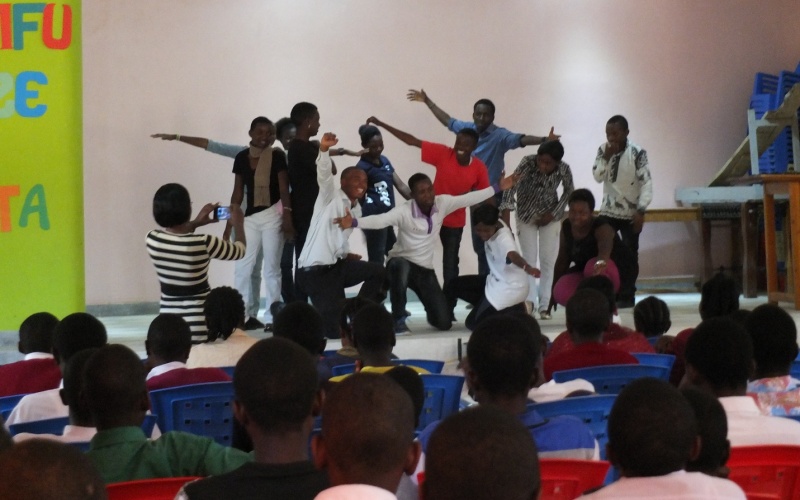
Nov 14, 2016 | Non categorizzato
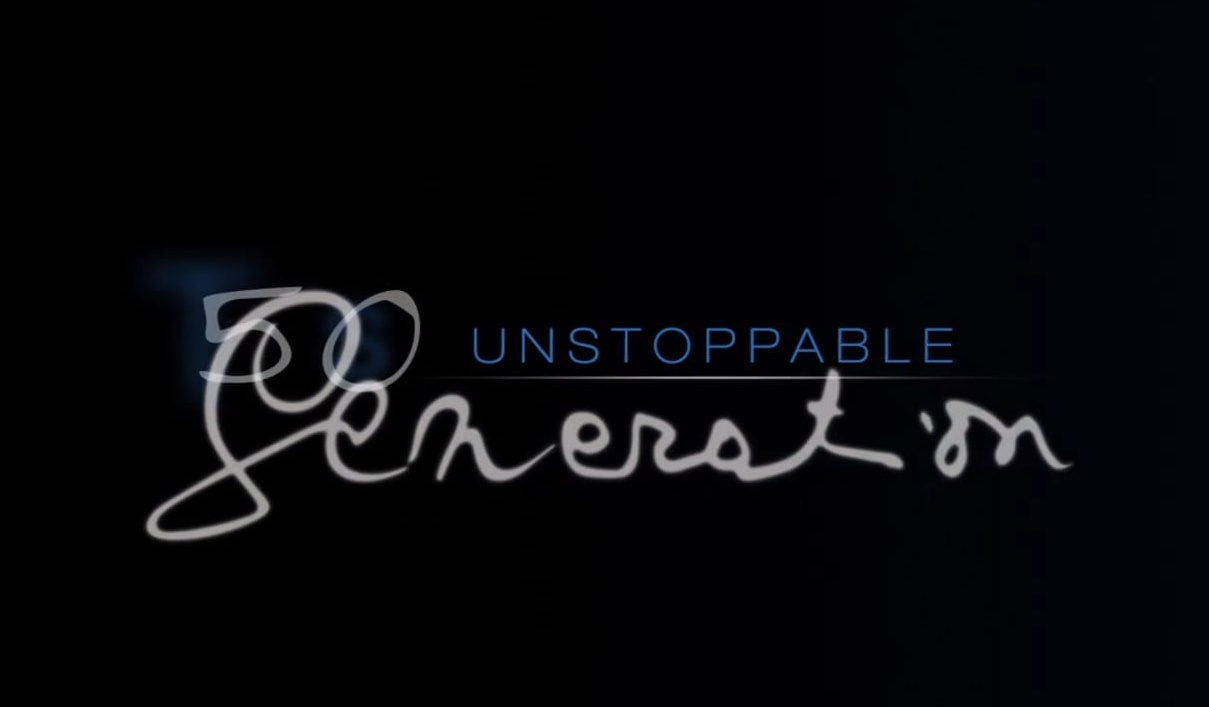 The Gen Movement has been around for fifty years, and still possesses the same freshness and the same ideal as when it first began. The Gen are the new generation of the Focolare. They will be gathering for their congress at Castel Gandolfo on November 17-20, 2016. A thousand young people will attend from all parts of the world. It’s not just any congress this time, but the big celebration of their 50th anniversary. In 1966, Chiara Lubich had appealed to the Focolare’s young people, that they engage the greatest number of their peers in living Jesus’s prayer “that all may be one.” Today, the Gen are everywhere: they belong to different religious faiths, speak many languages and dialects, and show the same enthusiasm and evangelical zeal that they had at the beginning.
The Gen Movement has been around for fifty years, and still possesses the same freshness and the same ideal as when it first began. The Gen are the new generation of the Focolare. They will be gathering for their congress at Castel Gandolfo on November 17-20, 2016. A thousand young people will attend from all parts of the world. It’s not just any congress this time, but the big celebration of their 50th anniversary. In 1966, Chiara Lubich had appealed to the Focolare’s young people, that they engage the greatest number of their peers in living Jesus’s prayer “that all may be one.” Today, the Gen are everywhere: they belong to different religious faiths, speak many languages and dialects, and show the same enthusiasm and evangelical zeal that they had at the beginning.  The first person to be raised to the glory of the altars by living Chiara Lubich’ spirituality of unity, was a Gen – young Chiara Luce Badano. She died in 1990 at the age of 18 and was beatified in 2010. She has become an example of belief in God’s love, both for young people and adults, even amidst illness and suffering. Each year, her feast day is celebrated around the world on October 29th.
The first person to be raised to the glory of the altars by living Chiara Lubich’ spirituality of unity, was a Gen – young Chiara Luce Badano. She died in 1990 at the age of 18 and was beatified in 2010. She has become an example of belief in God’s love, both for young people and adults, even amidst illness and suffering. Each year, her feast day is celebrated around the world on October 29th.  A few weeks ago the Gen held a celebration in Iringa, Tanzania where they presented her as a model of Christian life. They showed a video on Chiara Luce to a hundred young people, which was followed by testimonies and traditional dances. “I learned so much: for example, that I should love whoever is beside me. Here I discovered that it’s possible to be together in love, despite our differences.” “What touches me is Chiara Luce’s patience. She accepted her illness in its entirety, living every moment without complaint.” Despite all obstacles, the Gen forged ahead, for 50 years. They are truly the “Unstoppable generation”! Chiara Favotti
A few weeks ago the Gen held a celebration in Iringa, Tanzania where they presented her as a model of Christian life. They showed a video on Chiara Luce to a hundred young people, which was followed by testimonies and traditional dances. “I learned so much: for example, that I should love whoever is beside me. Here I discovered that it’s possible to be together in love, despite our differences.” “What touches me is Chiara Luce’s patience. She accepted her illness in its entirety, living every moment without complaint.” Despite all obstacles, the Gen forged ahead, for 50 years. They are truly the “Unstoppable generation”! Chiara Favotti
Fragments of history of the Gen Movement https://vimeo.com/191033570 https://vimeo.com/191033565 https://vimeo.com/191033568 https://vimeo.com/191033569 https://vimeo.com/191039964 https://vimeo.com/191033564
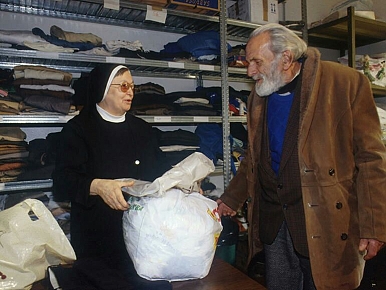
Nov 13, 2016 | Non categorizzato
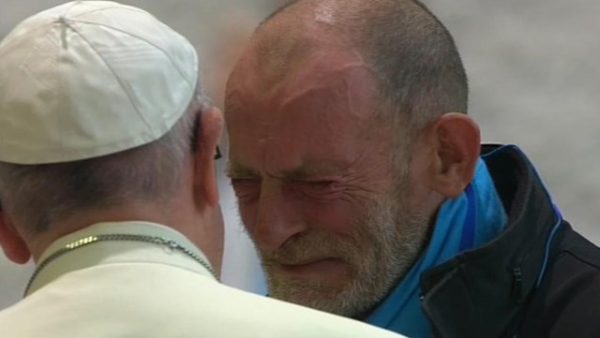 “A Church of the poor means two things mainly: the Church should be poor as Christ was poor, if it wants to proclaim the kingdom of God, if it wants its message to be effective. And all Christians who share in the life of the Church should be poor in spirit. Then the message of salvation would be more easily accepted by the poor; whereas, for the rich it will be difficult to enter the kingdom of Heaven than for a camel to go through the eye of a needle…. This Church of and for the poor should not make us imagine any similar socio-political version of it for the world. (…) When Jesus speaks of the poor, he means those who are being tested, who are humble, who are deprived of reassurance and beyond any real support that they can depend on – yet, they turn to God their just benefactor. The Greek translators of the Bible understood that the poverty of these poor was not merely material deprivation; in fact, they did not translate the Hebrew word anaw (poor), as ‘pauper’ or ‘destitute’ but preferred to use the word praus, which evokes meekness and resignation in the midst of hardship and trial.
“A Church of the poor means two things mainly: the Church should be poor as Christ was poor, if it wants to proclaim the kingdom of God, if it wants its message to be effective. And all Christians who share in the life of the Church should be poor in spirit. Then the message of salvation would be more easily accepted by the poor; whereas, for the rich it will be difficult to enter the kingdom of Heaven than for a camel to go through the eye of a needle…. This Church of and for the poor should not make us imagine any similar socio-political version of it for the world. (…) When Jesus speaks of the poor, he means those who are being tested, who are humble, who are deprived of reassurance and beyond any real support that they can depend on – yet, they turn to God their just benefactor. The Greek translators of the Bible understood that the poverty of these poor was not merely material deprivation; in fact, they did not translate the Hebrew word anaw (poor), as ‘pauper’ or ‘destitute’ but preferred to use the word praus, which evokes meekness and resignation in the midst of hardship and trial.  These poor, according to the Gospel, are also found among the privileged classes. Matthew’s Gospel tells us about Joseph of Arimathea, ‘a wealthy man and disciple of Jesus’ (27:57). He was also detached from his possessions; he was also poor and humble. (…) In his Apologeticum, Tertullian described the Christians of his day as those who did not aspire to or fight for positions in politics, even minor ones, because they were not motivated by personal ambition. On the other hand we find that many, who are economically disadvantaged, turn to messages they receive from outside the Church and support them. (…) This is why the Second Vatican Council invites us to think over our Christian living. Is it genuine? Does it bear the marks of poverty and humility? Poverty should result from love. Love is what will lead us to place our possessions at the disposal of the poor and needy. It is Christian love that banishes egoism and gives birth to communion. (…) Then the Church of the poor becomes the Church of communion between the rich that become poor and the poor that bring their needs, for the building of the Church together. (…) If we want that Church of the poor to return to taking on a role of witnessing in the process of evangelization, it will have to resurface at all levels of Christian life beginning from every point of the Church, from above and from below, from periphery to centre. (…) This will also have a reflection on the social and political level in new reforms that will be fundamentally Christian, if they are inspired by freedom. Some more sensitive spirits are not satisfied and still cry out that the Church must make itself poorer. (…) When someone makes a justified request, even when it is presented in a disorderly or bad manner, it is wise to wonder whether what is being asked might not be a spur to accelerate this process of renewal without which the Good News cannot be brought to all the peoples of the earth in a way that is genuinely helpful. Desiring peace, poverty, communion of goods as the outward signs of a communion of spirits – these are not allegations meant to frighten us: they are what spur us on along the path of the Gospel.” From: Pasquale Foresi, Problematica d’oggi nella Chiesa (Rome: Città Nuova Editrice, 1979).
These poor, according to the Gospel, are also found among the privileged classes. Matthew’s Gospel tells us about Joseph of Arimathea, ‘a wealthy man and disciple of Jesus’ (27:57). He was also detached from his possessions; he was also poor and humble. (…) In his Apologeticum, Tertullian described the Christians of his day as those who did not aspire to or fight for positions in politics, even minor ones, because they were not motivated by personal ambition. On the other hand we find that many, who are economically disadvantaged, turn to messages they receive from outside the Church and support them. (…) This is why the Second Vatican Council invites us to think over our Christian living. Is it genuine? Does it bear the marks of poverty and humility? Poverty should result from love. Love is what will lead us to place our possessions at the disposal of the poor and needy. It is Christian love that banishes egoism and gives birth to communion. (…) Then the Church of the poor becomes the Church of communion between the rich that become poor and the poor that bring their needs, for the building of the Church together. (…) If we want that Church of the poor to return to taking on a role of witnessing in the process of evangelization, it will have to resurface at all levels of Christian life beginning from every point of the Church, from above and from below, from periphery to centre. (…) This will also have a reflection on the social and political level in new reforms that will be fundamentally Christian, if they are inspired by freedom. Some more sensitive spirits are not satisfied and still cry out that the Church must make itself poorer. (…) When someone makes a justified request, even when it is presented in a disorderly or bad manner, it is wise to wonder whether what is being asked might not be a spur to accelerate this process of renewal without which the Good News cannot be brought to all the peoples of the earth in a way that is genuinely helpful. Desiring peace, poverty, communion of goods as the outward signs of a communion of spirits – these are not allegations meant to frighten us: they are what spur us on along the path of the Gospel.” From: Pasquale Foresi, Problematica d’oggi nella Chiesa (Rome: Città Nuova Editrice, 1979).
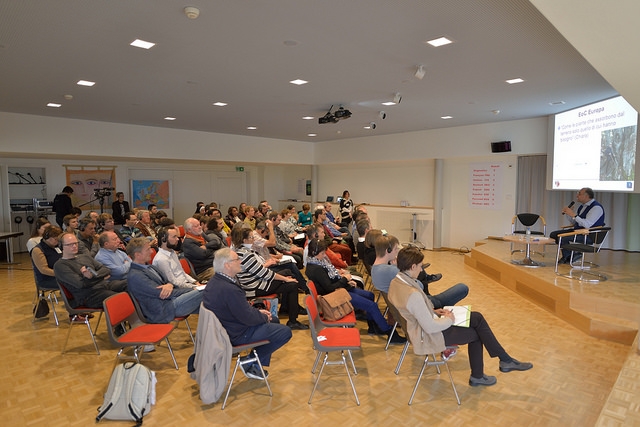
Nov 12, 2016 | Focolare Worldwide
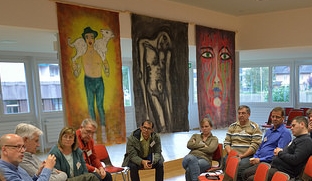
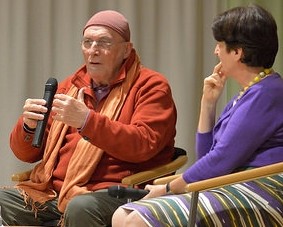 The intense three-day event of communion was attended by about 100 participants from 14 European countries (from Portugal to Russia), among which were pioneer entrepreneurs of the Economy of Communion (EoC), young business men and women, students and economists. The organisers recounted: “The convention opened with the exhibition of French painter, Michel Pochet, on ‘God who is Mercy’ – and his works of art acted as the framework of the entire meeting. The paintings of the ‘Good Shepherd’ and the ‘Good Samaritan’ particularly inspired the entrepreneurs to inculcate in their businesses and work places, the essence of what the paintings conveyed.” Right after the event a management student, Federico (Italy), gave his impression: “I came to find out more about the EoC. I was rather standoffish at the start, but in these days I understand what it means to take care of the others, also at work. It is a question of building bridges between people. I learned a lot from all of you. It is very impressive to see that the entrepreneurs of the EoC are altruists, and that you are the ones who take care of the needs of others. I hope to become one of you soon.”
The intense three-day event of communion was attended by about 100 participants from 14 European countries (from Portugal to Russia), among which were pioneer entrepreneurs of the Economy of Communion (EoC), young business men and women, students and economists. The organisers recounted: “The convention opened with the exhibition of French painter, Michel Pochet, on ‘God who is Mercy’ – and his works of art acted as the framework of the entire meeting. The paintings of the ‘Good Shepherd’ and the ‘Good Samaritan’ particularly inspired the entrepreneurs to inculcate in their businesses and work places, the essence of what the paintings conveyed.” Right after the event a management student, Federico (Italy), gave his impression: “I came to find out more about the EoC. I was rather standoffish at the start, but in these days I understand what it means to take care of the others, also at work. It is a question of building bridges between people. I learned a lot from all of you. It is very impressive to see that the entrepreneurs of the EoC are altruists, and that you are the ones who take care of the needs of others. I hope to become one of you soon.” 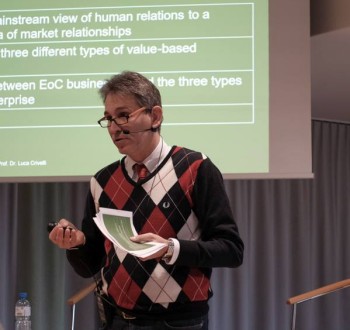 These were three days of intense communion, and among the speeches were those of Luca Crivella, a Swiss economist, who gave interesting cues on the EoC, 25 years after its constitution; and Anouk Grevin, Professor of the Nantes University and Sophia University Institute, who spoke about “giving and corporate gratuity, focusing on the ability to “see” through the eyes of mercy, the gift of the work of one’s own colleagues, ‘acknowledging’ and ‘thanking’ them for the free act which no one can buy. He further said that the eyes of mercy are able to place each person in the disposition to give the best of himself, because he feels the other’s trust and is thus able to express himself without fear of making mistakes.” Herbert Lauenroth, an expert in interculture at the Ecumenical Centre of Ottmaring (Augsburg), spoke about mercy applied to economic and political lives. It was the first EoC meeting for a businessman from England, who said: “One thing which you have and can donate to those who fight for a better world, but who may not see the light, is your joy. It is something incredible! A real spiritual capital!.”». And Peter, a youth from Serbia said: «I came, thinking that it would be a waste of time. But I found people who are open, and every dialogue was important for me. I shall take away with me the great benefits of this event.»
These were three days of intense communion, and among the speeches were those of Luca Crivella, a Swiss economist, who gave interesting cues on the EoC, 25 years after its constitution; and Anouk Grevin, Professor of the Nantes University and Sophia University Institute, who spoke about “giving and corporate gratuity, focusing on the ability to “see” through the eyes of mercy, the gift of the work of one’s own colleagues, ‘acknowledging’ and ‘thanking’ them for the free act which no one can buy. He further said that the eyes of mercy are able to place each person in the disposition to give the best of himself, because he feels the other’s trust and is thus able to express himself without fear of making mistakes.” Herbert Lauenroth, an expert in interculture at the Ecumenical Centre of Ottmaring (Augsburg), spoke about mercy applied to economic and political lives. It was the first EoC meeting for a businessman from England, who said: “One thing which you have and can donate to those who fight for a better world, but who may not see the light, is your joy. It is something incredible! A real spiritual capital!.”». And Peter, a youth from Serbia said: «I came, thinking that it would be a waste of time. But I found people who are open, and every dialogue was important for me. I shall take away with me the great benefits of this event.»  Prof. Luigino Bruni, world coordinator of the EoC project, recalled the times when Chiara Lubich in Trent with the first group of focolarine, would invite the poor to dine in their house, and would “use the best table cloth and cutlery they had”, and underlined that “our first way of treating poverty, even before giving our profits, is to bring it into our house and into our factories, and love it with ‘beautiful gestures’.” Another challenge targeted “in order to reach the 50th EoC anniversary in a proactive condition,” regards the businesses. “All can see that communion in our companies have to find new and more visible and radical expressions,” he affirmed ,”involving “governance” and above all, property rights. Up to now we have focused on the culture and motivations of the entrepreneurs, but it is ever more evident in an economy of great changes, that the businesses and entrepreneurs do not always coincide.” He also added: “Over the last years, one of the strengths of the EoC along with its resilience is that it has breathed with its entire body. There have not been single persons guiding it, but many active members. The EoC is strong when every worker in the company has the same energy.” In conclusion, Bruni said: “We have become aware that EoC in Europe is still alive after 25 years, and continues to bear fruit and develop in new settings and regions. An important fact is the presence of the first businesses in Russia, and the new business-incubator in Portugal: that Europe we all dream of, from the Atlantic to the Ural mountains. Moreover, it is a youthful and open EoC (many EoC leaders do not come from the Focolare Movement), with the great desire to work for the future.” Photos on Flickr: Photo gallery The next event is set for 2017 in Belgium.
Prof. Luigino Bruni, world coordinator of the EoC project, recalled the times when Chiara Lubich in Trent with the first group of focolarine, would invite the poor to dine in their house, and would “use the best table cloth and cutlery they had”, and underlined that “our first way of treating poverty, even before giving our profits, is to bring it into our house and into our factories, and love it with ‘beautiful gestures’.” Another challenge targeted “in order to reach the 50th EoC anniversary in a proactive condition,” regards the businesses. “All can see that communion in our companies have to find new and more visible and radical expressions,” he affirmed ,”involving “governance” and above all, property rights. Up to now we have focused on the culture and motivations of the entrepreneurs, but it is ever more evident in an economy of great changes, that the businesses and entrepreneurs do not always coincide.” He also added: “Over the last years, one of the strengths of the EoC along with its resilience is that it has breathed with its entire body. There have not been single persons guiding it, but many active members. The EoC is strong when every worker in the company has the same energy.” In conclusion, Bruni said: “We have become aware that EoC in Europe is still alive after 25 years, and continues to bear fruit and develop in new settings and regions. An important fact is the presence of the first businesses in Russia, and the new business-incubator in Portugal: that Europe we all dream of, from the Atlantic to the Ural mountains. Moreover, it is a youthful and open EoC (many EoC leaders do not come from the Focolare Movement), with the great desire to work for the future.” Photos on Flickr: Photo gallery The next event is set for 2017 in Belgium.
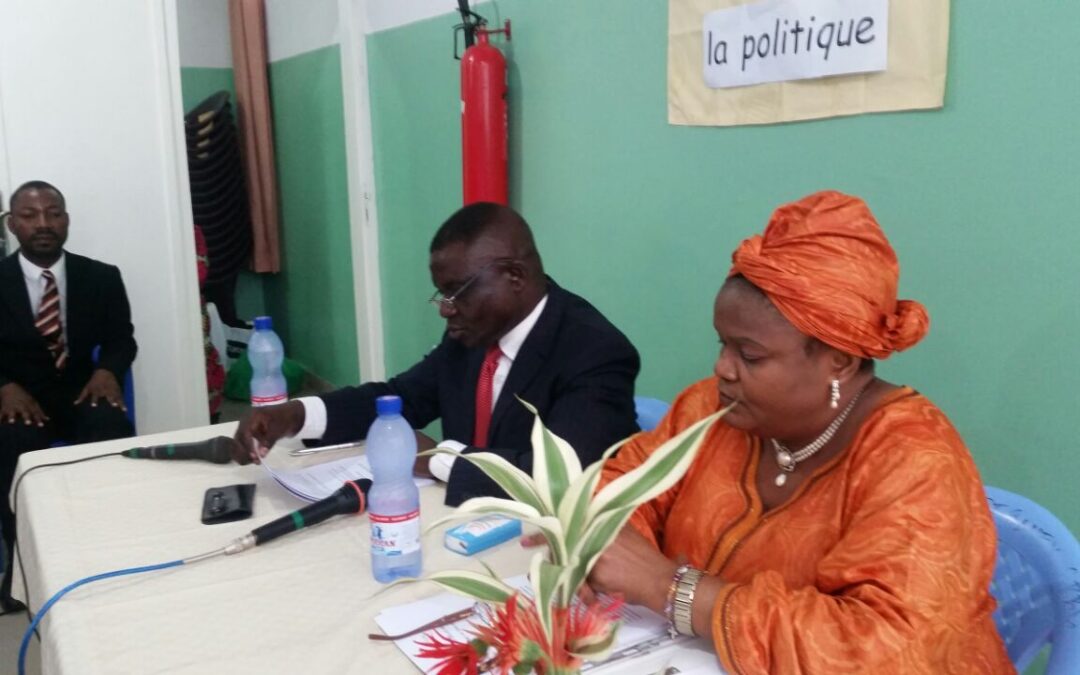
Nov 11, 2016 | Non categorizzato
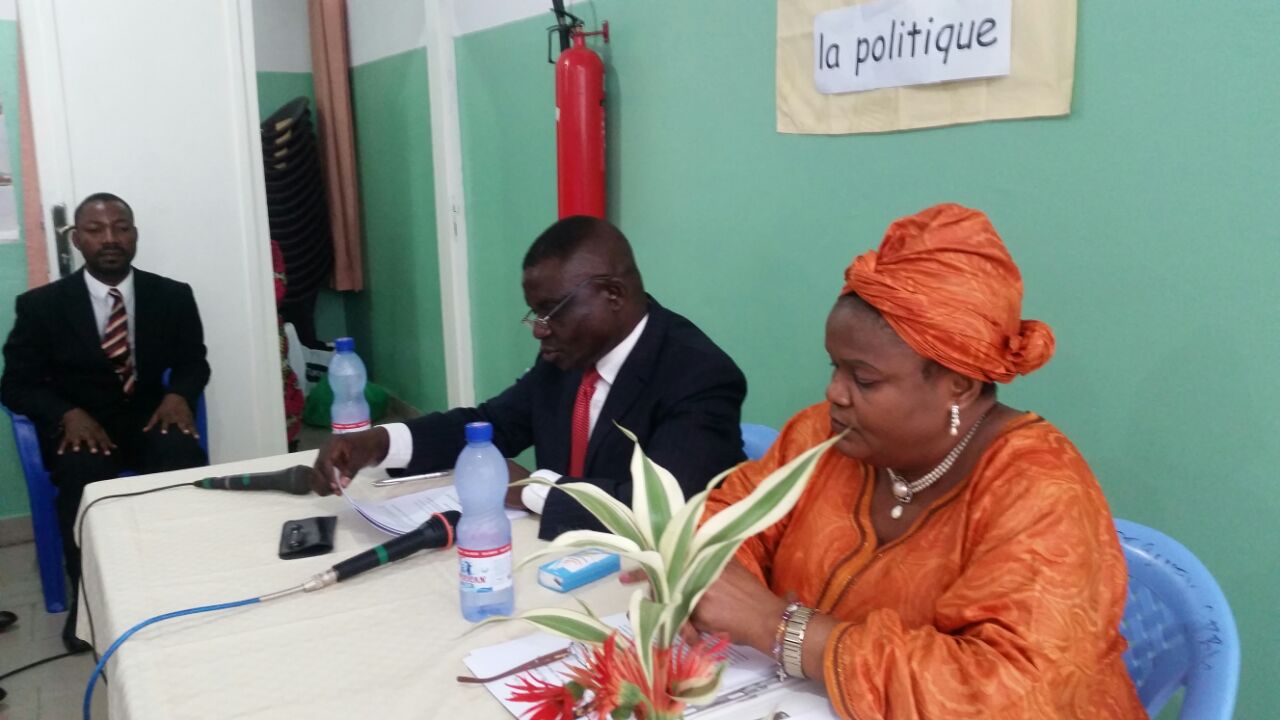 “The Political Movement for Unity has begun in Kinshasa!” With these words Deputy Upira Dieudonné concluded the first meeting of the Political Movement for Unity (PMU) in Kinshasa on Saturday, October 29, 2016. They write: “The current political situation in the RDC is fragile. There are strong political and social tensions. A few months ago, there were violent clashes in which some people died. The powers that be and the opposition sometimes become radicalized.” So how did we reach this day, one could ask. “It was after attending the conference in Rome last June with politicians from around the world. Deputy Dieudonné Upira, national deputy from the opposition in the DRC, and Madam Gorgine Madiko, Honorary Deputy and Member of the National Assembly Office decided to try something in their country.” When they returned from Rome, they deepened their friendship and shared their differing opinions with one another. Now, they dream of forming young people to be leaders in politics. As they said: it’s a matter of “training in the real politics, the politics that is based on values.” Their conversations have convinced them that the first step in such an undertaking in Kingshasa, would be to launch the Political Movement for Unity. “This would allow networking people who are working in the field of politics, to do good through politics,” they suggested. As they organized the event they were also wondering: “Will the people that have been invited have the courage to show up?” Their uncertainty grew as torrential rain began to pour down on Kinshasa on the day of the meeting. Because of the bad road conditions and the poor state of the public transport, most people stay home when it rains! Nevertheless, thirty people responded to their invitation. Among them were deputies and politicians, students, members of citizen movements, lawyers and journalists. The debate provided a platform for deep listening and discussion. “We heard things like: ‘We want to stay in touch with you and have more frequent discussions;’ ‘In front of the loss of values, we need to work at installing positive values in our education system, to train people that can be political leaders tomorrow;’ ‘I feel that if I don’t do something, God will ask me what I did with all that he gave to me;’ ‘We’re young and we expect to learn from our elders. Don’t forget about us’.” Their words reflected the thoughts of the organizers and made the moment of sharing into a sacred moment. During her concluding remarks, Madam Georgina Madiko insisted: “Through our actions we have to be a light in the dark world. We have to show by example. And to those who are surprised by us and ask whether we are doing politics or religion, we’ll answer that politics without values is the ruin of the Nation.” Before leaving one participant suggested: “We should forget about our titles, stay in touch with each other, even if it’s only to ask how we’re doing. I would like each one of us to go home with a list of the participants so that we can all stay in touch with one another.” The next appointment is December 3, 2016. Gustavo Clariá
“The Political Movement for Unity has begun in Kinshasa!” With these words Deputy Upira Dieudonné concluded the first meeting of the Political Movement for Unity (PMU) in Kinshasa on Saturday, October 29, 2016. They write: “The current political situation in the RDC is fragile. There are strong political and social tensions. A few months ago, there were violent clashes in which some people died. The powers that be and the opposition sometimes become radicalized.” So how did we reach this day, one could ask. “It was after attending the conference in Rome last June with politicians from around the world. Deputy Dieudonné Upira, national deputy from the opposition in the DRC, and Madam Gorgine Madiko, Honorary Deputy and Member of the National Assembly Office decided to try something in their country.” When they returned from Rome, they deepened their friendship and shared their differing opinions with one another. Now, they dream of forming young people to be leaders in politics. As they said: it’s a matter of “training in the real politics, the politics that is based on values.” Their conversations have convinced them that the first step in such an undertaking in Kingshasa, would be to launch the Political Movement for Unity. “This would allow networking people who are working in the field of politics, to do good through politics,” they suggested. As they organized the event they were also wondering: “Will the people that have been invited have the courage to show up?” Their uncertainty grew as torrential rain began to pour down on Kinshasa on the day of the meeting. Because of the bad road conditions and the poor state of the public transport, most people stay home when it rains! Nevertheless, thirty people responded to their invitation. Among them were deputies and politicians, students, members of citizen movements, lawyers and journalists. The debate provided a platform for deep listening and discussion. “We heard things like: ‘We want to stay in touch with you and have more frequent discussions;’ ‘In front of the loss of values, we need to work at installing positive values in our education system, to train people that can be political leaders tomorrow;’ ‘I feel that if I don’t do something, God will ask me what I did with all that he gave to me;’ ‘We’re young and we expect to learn from our elders. Don’t forget about us’.” Their words reflected the thoughts of the organizers and made the moment of sharing into a sacred moment. During her concluding remarks, Madam Georgina Madiko insisted: “Through our actions we have to be a light in the dark world. We have to show by example. And to those who are surprised by us and ask whether we are doing politics or religion, we’ll answer that politics without values is the ruin of the Nation.” Before leaving one participant suggested: “We should forget about our titles, stay in touch with each other, even if it’s only to ask how we’re doing. I would like each one of us to go home with a list of the participants so that we can all stay in touch with one another.” The next appointment is December 3, 2016. Gustavo Clariá

Nov 10, 2016 | Non categorizzato

LIVE STREAMING http://live.focolare.org/unesco 15 November 2016. Transmission times (CET, UTC+1): 10.00am – 1.00pm and 3.00 – 6.00pm OFFICIAL SPEECHES: “Reinventing peace” – Speech by Maria Voce “The unity of humankind and a culture of peace” – Speech by Jesús Morán Focolare Information Service: Press Release – October 26, 2016 Press Release – November 10, 2016 Program of the event: “Reinventing peace” – Programme “Reinventing peace” – Declaration Chiara Lubich, 17/12/1996 – Acceptance Speech by Chiara Lubich upon receiving UNESCO prize for Peace Education December 17, 1996 Video (Italian only)


 Fifty artists performed for free, confirming the strong sympathy is being felt for those who have suffered great loss. Artists included the OCCITANIA Chamber Music Ensemble, with music of Bach; the popular Italian song group, Incanto, which travels around the world with its musical titled ITALIANI, when we were the immigrants; The DALTIN Trio; Vicente and Rafael PRADAL from Spain; flemenco virtuoso guitarist Kiko Ruiz; the NACCARATO Jazz Trio; mandolin player Julien Martineau; the musical poems of the great Faber, performed by the Fabrizio DE ANDRÈ Band; the unforgettable music from the Italian films and the great finale and standing ovation for Cécile LIMAL who led La vita è bella… by Roberto Benigni. The music alternated with lively presentations by Rocco Femia, Director of RADICI magazine and by television journalists Marina Lorenzo and Patrick Noviello. In his thank-you speech, the director of RADICI did not want to forget anyone, conscious of the deep personal commitment of each person to the success of the event: from the technical crew to the artistic director, to the sound director, to the lights. Then there were the Deputy Mayor Francis Grass, the Italian Console to Toulouse, Fabrizio Mazza, the sponsors, benefactors, the media, and so on. Everyone “won the battle” together. And that is what I experienced as I shared a supper with the artists and technical staff after the concert. There is a strong bond among us, comprised of mutual trust, esteem, shared talent and solidarity – and a strong desire to make the world a more beautiful place. And I joyfully realized that this bond also included me and UWP. So, I wouldn’t be surprised if I discover that what I just experienced is only the beginning of a long and beneficial relationship of collaboration. In fact, when presenting the United World Project (UWP) during the concert, Rocco Femia highlighted the slogan of the RImPresa Project, to sum up what everyone seemed to be feeling: Hope vibrates; the future isn’t trembling.” Gustavo Clariá
Fifty artists performed for free, confirming the strong sympathy is being felt for those who have suffered great loss. Artists included the OCCITANIA Chamber Music Ensemble, with music of Bach; the popular Italian song group, Incanto, which travels around the world with its musical titled ITALIANI, when we were the immigrants; The DALTIN Trio; Vicente and Rafael PRADAL from Spain; flemenco virtuoso guitarist Kiko Ruiz; the NACCARATO Jazz Trio; mandolin player Julien Martineau; the musical poems of the great Faber, performed by the Fabrizio DE ANDRÈ Band; the unforgettable music from the Italian films and the great finale and standing ovation for Cécile LIMAL who led La vita è bella… by Roberto Benigni. The music alternated with lively presentations by Rocco Femia, Director of RADICI magazine and by television journalists Marina Lorenzo and Patrick Noviello. In his thank-you speech, the director of RADICI did not want to forget anyone, conscious of the deep personal commitment of each person to the success of the event: from the technical crew to the artistic director, to the sound director, to the lights. Then there were the Deputy Mayor Francis Grass, the Italian Console to Toulouse, Fabrizio Mazza, the sponsors, benefactors, the media, and so on. Everyone “won the battle” together. And that is what I experienced as I shared a supper with the artists and technical staff after the concert. There is a strong bond among us, comprised of mutual trust, esteem, shared talent and solidarity – and a strong desire to make the world a more beautiful place. And I joyfully realized that this bond also included me and UWP. So, I wouldn’t be surprised if I discover that what I just experienced is only the beginning of a long and beneficial relationship of collaboration. In fact, when presenting the United World Project (UWP) during the concert, Rocco Femia highlighted the slogan of the RImPresa Project, to sum up what everyone seemed to be feeling: Hope vibrates; the future isn’t trembling.” Gustavo Clariá












 Kelly, the second of Carmen and Mynor’s four children, is studying law to follow in her father’s footsteps. «There are only a few of us in the faculty – she affirmed – but we help each other. Only two of us are gen but we always try to have Jesus in our midst and with everyone». Kelly admires the coherent life of her parents: «When they invited people to the Mariapolis, they spoke about experiences I know, and which were all true. In our home, the Word of Life is the reference for every situation. And so, when there is a problem we read it in order to put it into practice.» Respect for the elderly is one of the riches of the Kaqchikel. In their presence, a gesture of reverence is shown before speaking. Motherhood and the gift of children are considered a benediction of God and are foremost in value compared to all considerations. «For me, the Movement – again Carmen says – is a grace of God that welcomes us, adults and children, and likewise the various cultures and languages. Here, they appreciate us, with our traditions and mentality.» In the culture of the Maya there is a strong bond with nature. «We invoke it, giving thanks to the heart of the heavens and the heart of the earth, and like St. Francis, we say: all are my brothers. Also
Kelly, the second of Carmen and Mynor’s four children, is studying law to follow in her father’s footsteps. «There are only a few of us in the faculty – she affirmed – but we help each other. Only two of us are gen but we always try to have Jesus in our midst and with everyone». Kelly admires the coherent life of her parents: «When they invited people to the Mariapolis, they spoke about experiences I know, and which were all true. In our home, the Word of Life is the reference for every situation. And so, when there is a problem we read it in order to put it into practice.» Respect for the elderly is one of the riches of the Kaqchikel. In their presence, a gesture of reverence is shown before speaking. Motherhood and the gift of children are considered a benediction of God and are foremost in value compared to all considerations. «For me, the Movement – again Carmen says – is a grace of God that welcomes us, adults and children, and likewise the various cultures and languages. Here, they appreciate us, with our traditions and mentality.» In the culture of the Maya there is a strong bond with nature. «We invoke it, giving thanks to the heart of the heavens and the heart of the earth, and like St. Francis, we say: all are my brothers. Also 
 “I was asked to present a report on the Christian witness in front of African tradition. It wasn’t easy for me, for two simple reasons: the first is that I am a Bangwa, the second is that I’m not only Christian, but also the bishop of Mamfe.” The speaker is Bishop Andrew Fuanya Nkea at a symposium on
“I was asked to present a report on the Christian witness in front of African tradition. It wasn’t easy for me, for two simple reasons: the first is that I am a Bangwa, the second is that I’m not only Christian, but also the bishop of Mamfe.” The speaker is Bishop Andrew Fuanya Nkea at a symposium on 



 From
From 





 “Through the Focolare Movement, God has visited the Bangwa people (…).They have lived the pact of mutual love with the Bangwa people and taught them
“Through the Focolare Movement, God has visited the Bangwa people (…).They have lived the pact of mutual love with the Bangwa people and taught them 





 I attended for the first time, a classical music concert in the midst of a battle. It happened in
I attended for the first time, a classical music concert in the midst of a battle. It happened in 















 “Let us accompany Aletta with joy and immense gratitude to the house of the Father. We couldn’t have a better model of one who “gave her life unsparingly” to God, as today’s daily thought suggests.” This is how
“Let us accompany Aletta with joy and immense gratitude to the house of the Father. We couldn’t have a better model of one who “gave her life unsparingly” to God, as today’s daily thought suggests.” This is how 





 «In a world where globalisation dictates its laws, one of the most important paradoxes we are encountering is that the voice of the southern end of the world is being ignored. Though rich in natural resources like diamonds, gold, oil and other precious minerals, Africa faces: growing poverty and underdevelopment, the worst life expectancy, and a high level of illiteracy, despite the millions of dollars in western aid deposited along the years in various projects. Why? The dramatic response is not only the war we have to suffer, or diseases, but especially corruption which in Africa has become a normal and accepted fact, tearing the continent apart. It is a continent in which the poor have to be corrupt in order to survive, get treated in hospitals, enter one of the “best” professional schools, obtain jobs and get out of jail. Not even the laws are able to eradicate this evil. In most African countries, the law is of western origin, with some nuances taken from local cultures. Protection of the individual alone, for as much as is universally accepted, goes against the principle of the community, most dear to African traditions and that underline the importance of solidarity. The individual is such only if he belongs to a community and acts in function of the community. It is the principle of the “Ubuntu”: I exist because we exist. In the African culture, the
«In a world where globalisation dictates its laws, one of the most important paradoxes we are encountering is that the voice of the southern end of the world is being ignored. Though rich in natural resources like diamonds, gold, oil and other precious minerals, Africa faces: growing poverty and underdevelopment, the worst life expectancy, and a high level of illiteracy, despite the millions of dollars in western aid deposited along the years in various projects. Why? The dramatic response is not only the war we have to suffer, or diseases, but especially corruption which in Africa has become a normal and accepted fact, tearing the continent apart. It is a continent in which the poor have to be corrupt in order to survive, get treated in hospitals, enter one of the “best” professional schools, obtain jobs and get out of jail. Not even the laws are able to eradicate this evil. In most African countries, the law is of western origin, with some nuances taken from local cultures. Protection of the individual alone, for as much as is universally accepted, goes against the principle of the community, most dear to African traditions and that underline the importance of solidarity. The individual is such only if he belongs to a community and acts in function of the community. It is the principle of the “Ubuntu”: I exist because we exist. In the African culture, the 








 “A Church of the poor means two things mainly: the Church should be poor as Christ was poor, if it wants to proclaim the kingdom of God, if it wants its message to be effective. And all Christians who share in the life of the Church should be poor in spirit. Then the message of salvation would be more easily accepted by the poor; whereas, for the rich it will be difficult to enter the kingdom of Heaven than for a camel to go through the eye of a needle…. This Church of and for the poor should not make us imagine any similar socio-political version of it for the world. (…) When Jesus speaks of the poor, he means those who are being tested, who are humble, who are deprived of reassurance and beyond any real support that they can depend on – yet, they turn to God their just benefactor. The Greek translators of the Bible understood that the poverty of these poor was not merely material deprivation; in fact, they did not translate the Hebrew word anaw (poor), as ‘pauper’ or ‘destitute’ but preferred to use the word praus, which evokes meekness and resignation in the midst of hardship and trial.
“A Church of the poor means two things mainly: the Church should be poor as Christ was poor, if it wants to proclaim the kingdom of God, if it wants its message to be effective. And all Christians who share in the life of the Church should be poor in spirit. Then the message of salvation would be more easily accepted by the poor; whereas, for the rich it will be difficult to enter the kingdom of Heaven than for a camel to go through the eye of a needle…. This Church of and for the poor should not make us imagine any similar socio-political version of it for the world. (…) When Jesus speaks of the poor, he means those who are being tested, who are humble, who are deprived of reassurance and beyond any real support that they can depend on – yet, they turn to God their just benefactor. The Greek translators of the Bible understood that the poverty of these poor was not merely material deprivation; in fact, they did not translate the Hebrew word anaw (poor), as ‘pauper’ or ‘destitute’ but preferred to use the word praus, which evokes meekness and resignation in the midst of hardship and trial. 

 The intense three-day event of communion was attended by about 100 participants from 14 European countries (from
The intense three-day event of communion was attended by about 100 participants from 14 European countries (from  These were three days of intense communion, and among the speeches were those of Luca Crivella, a Swiss economist, who gave interesting cues on the EoC, 25 years after its constitution; and Anouk Grevin, Professor of the Nantes University and Sophia University Institute, who spoke about “giving and corporate gratuity, focusing on the ability to “see” through the eyes of mercy, the gift of the work of one’s own colleagues, ‘acknowledging’ and ‘thanking’ them for the free act which no one can buy. He further said that the eyes of mercy are able to place each person in the disposition to give the best of himself, because he feels the other’s trust and is thus able to express himself without fear of making mistakes.” Herbert Lauenroth, an expert in interculture at the Ecumenical Centre of Ottmaring (Augsburg), spoke about mercy applied to economic and political lives. It was the first EoC meeting for a businessman from England, who said: “One thing which you have and can donate to those who fight for a better world, but who may not see the light, is your joy. It is something incredible! A real spiritual capital!.”». And Peter, a youth from Serbia said: «I came, thinking that it would be a waste of time. But I found people who are open, and every dialogue was important for me. I shall take away with me the great benefits of this event.»
These were three days of intense communion, and among the speeches were those of Luca Crivella, a Swiss economist, who gave interesting cues on the EoC, 25 years after its constitution; and Anouk Grevin, Professor of the Nantes University and Sophia University Institute, who spoke about “giving and corporate gratuity, focusing on the ability to “see” through the eyes of mercy, the gift of the work of one’s own colleagues, ‘acknowledging’ and ‘thanking’ them for the free act which no one can buy. He further said that the eyes of mercy are able to place each person in the disposition to give the best of himself, because he feels the other’s trust and is thus able to express himself without fear of making mistakes.” Herbert Lauenroth, an expert in interculture at the Ecumenical Centre of Ottmaring (Augsburg), spoke about mercy applied to economic and political lives. It was the first EoC meeting for a businessman from England, who said: “One thing which you have and can donate to those who fight for a better world, but who may not see the light, is your joy. It is something incredible! A real spiritual capital!.”». And Peter, a youth from Serbia said: «I came, thinking that it would be a waste of time. But I found people who are open, and every dialogue was important for me. I shall take away with me the great benefits of this event.» 

